Crown Bakeries


DOUBLING DOWN IN LAMINATED AND SWEET BAKED GOODS
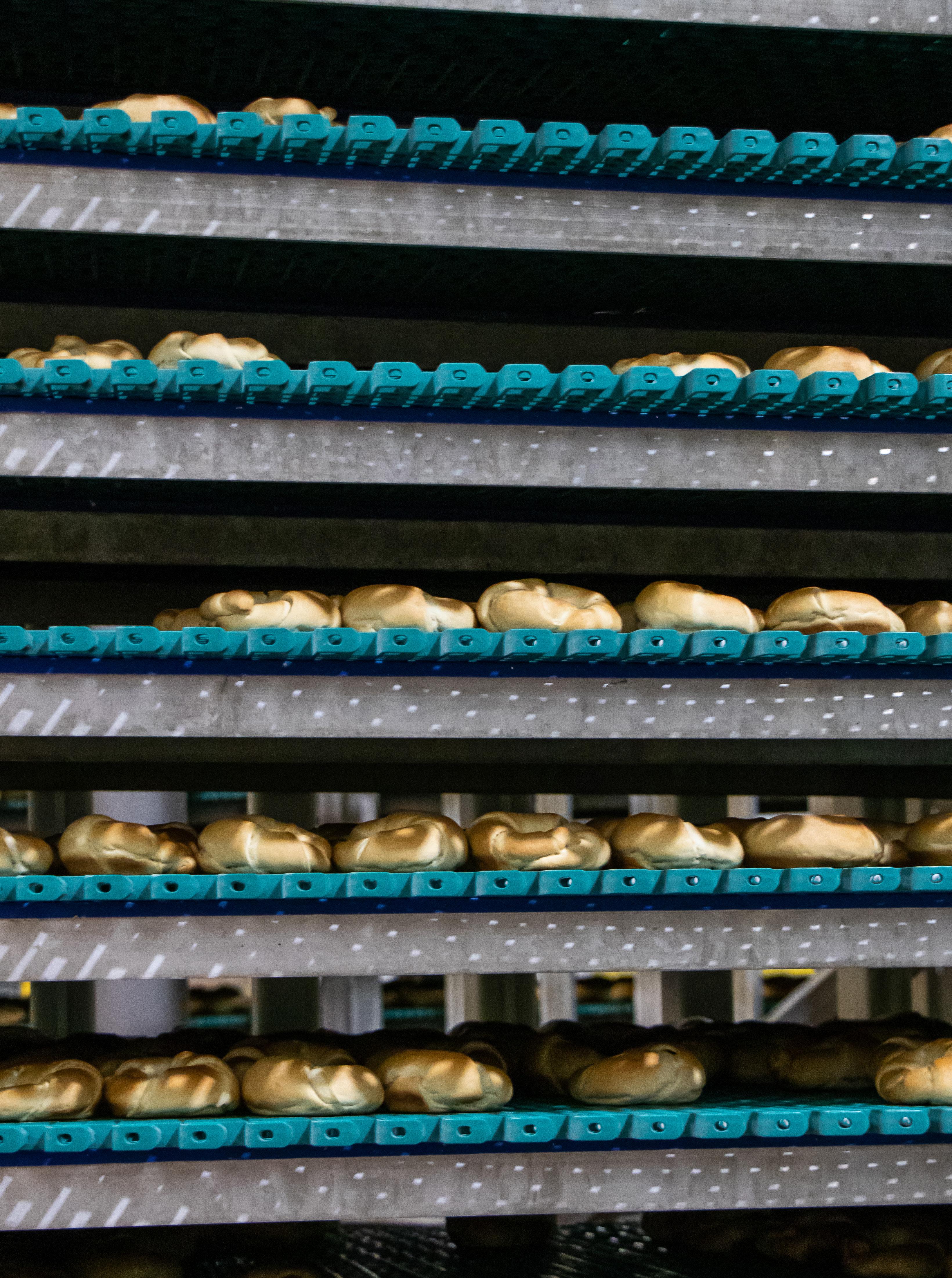
www.commercialbaking.com DIGITAL EDITION
ISSUE Q1 | ABA’S ERIC DELL | C-SUITE MENTAL HEALTH| HURDLE TECHNOLOGY FEB 2023












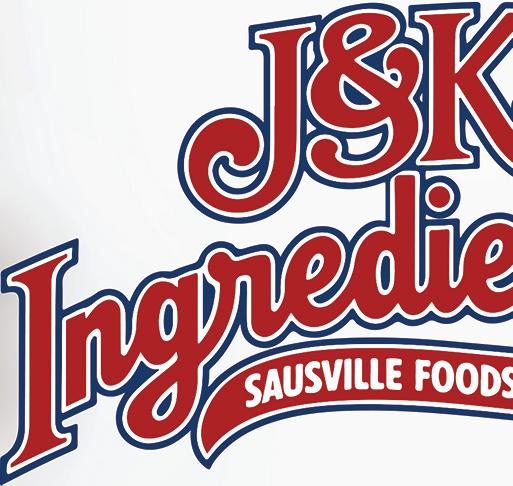

Find out more at www.jkingredients.com or call us at 973-340-8700 Our Clean Label line of SOR-Mate products will keep your cakes, muffins, and other baked goods mold-free without the need for artificial preservatives all while enhancing the flavor! CL NG Clean Label Non GMO Kosher Pareve KP We make Clean Labels a piece of cake! Effective alternative to chemical preservatives! Introducing SOR-Mate
Many players, one team. www.syntegon.com
Many players working hard to ensure the productivity, safety, and sustainability of our machines are always at their best. One team dedicated to providing exemplary service — every time.
Expertise

Confidence in a product starts with trusting the people behind it. And no one has more experience than the engineers and operations team behind Shaffer.


Innovation


For more than 30 years, Shaffer has revolutionized horizontal mixers - from the first open-frame mixer in 1993, to today’s cutting edge sanitary designs and dough cooling technology.

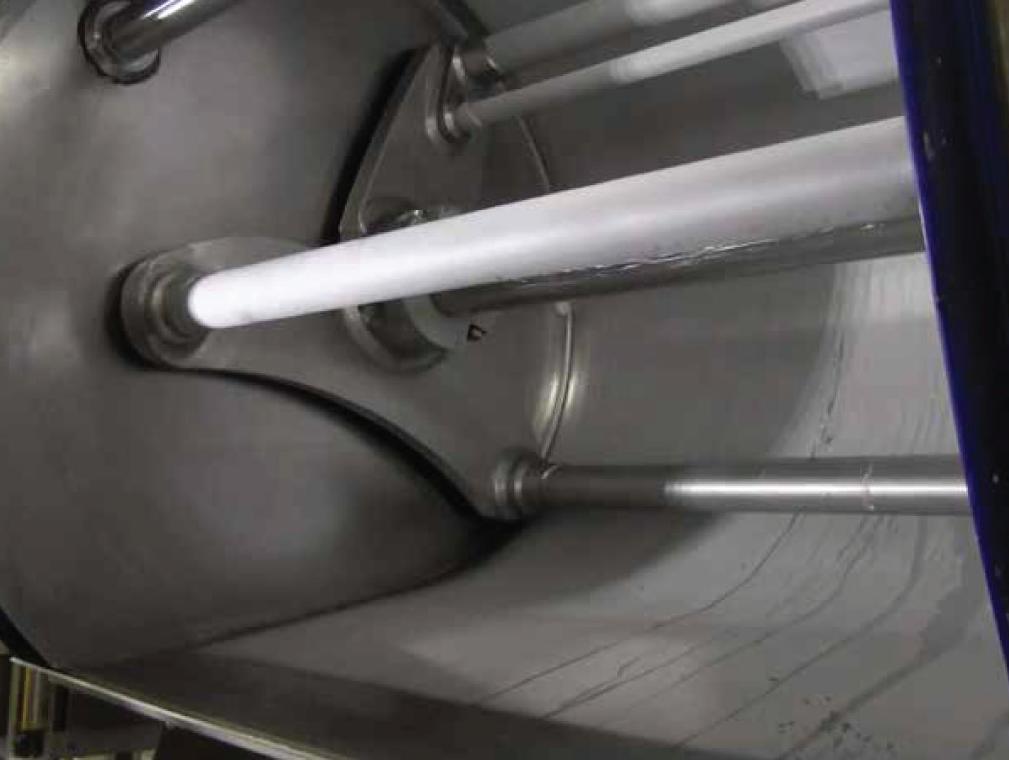







937.652.4480 | info@shaffermixers.com | shaffermixers.com FOLLOW US 24/7 PARTS & SERVICE +1 888.508.1298 service@shaffermixers.com YOUR BAKERY. YOUR MIXER. Quality mixers, processing equipment and service. Global innovation and resources.
AIM TECHNOLOGY FOR PIZZA

Automation for pizza handling that no one else can deliver.
Active Integrated Motion™ (AIM™) technology transforms frozen pizza handling by enabling automation in washdown environments.
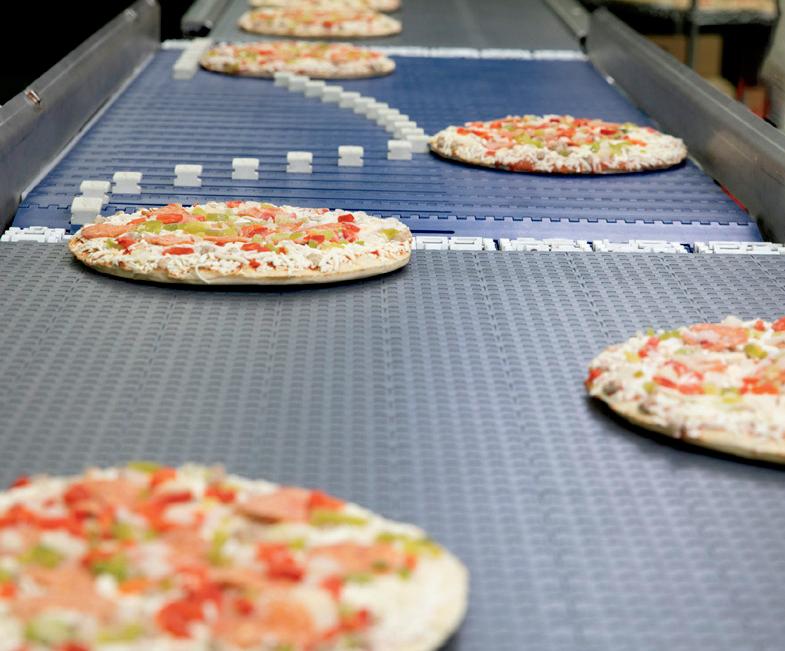
Intralox® AIM solutions include sorting, switching, and merging equipment that deliver maximized, reliable throughput and gentle product handling to your pizza packaging lines.

© 2022 Intralox, L.L.C. 5011057_EN
Scan QR code to learn more.
AVANT FOOD MEDIA
Paul Lattan President - Principal Steve Berne Vice President - Principal
Joanie Spencer Director of Content - Partner
COMMERCIAL BAKING
Paul Lattan Publisher | 816.585.5030 | paul@avantfoodmedia.com
Steve Berne Director of Media | 816.605.5037 | steve@avantfoodmedia.com

Joanie Spencer Editor-in-Chief | 913.777.8874 | joanie@avantfoodmedia.com
Mari Rydings Editorial Director mari@avantfoodmedia.com
Jordan Winter Creative Director jordan@avantfoodmedia.com
Olivia Siddall Multimedia Specialist olivia@avantfoodmedia.com
Annie Hollon Managing Editor annie@avantfoodmedia.com
Evan Bail Associate Editor evan@avantfoodmedia.com
Maggie Glisan | Bella Foote Contributors info@commercialbaking.com
OUR
American Society of Baking



Commercial Baking is published by Avant Food Media, 1703 Wyandotte St., Suite 300, Kansas City, MO 64108. Commercial Baking considers its sources reliable and verifies as much data as possible, although reporting inaccuracies can occur. Consequently, readers using this information do so at their own risk. Commercial Baking is distributed with the understanding that the publisher is not liable for errors and omissions. Although persons and companies mentioned herein are believed to be reputable, neither Avant Food Media nor any of its employees accept any responsibility whatsoever for their activities. Commercial Baking magazine is printed in the USA and all rights are reserved.
No part of this magazine may be reproduced or transmitted in any form or by any means without written permission of the publisher. All contributed content and advertiser supplied information will be treated as unconditionally assigned for publication, copyright purposes and use in any publication or digital product and are subject to Commercial Baking ’s right to edit.
Commercial Baking , ISSN 2767-5319 / USPS Publication Number: 25350, is published quarterly in February, April, August, and October, with special issues in June and December, in print and digital formats by Avant Food Media, 1703 Wyandotte St., Suite 300, Kansas City, MO 64108. POSTMASTER: Send address changes to Commercial Baking, c/o Avant Food Media, 1703 Wyandotte St., Suite 300, Kansas City, MO 64108.
Circulation is tightly controlled, with print issues sent only to hand-verified industry decision makers and influencers. To apply for a free subscription, please visit www.commercialbaking.com/subscription

6
COMMUNITY
FIND US ON FEBRUARY 2023 Q1
MEDIA Magazines Website Newsletters Podcasts Webinars Videos | digital edition
OUR
NATURALLY GOOD. RIGHT FROM THE START.
OUR DIFFERENCE MAKES ALL THE DIFFERENCE
Farmer Direct Foods produces premium, whole-grain flours that are regeneratively-farmed, milled and sold with intention and integrity Our flours are exactly what we say they are traced straight back to our farmers’ ancestral wheat fields and minimally processed to assure we preserve the natural nutrition, deep flavor, and complete character of the grain
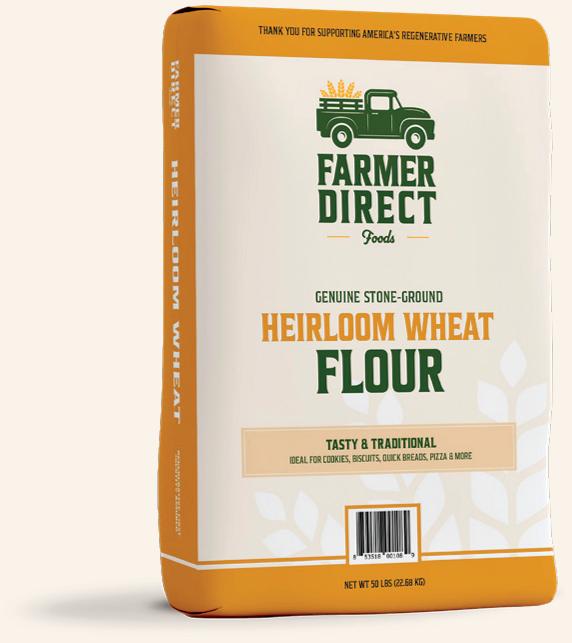

It’s time for a wheat renaissance. Farmer Direct Foods is leading a return to wholesome ingredients that are better for consumers, farmers and the earth.
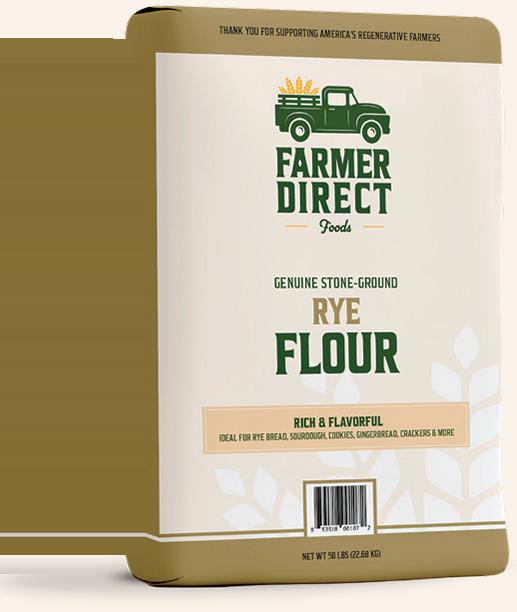
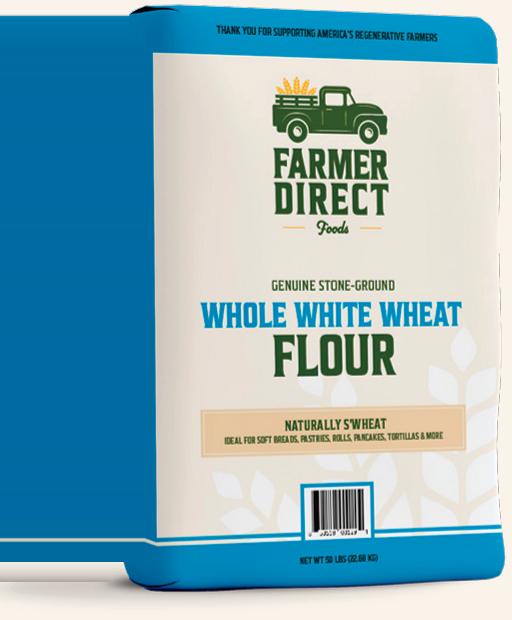

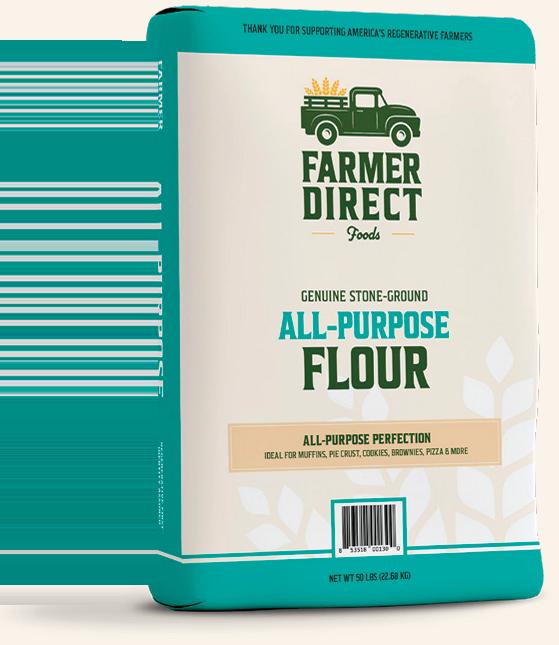


KOSHER
NO PRESERVATIVES
NON-GMO VERIFIED
REGENERATIVELY FARMED


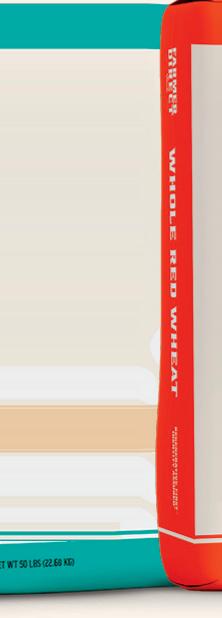






STONE-GROUND WHOLE WHEAT
SUPPORTS AMERICAN FARMERS

us to request a sample today! FARMERDIRECTFOODS.COM 5641 EAST MARIPOSA ROAD, NEW CAMBRIA, KS 67470 | 785-823-8787
Contact


From the flower, to the bee hive, to you. A natural source of a wide array of nutrients, including trace amounts of 7 vitamins, 11 minerals, 5 antioxidants and 17 amino acids. A familiar flavor that everyone loves. Consumers are looking for an all-natural sweetener they can trust. Give them honey.
Contact keith@honey.com to learn how to formulate with honey.
HONEY IS A NaturalWonder
PLUS: Look for QR codes that contain exclusive digital content throughout the issue.

18
Crown Bakeries: Jewel in the Crown Crown Bakeries’ Smyrna, GA, facility boosts production, culture and R&D for its whole network.

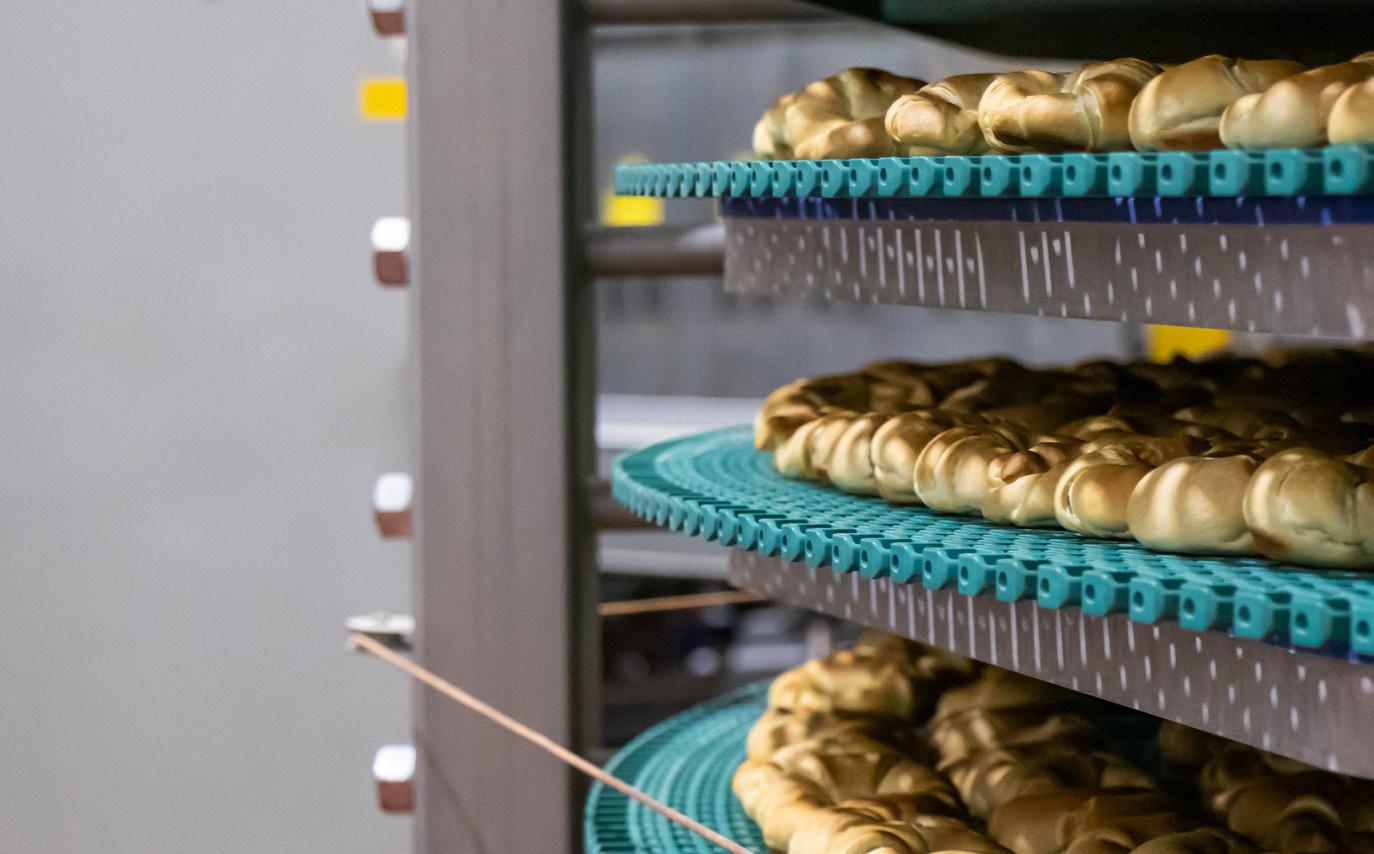
36 Eric Dell: Driving Forward

42 Critical Issues: Mental Health
51 Product Development: Hurdle Technology

COMMERCIAL BAKING 9
IN THIS ISSUE
Features
Cover: Crown Bakeries’ renovation of the Smyrna, GA, facility expanded its portfolio into laminated and sweet goods. Read more on page 18.
Photo by Olivia Siddall | Avant Food Media
Customized solutions from the beginning. Committed partnership that never ends.


Our experience helps you select the perfect equipment to meet your specific needs.

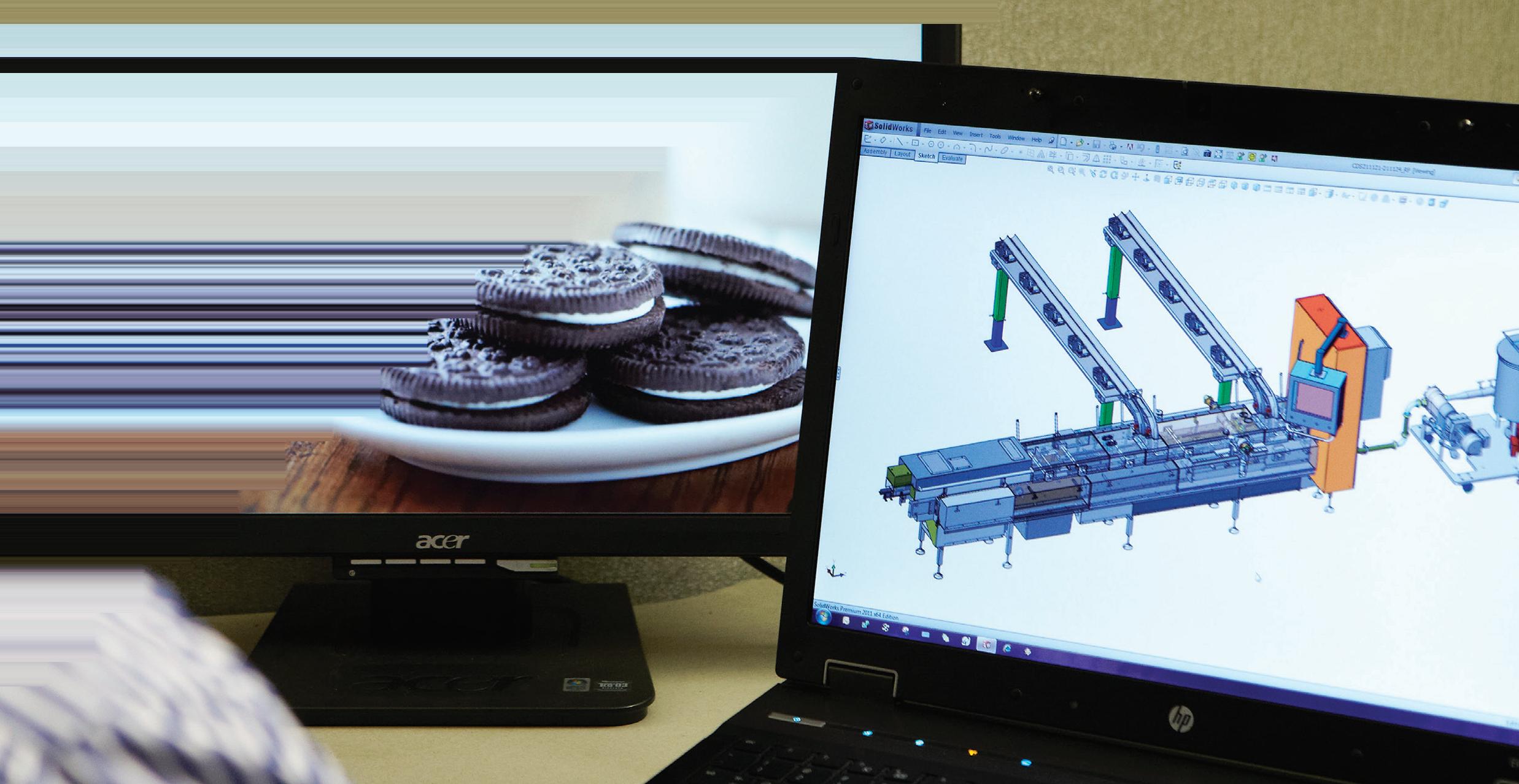
Our skill createsa creates a custom stom solution,builttodelive solution, built to deliver unbeatable bea performanceand performance and longevity. gevit


Our service delivers accessible, responsive support ble, respons anytime you need it. ytime youneed



Peerless: World-class food equipment and service. Driving innovation, sanitation, quality and longevity.







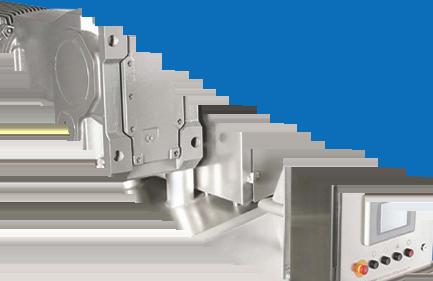









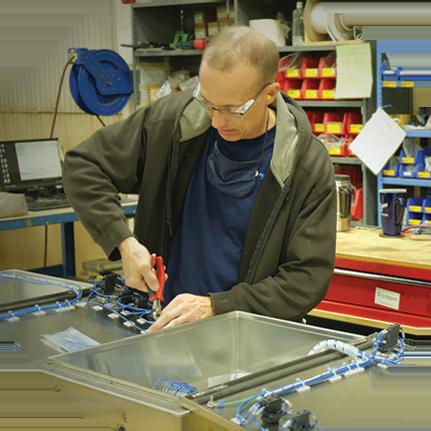
Our customized solutions drive your innovative food creations.
Peerless Food Equipment

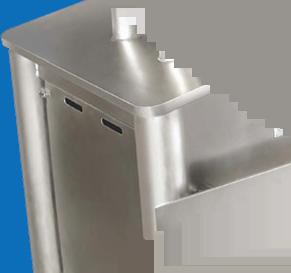
500 S. Vandemark Road, Sidney, OH 45365-0769 USA
(937) 492-4158, (877) 795-7377 | peerlessfood.com

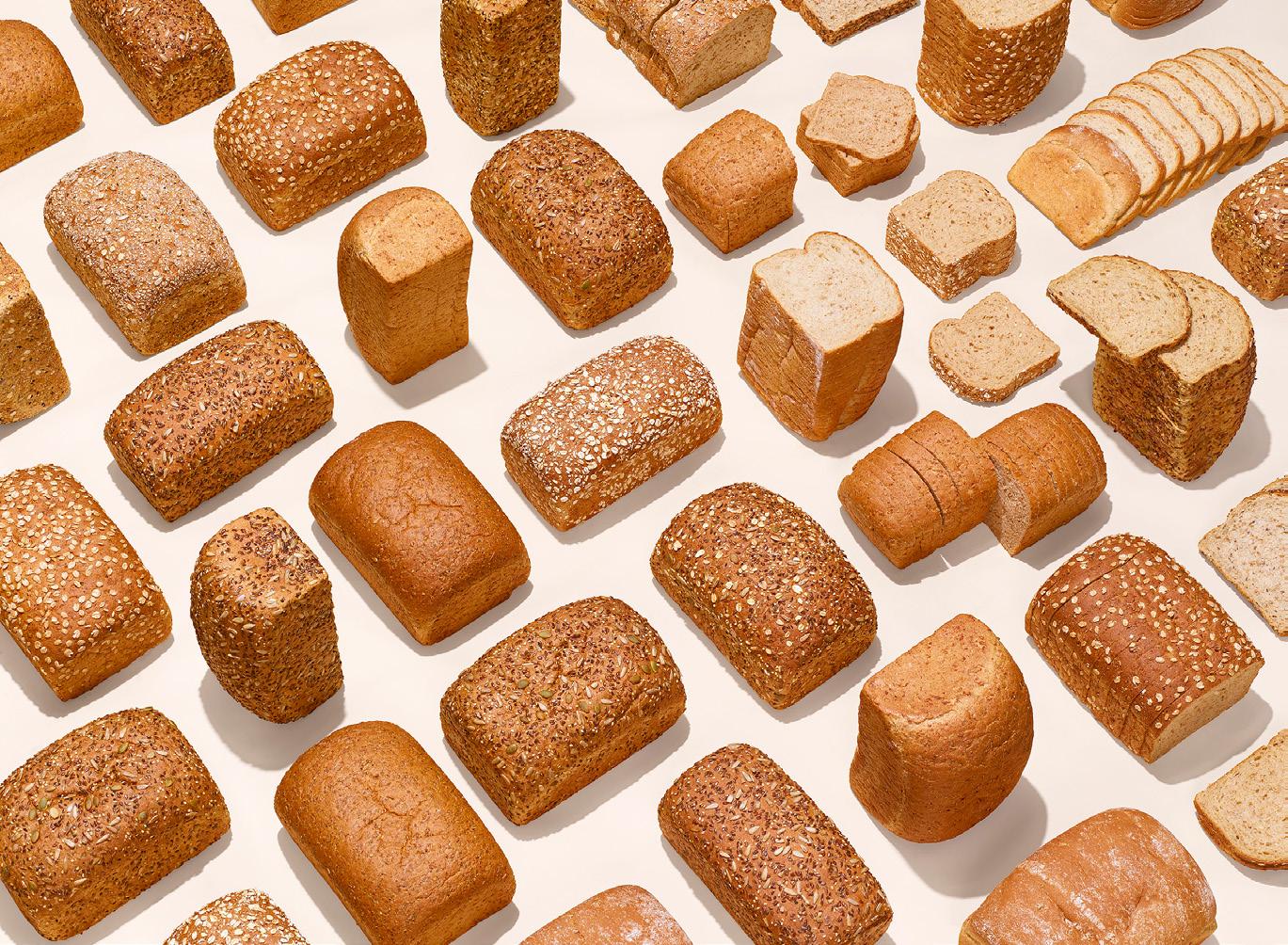

COMMERCIAL BAKING 11 90 106 TRENDS Category Outlook: 59 Bread | Bun | Roll Category Outlook: 67 Bars International Market 90 INNOVATIONS Category Insight: 75 Bread | Bun | Roll Category Insight: 83 Bars Commercial Baking Channel 103 Supplier Solutions 106 Ad Index 112 QUICK READS Editor’s Note 12 Seen and Heard 15 Business Intel 97 The Last Word 114 75 Departments IN THIS ISSUE
Don’t Pour from an Empty Cup
It’s February, but my New Year’s resolution is still a work in progress.
I’ve made some strides by eating better and keeping my cookie intake at a reasonable level, and I’ve signed up for my first half-marathon since before the pandemic. But the “get more sleep” part needs a little work. Let me put it this way: If this were the ’80s, the National Anthem would be fading to snow on my TV as I write this.
Some people think, “Self-care is for softies.” But consider this advice a friend once gave me: You can’t pour from an empty cup.
Yes, there’s work to be done and companies to run. The best leaders put their teams first, but if we don’t take care of ourselves, we’ll eventually have nothing left to give.
It’s been a rough couple of years, and while we’re all ready for a reset, we’re not out of the woods just yet. We’ve got to be all-in on finding innovative solutions to the ongoing challenges and prepare for the new ones coming our way. Doing that requires a full cup. Innovation comes from critical thinking, and that demands clarity.
JOANIE SPENCER Editor-in-Chief | joanie@avantfoodmedia.com


Resolutions don’t usually make it past January, but I hope you will consider joining me in a commitment to take better care of ourselves so we can give the best of what we have to offer to our companies, our teams and the industry in 2023.

FEBRUARY 2023 Q1 12
A NOTE FROM THE EDITOR
Proven to Lower Energy Costs
ePAN® designs from American Pan have been proven to save bakeries money on every bake. In fact, one customer reduced gas usage by almost 8% year over year by switching to an ePAN.
amount of dedicated space. ePANs can fit on your line and save you money from the







Energy solutions like wind turbines and solar panels are a major investment and require a large amount of dedicated space. ePANs can fit on your existing bakery line and save you money from the very first bake. Here’s how:


DECREASED OVEN TEMPERATURE

Oven temperatures have decreased by up to 85°F when using ePANs.
REDUCED BAKING TIME
Bakingtimeshavebeenreducedbyupto45seconds. Baking times have been reduced by up to 45 seconds.
REDUCED WEIGHT OF BAKING TRAYS & TINS
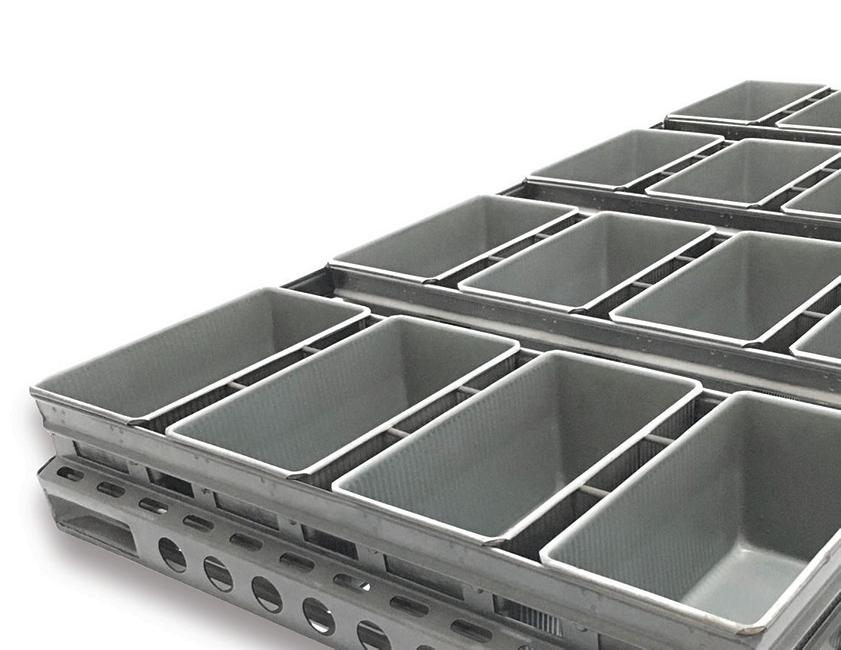

Traysandtinsareupto30%-50%lighter,requiringles Trays and tins are up to 30%-50% lighter, requiring less energyfrombakerysystemsandemployeesforhandl energy from bakery systems and employees for handling



+1.937.652.2151 | info@americanpan.com americanpan.com Visit us in Hall B1 - Stand 110!



MYIIIJ:fjl MY ••• "'--... ••••••• ••••••• SOLUTION. handtmann Ideas for the future. www.handtmann.us I www.handtmann.ca
Seen Heard AND
Bacon | owner | Freedom Foods, LLC
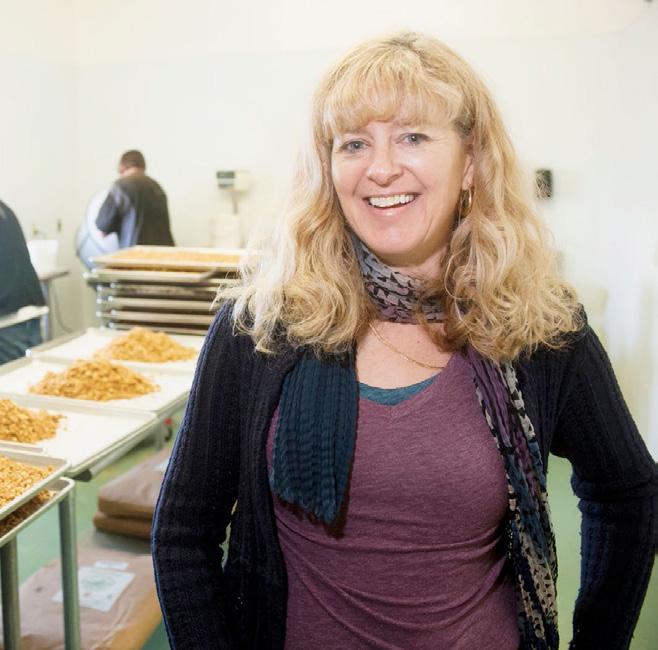


During a Pack EXPO’s 2022 Emerging Brands Summit, discussing how brands can best approach potential co-manufacturers
Photo by Tim Calabro | The White River Valley Herald
On the value of authenticity during the Authors@Wharton speaker series, as recorded on the ReThinking podcast with Adam Grant
COMMERCIAL BAKING 15
“I would prefer not to be sold on your business. I would prefer [brands] to share honesty, integrity and respect, and understand what you’re looking for.”
Cathy
“If you’ve got to tell somebody you’re in charge, you’re not in charge. When you’re preoccupied with that, you’re not free to meet people where they are. That’s what being authentic is all about.”
Carla Harris | senior client advisor, Morgan Stanley | former chair, National Women’s Business Council
“The sales and R&D parts of our company are one and the same. We’ve brought our R&D into preliminary sale conversations, and I think it’s brought this very fresh approach to the sales process that ultimately gets customers closer to what they actually want in a more responsive and effective manner.”
Jonathan Potts | regional sales manager | Companion Baking
WHEN PROOFING FLOOR SPACE IS TIGHT...
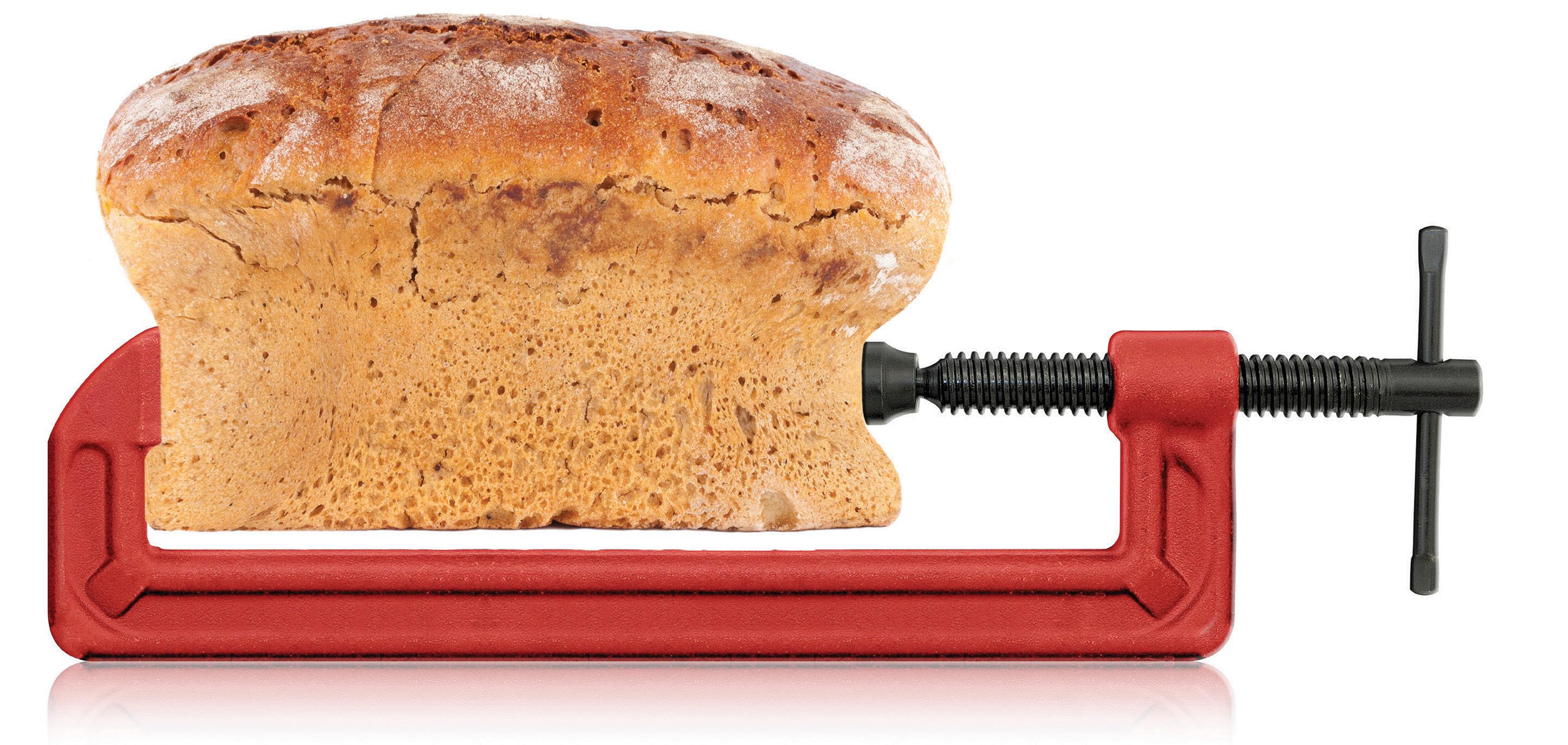

SEEN AND HEARD
“I know a lot of emerging brands are into digital, but in retail, brick-and-mortar is still a huge market. And once you get in there, there’s a lot of upside.”
Robert Berg | founding member | Iridescent Data
During an Emerge CPG webinar on targeting the right brick-and-mortar customer base
LOOK UP.
If you’re looking for a high capacity proofer that takes maximum advantage of minimum floor space, look no further. Our CapStep Proofer’s only limit … is your ceiling.
When your pans or peel boards enter the CapStep Proofer, they will be raised upward. When the pans reach the top of our system, they are gently moved over to the downward section by a transfer conveyor and lowered one level. This process continues – one Step at a time – until your product is ready to leave the proofer.
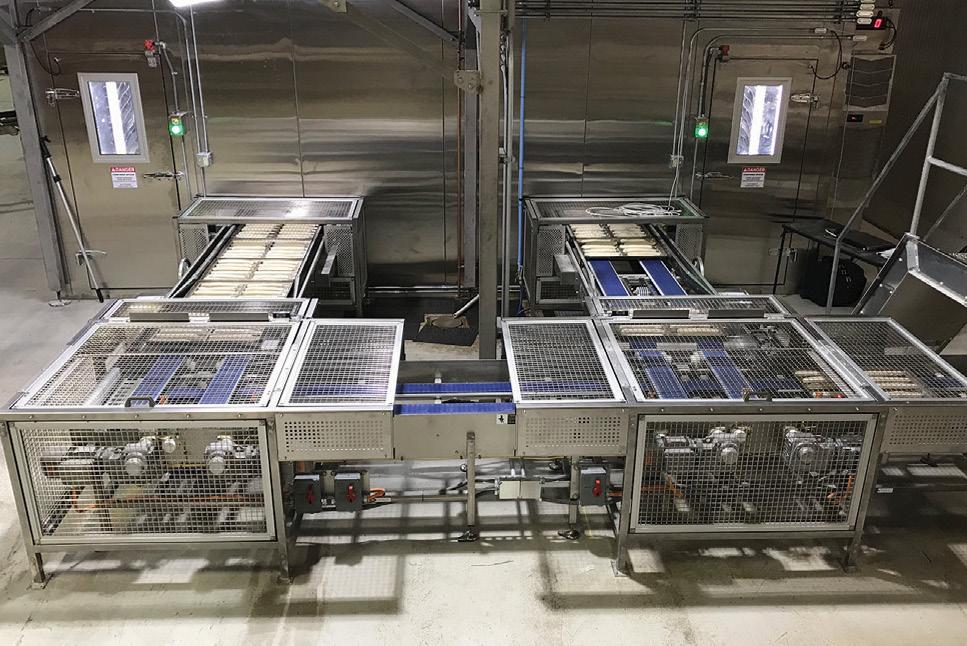

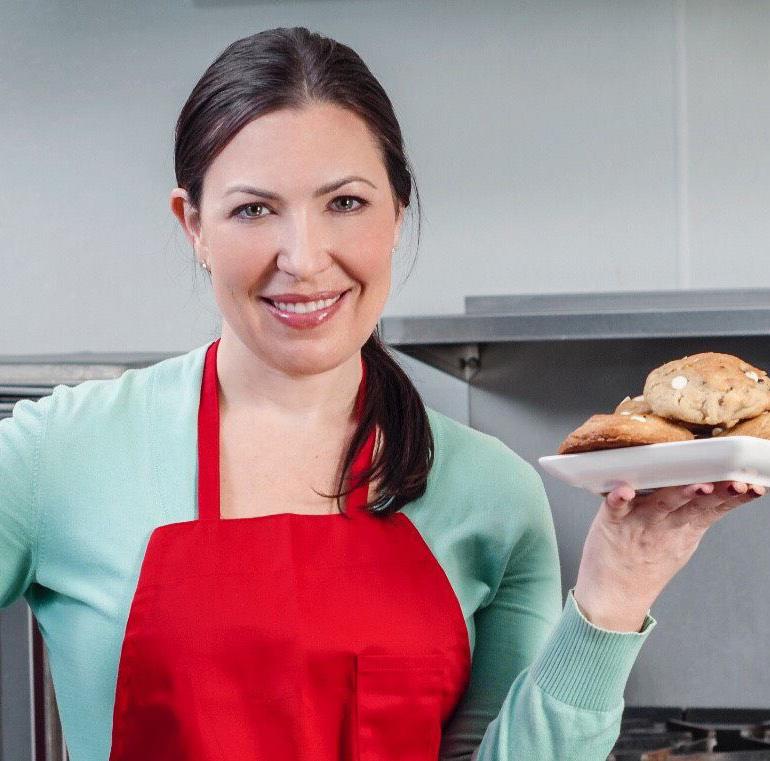
CapStep’s PLC controlled temperature and humidity HVAC and mechanical movement system is built for heavy-duty long life.
CapStep PROOFER

“In this whole startup world, you have to have patience every day because things do not go according to plan. And that’s been a big area of growth for me.”
Rebecca Abel | owner | D’Vine Cookies During season five of Troubleshooting Innovation podcast
capwayautomation.com
Call us today at 1.877.222.7929. We’ll help you take the next Step in automated bakery proofing systems.
JEWEL IN THE
CROWN
Crown Bakeries’
Smyrna, GA, facility boosts production, culture and R&D for its whole network.
 BY JOANIE SPENCER
BY JOANIE SPENCER
18
FEBRUARY 2023 Q1
FEATURED BAKERY: CROWN BAKERIES
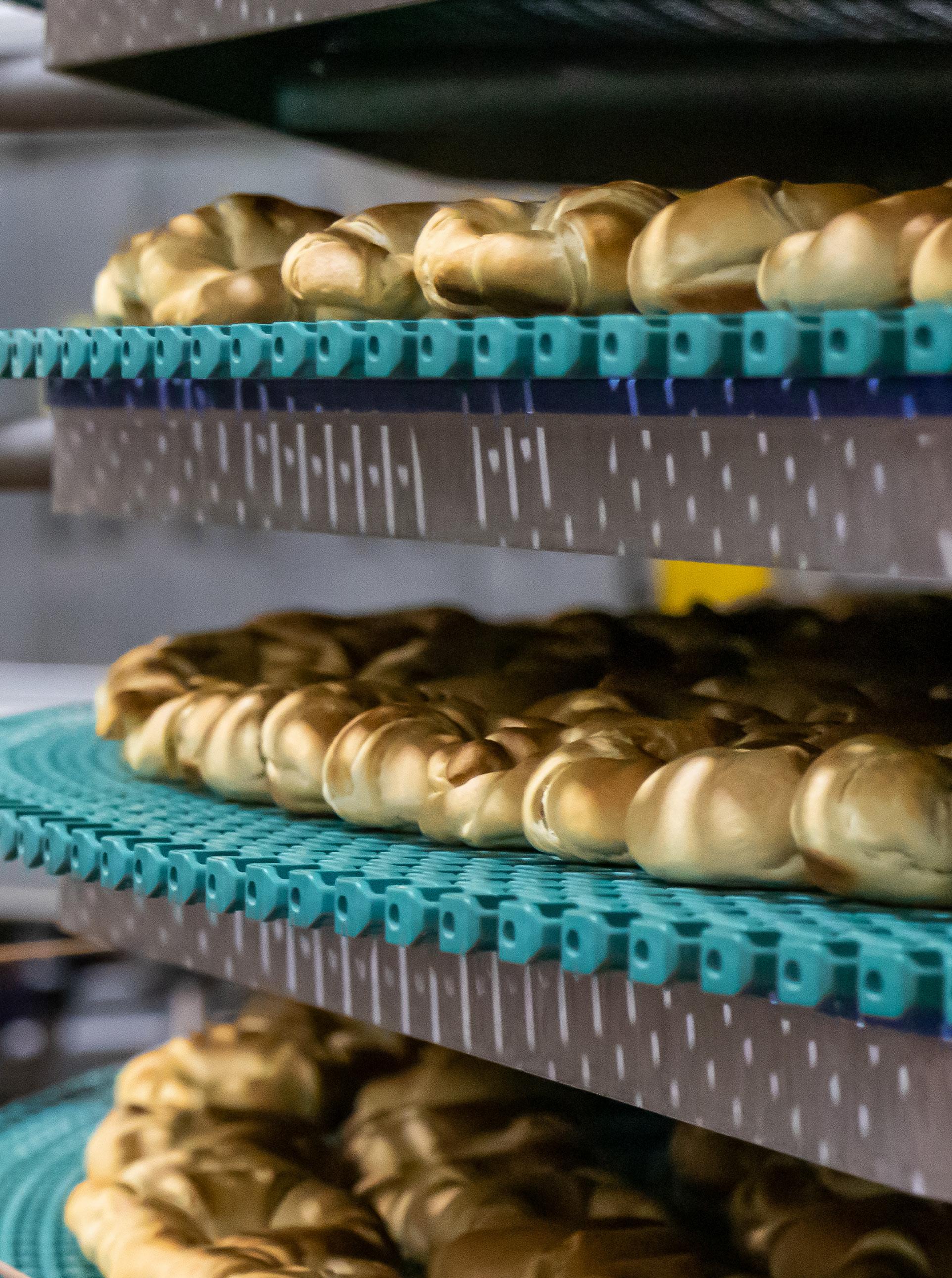
19
Photo by Olivia Siddall Avant Food Media
Mike Schlegel loves his job. As a director of R&D for Nashville, TN-based Crown Bakeries, he comes to work every day in a veritable product development playground in Crown’s newly renovated Smyrna, GA, facility, one of nine in the company’s network. Providing a space for collaborative innovation was the goal here. Well, at least one of them. To truly understand the impact of this approximately $20 million transformation, we must go back to the beginning … and take a peek at the future.
Crown Bakeries — born out of the bun and roll powerhouse previously known as Tennessee Bun Company — was founded in the mid-90s by industry icon and current American Bakers Association (ABA) board chair Cordia Harrington, who serves as the bakery’s CEO. Before the company rebranded as Crown Bakeries in 2021, brothers Yianny and George Caparos, two Baking Hall of Famers with decades of experience in croissant and sweet goods production, came on board when it recapitalized under Arbor Investments. From that acquisition, Yianny became Crown’s president and George took on the role of chief development officer.
In 2020, between the Caparos’ arrival and the company’s rebranding, Crown Bakeries acquired the Smyrna bakery from Specialty Bakers, a producer of tea cakes and sweet goods. No one can say for sure which came first — the plan to get into the laminated and sweet baked goods market or the availability of the Smyrna plant — but when the stars aligned, Crown Bakeries began charting a new course.
In this facility, the Caparos brothers saw potential, especially with existing assets including a Rademaker USA

20
CROWN BAKERIES
Photo by Olivia Siddall Avant Food Media
FEBRUARY 2023 Q1
Before it rebranded with its new name, Crown Bakeries acquired a Smyrna, GA, producer of tea cakes and other sweet goods, bringing Crown into the laminated and sweet goods market.

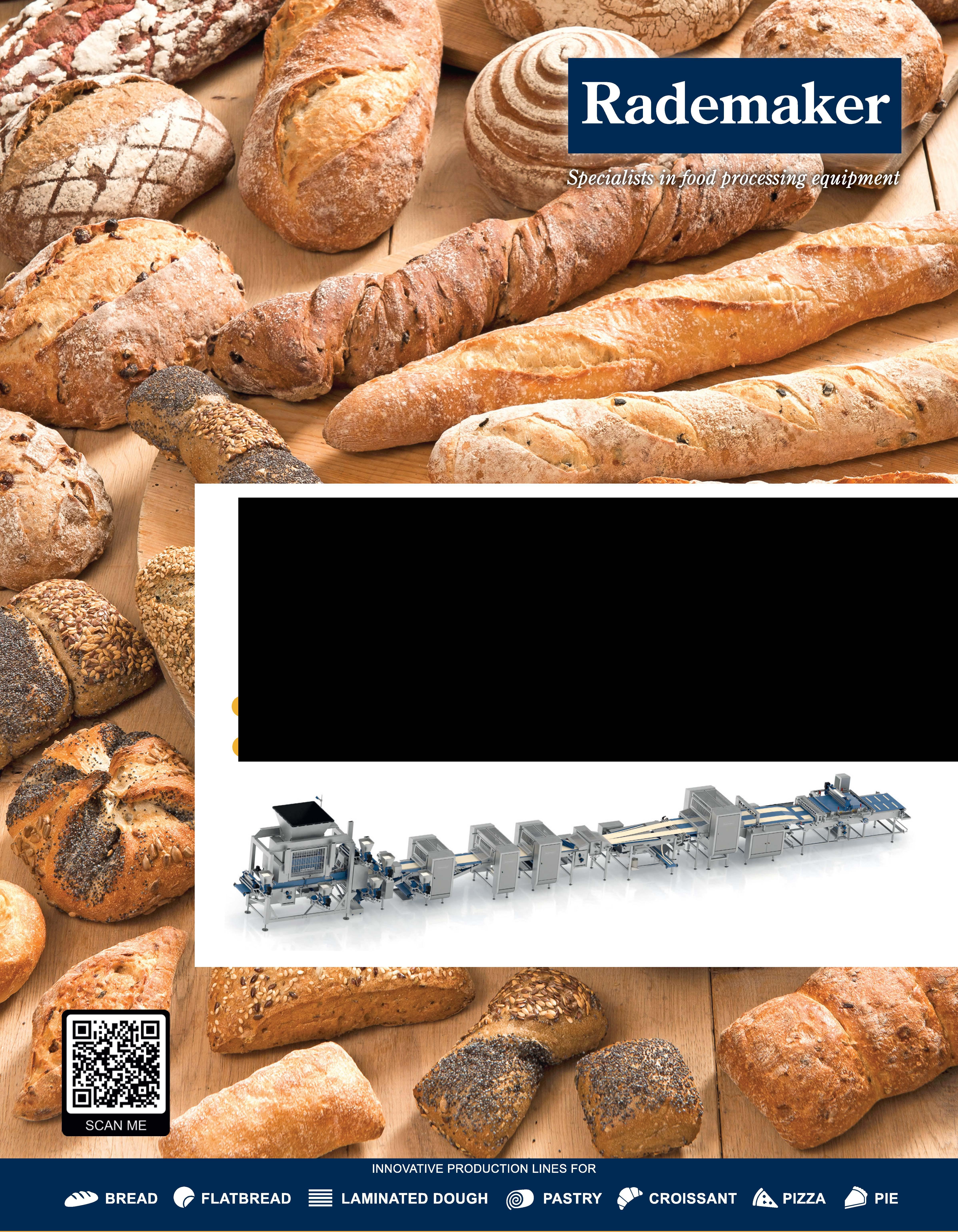
T: +1 3306502345 Effective &profitable breadproduction V: Modular concept y'f' Wide product variety vf' Excellent dough quality www.rademaker.com E: info@rademakerusa.com
laminated dough production line that had been greatly underutilized. Like those reality TV house flippers who can see the promise that awaits a fixer upper, George and Yianny walked through the Smyrna bakery and instantly envisioned Crown’s entry into the thaw-and-serve croissant game.
“That’s how we really look at all our new facilities,” said Chance Delany, director of strategic analysis for Crown Bakeries. “We look at a potential partner and say, ‘This is what we think it can look like in the future.’ Crown had a lot of clients who were looking for capacity with frozen croissants, and we saw that we could easily get into that market with this facility.”
With a long history of relationships on the laminated side, Yianny not only saw the opportunity to fill immediate needs for customers; he also recognized it as a launch pad into the category and a chance for serious growth.
“The acquisition of the Smyrna facility kickstarted our capabilities to bring Crown into the croissant business,” Yianny said. “It diversified our product mix and customer base. It allowed us to go back to those areas where we had long, tenured relationships, and that allowed us to grow exponentially in a new market.”

In less than two years, Crown entered the laminated and sweet baked goods game in a big way.
Today, the Smyrna bakery produces custom-finished frozen croissants on a Rademaker line and mini cinnamon rolls with the help of some RONDO modular pieces, as well as battered baked goods, including mini muffins and tea cakes, on an Auto-Bake line from Middleby Bakery.
The quick entry allowed the company to double down on its investment by not only upgrading the existing equipment but also completely overhauling the entire facility and building a state-ofthe-art R&D lab. It also allowed for the installation of three more Rademaker high-speed croissant lines in Crown Bakeries’ Music City, TN, and Pleasant Prairie, WI, facilities.
The growth has already generated capital to renovate 30,000 sq. ft. in the Smyrna facility, adding more production space and up to two more lines, which are currently projected to be up and running next year.
The timing of the May 2020 acquisition meant the equipment had to be overhauled in the height of the pandemic. That was no simple feat, considering business travel and onsite interaction had practically dissolved. Luckily, Crown and the Caparos brothers already had long-standing business relationships with the equipment
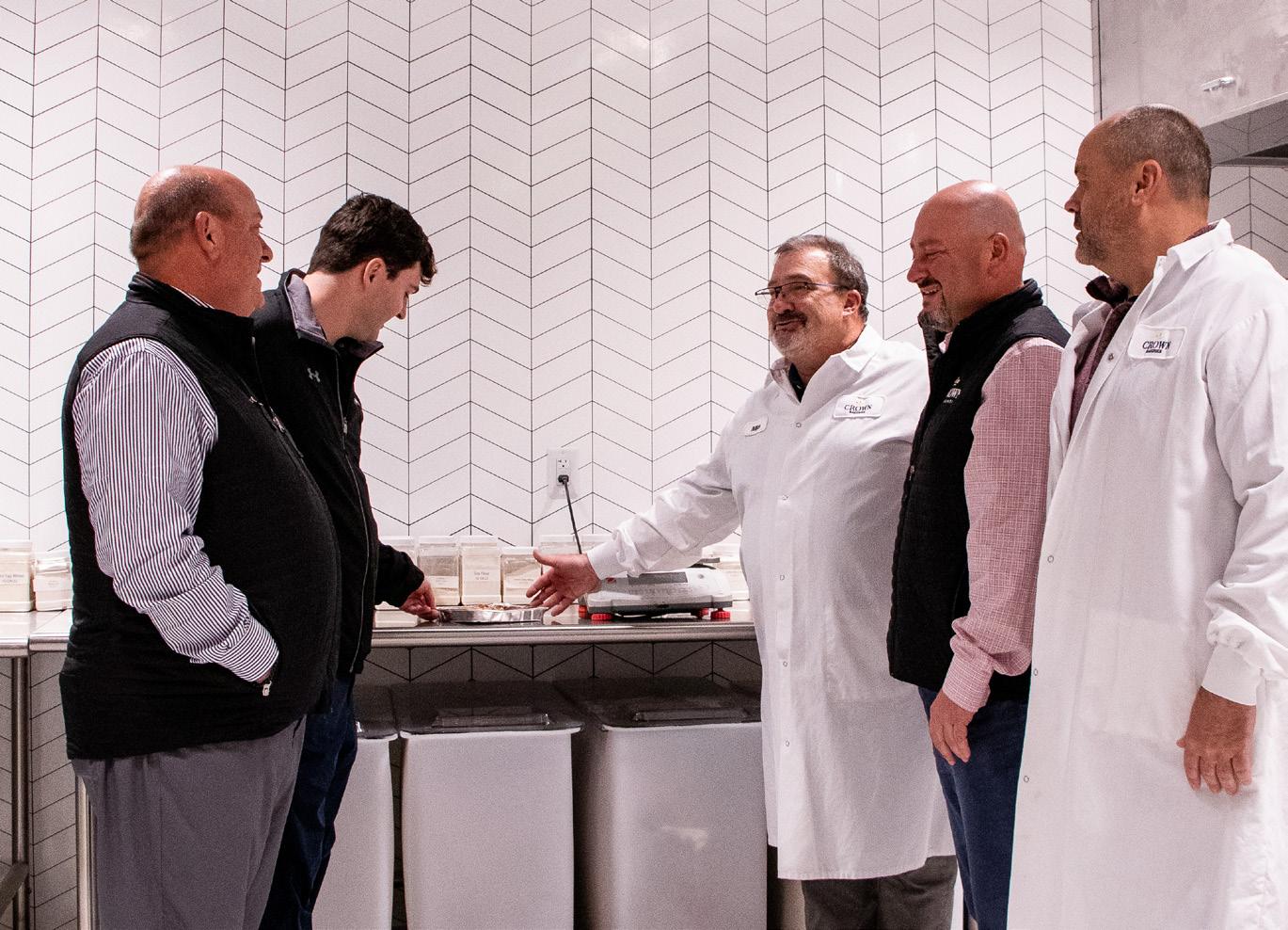
vendors. So, when the bakery called, the OEMs answered.
The Rademaker line — a key piece of equipment for croissant production — needed some TLC to get the bakery in business fast. The Rademaker team spent several weeks at the bakery to accomplish that, as did teams from other OEMs including AMF Bakery Systems, Bundy Baking Solutions and Auto-Bake.
“We were in the heart of the pandemic, and they were all here with us, doing the renovations and upgrades we needed to be operational in a short timeframe,” Yianny recalled. “We were so fortunate to have OEMs who partnered with us and supported us, especially during that challenging time, to get the equipment up to standard and make this a successful run.”
Those upgrades provided the efficiency needed to crank out orders that were
22
FEBRUARY 2023 Q1 CROWN BAKERIES
From left: Yianny Caparos, president; Chance Delany, director of strategic analysis; Mike Schlegel, director of R&D; George Caparos, chief development officer; and Kory Mickelson, chief commercial officer.
Photo by Olivia Siddall | Avant Food Media

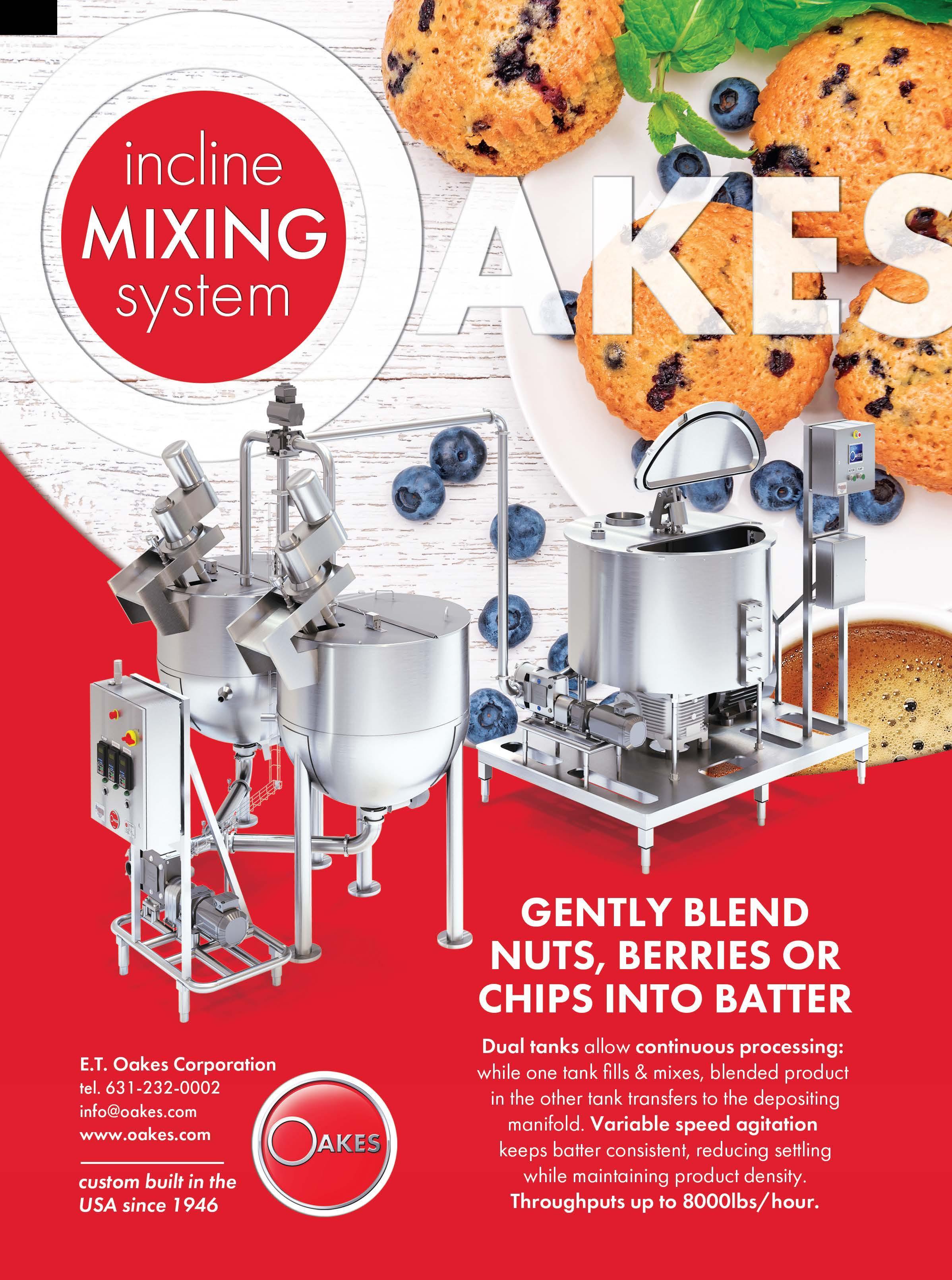
-=--- ----
coming in fast — and maintain the high quality that Crown Bakeries products are known for.
While some bakeries rely on internal teams to improve or rebuild equipment, Crown’s relationships with its vendors allowed the OEMs to do that heavy lifting.

Rademaker enhancements brought next-level efficiency to the laminated production, but that was just the beginning, as more improvements were made on the other side of the operation.
After the Auto-Bake team recalibrated the batter line’s oven and replaced its chains and added degreasers, production efficiency and product quality significantly improved for the entire line. Delany estimated the Auto-Bake team rebuilt more than 50% of the machine to achieve those results.
Ultimately, Crown created a winning combination: operational expertise of its employees on the plant floor paired with the top equipment manufacturers for those specific machines.
By focusing workforce development on product proficiency, operators can recognize when a croissant or sweet good is out of spec, but if there’s an issue with the equipment, they can rely on the supplier for help in repairing it.
“Because our leadership is so tight with our vendors’ leadership, we can easily convey our specific needs,” Delany said. “There’s no one who knows the machines better than the OEMs, especially with the labor market so tight today. You can’t lose sight of your OEMs, or you’ll risk losing sight of the machines and how they work.”
Upgrades played a huge role in the renovation, but Crown also invested in new technology on the plant floor.
On the batter line, new Yamamoto scales and Syntegon packaging lines run different configurations based on bulk or retail. Although the Smyrna plant is known for its product flexibility, the scale on the batter line was well suited for the packaging upgrade.
“When you’re making the investment to automate packaging, it’s because you have enough scale, and you’re committing to that capability,” said Larry Murray, regional director of operations. “Without that scale, you’d need to index the line for flexibility in packaging. But we have the opportunity to have scale on this line.”
24
FEBRUARY 2023 Q1 CROWN BAKERIES
Photo by Nigel Marson
—Below Investment in the R&D lab ensures the team has a playground for innovation.

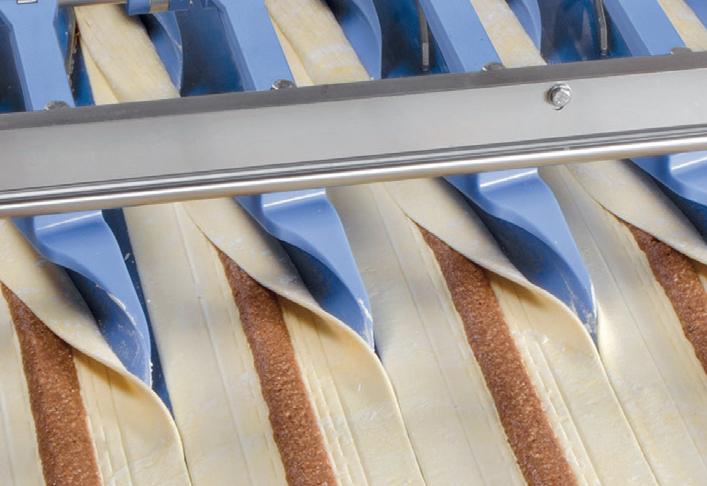


RONDO industrial solutions –More than 30 years of experience www.rondo-online.com Designed to meet the most stringent hygiene criteria. In 24-hour operation, the RONDO ASTec lines uniquely combine gentle processing of dough with the utmost precision. More about ASTec lines RONDO North America RONDO Inc. Moonachie, N.J. 07074 / USA Tel. +1 201 229 9700 info.us@rondo-online.com
On the laminated side, Crown invested in three new Empire Bakery Equipment high-speed bowl mixers to complement the Oakes mixers on the batter line.
Meanwhile, the Rademaker equipment still has the flexibility needed to hand-pinch or automate, depending on product type and shape.
“We have particular customers that require something unique,” Murray said. “Some customers need a specific shape for croissants that are made for sandwiches, for example, and now we have the ability to do that on this line.”
The Smyrna acquisition may have put Crown Bakeries on the map for croissants and sweet goods produc -

tion, but the renovation served bigger purposes, starting with Crown’s culture, where Harrington’s high standards have not waivered since the company was founded.
“The value of Crown is not really in the nine facilities or the product diversification,” Yianny said. “I can honestly say it’s in the people who work here. Our equipment is great, but it’s the people that make this place hop.”
Because of that, focusing on employee wellness was an overarching goal for not only the operation but also the total facility. In an era where employee recruitment and retention are constantly top of mind, any baking company undergoing facility
renovation would do well to take a cue from Crown.
“We come into an acquisition or a renovation wanting to hit a higher standard because retaining employees is so important,” Delany said. “We want to make an environment where people feel like they come to work and they’re safe, and it’s a place where they can interact and grow. It’s our first and foremost priority, followed by other quality standards. Then we make the proper investments to achieve all of them.”
Employee wellness is a driving force every time a bakery is integrated into the Crown Bakeries network.

26
FEBRUARY 2023 Q1 CROWN BAKERIES
Words on the wall of the bakery’s entry were chosen by employees to exemplify the values at Crown Bakeries.
Photo by Olivia Siddall Avant Food Media
AUTOMATEDSOLUTIONSFORDIVIDING, ROUNDING, SHEETING, MOULDING,ANDPANNING.

AMF Flex means unmatched scaling accuracy and more consistent product quality from the industry's leading extrusion and volumetric dividing, rounding, and makeup systems. Engineered for efficiency, flexibility, and precision, our fully automated Flex equipment has been redesigned with sanitation and food safety in mind.

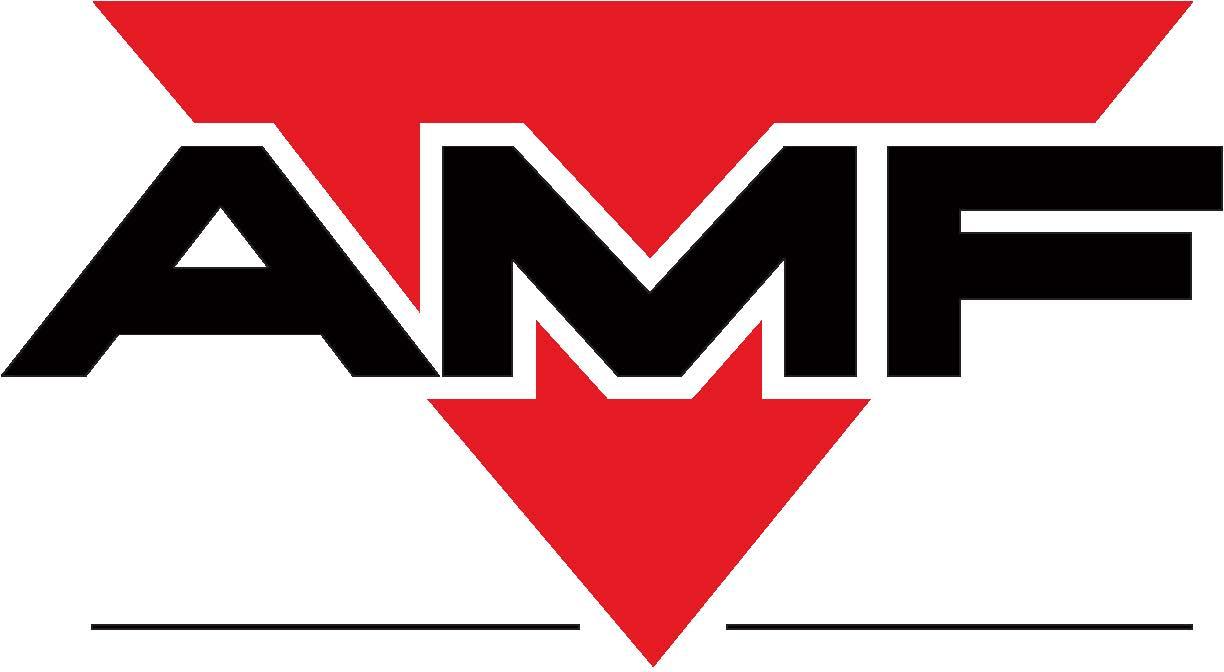
The new ADD-S Bread Makeup System incorporates the leading sanitary design elements for flexible and precise dividing with quick product changeover. Quick clean manifolds and easy access frame designs are combined with toolless sanitation and maintenance.
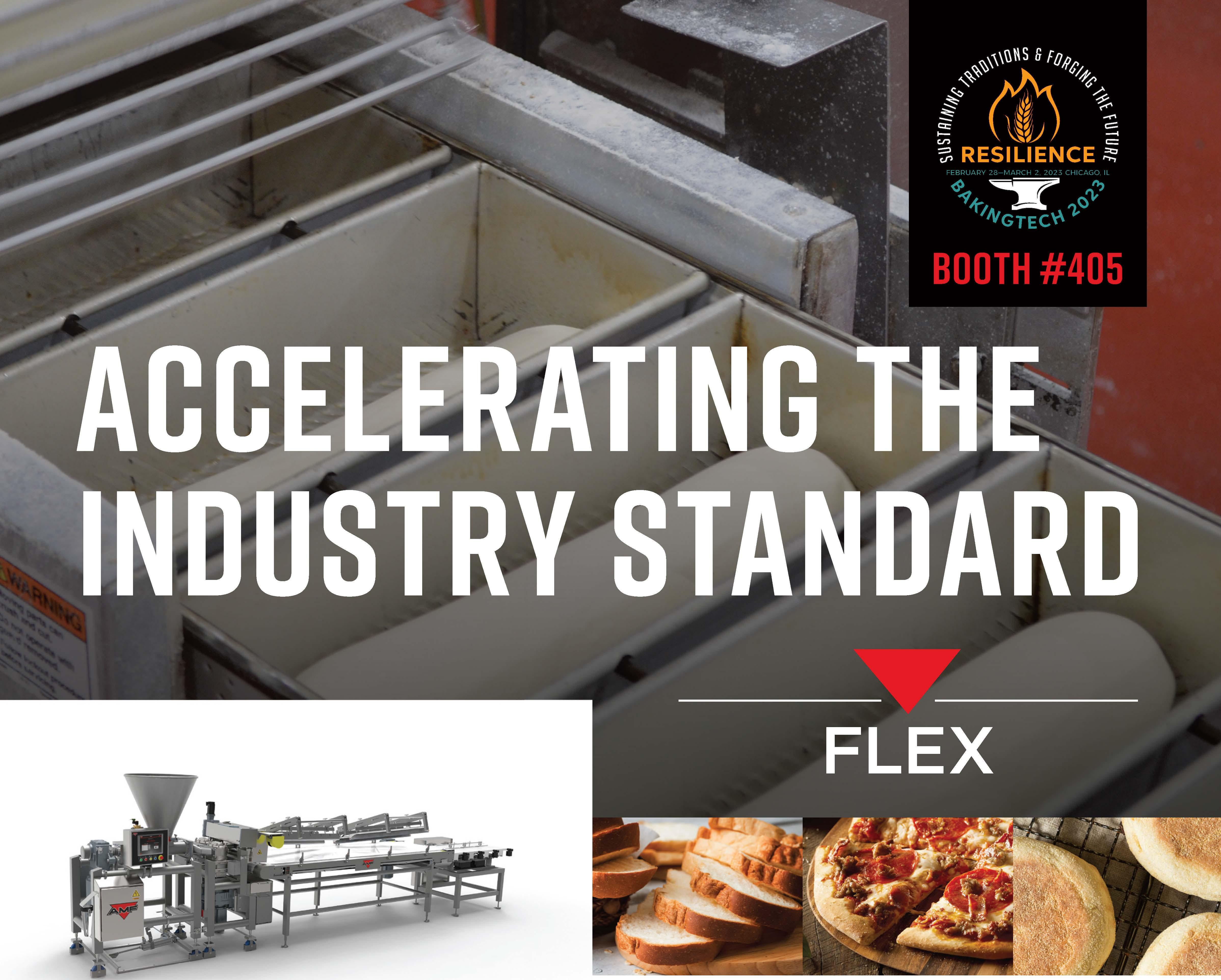
BAKERY SYSTEMS A Markel Food Group Company Scan to learn more AMFBAKER�COM I SALES@AMFBAKER�COM © 2023 AMF Bakery Systems
USA I Netherlands I UK I China I Singapore I Canada I Mexico
“We have to be an industry leader in those areas,” Delany added.
Building amenities that came with this renovation include extended locker rooms, a mother’s room and a break area big enough to host company-wide parties and training events. That makes a huge difference for Smyrna’s 150 employees.
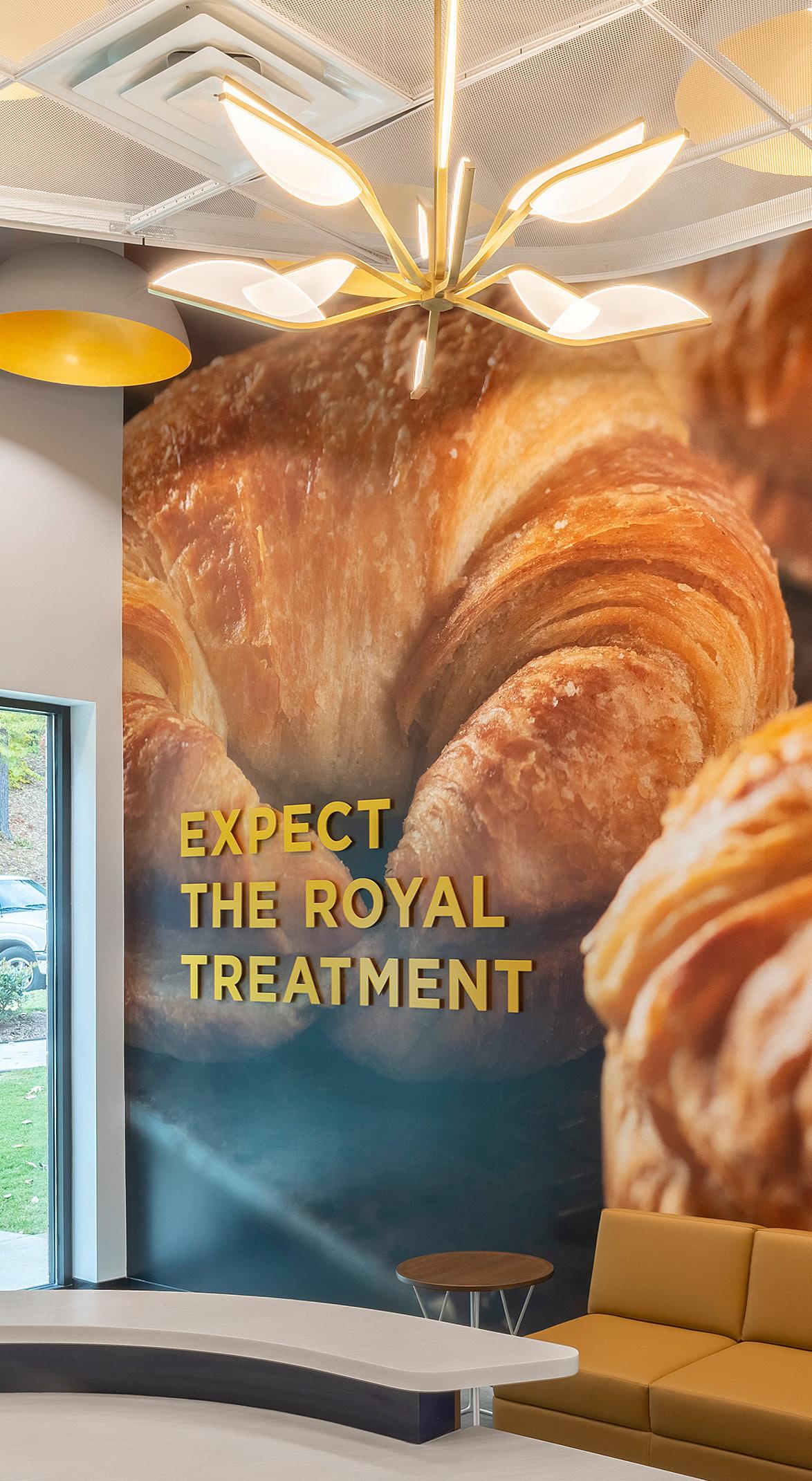
Designed with the intention to create a culture of collaboration, the space includes several internal windows that overlook the bakery floor, eliminating separation between the “office” and the “operational” aspects of the business.
To that end, meeting spaces have a bird’s-eye view of the croissant line, and all production supervisors are officed bullpen-style directly off the floor, also with clear views, to promote open communication on all fronts.
The team took inspiration from the best practices of several Fortune 500 companies in how they designed the building.
“We put in great effort to make this a place where people feel proud to work,” Delany said. “People spend so much of their life at work, so we want to make sure they’re comfortable here. We looked at how Fortune 500 companies are empowering their people and their teams. They’re making progress in the labor pool, and we wanted to draw from that and even improve on it.”
From the moment the company moved into Smyrna, Crown’s culture was a flag in the ground. Word of mouth spread quickly, and even those who had worked at the plant years before made their way back to see what the buzz was about.
28 FEBRUARY 2023 Q1 CROWN BAKERIES
The Smyrna facility’s renovation includes additional amenities, which make a positive impact on Crown employees.
Photo by Nigel Marson
ONE CONTINUOUS PERFECT BAKE FROM END TO END
MIDDLEBY’S TURNKEY BAKERY SOLUTIONS HAVE GOT YOU COVERED.

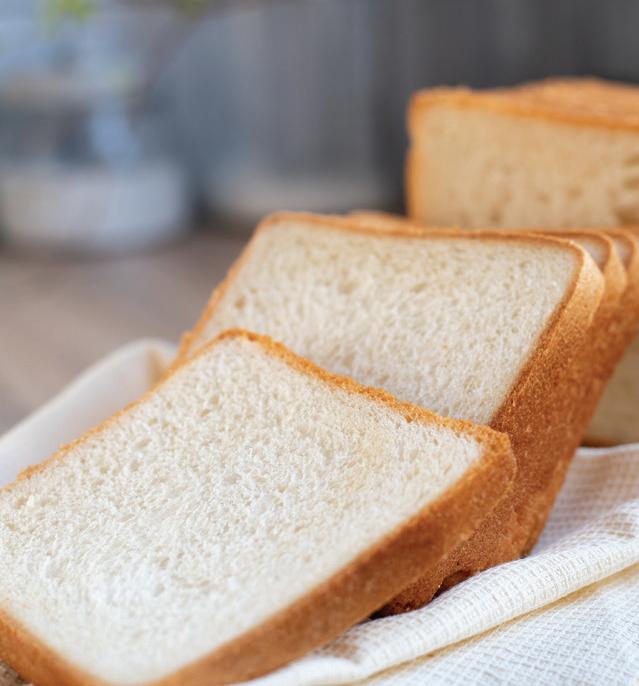
TOP OF THE LINE
Middleby optimizes best in the industry end-to-end solutions and provides you with top tier lines for all your baking needs, with complete customer support throughout equipment development, installation, and production.

Breads | Buns | Cookies | Crackers | Cakes | Muffins | Pastries | Pies | Pizzas


HUNGRY FOR MORE?
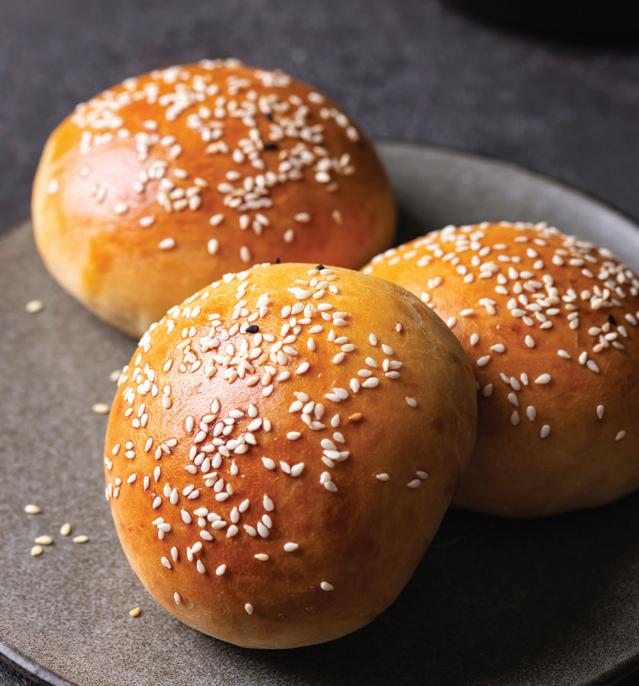
“Employees have been reaching out to their network because these changes have boosted morale, and there’s a lot of pride in coming to work here,” George said. “They’re saying to their friends and family, ‘This is a great place to work. This company cares about us.’”
And that leads back to Schlegel. When he comes to work in the R&D lab, he gets to participate in a think tank, where product developers can simultaneously focus on their specific projects and discover new ideas from one another.
“This space allows me to get really detailed in my benchwork,” Schlegel said. “It makes the work efficient, and it also makes it fun. When I’m in here with a customer, they can see my approach and process, and we can solve problems and try new things. At the same time, I could be working on something but see what someone else is doing and say, ‘Hey, that could help us with this customer, too.’”
While Smyrna’s primary focus is sweet goods and croissants, the R&D team can bolster the entire Crown network by prototyping any product from every facility. It’s a juggling act, for sure, but the space was designed to support that. The lab’s circular flow allows for easy scaling of raw materials, mixing, machining, baking and finishing, with the ability to quickly test at scale.
This state-of-the-art lab was designed to be a focal point for the plant and a hub for Crown Bakeries. Located just outside Atlanta, the bakery is close to the headquarters of many customer accounts and easily accessible for the Crown Bakeries network. Here, the Smyrna R&D team can work hand-inhand with customers and other Crown
culinary experts to develop new and custom products.
“With the number of foodservice chains headquartered in or near Atlanta, this lab provides easy access for them to partner with us and collaborate on innovation,” said Kory Mickelson, chief commercial officer of Crown. “The R&D lab wasn’t just built to support this bakery; it was created for all of Crown Bakeries.”
There are pilot labs in other locations, but Smyrna is where innovation comes to fruition. All Crown facilities have the equipment to execute customer specifications, but this lab provides a space to ideate unique formulas that perfectly suit any customer’s needs. It’s in this product development playground where Schlegel gets to help design the games, whether it’s dreaming up new products, assisting customers with formulation tweaks, or problem- s olving with cost reduction or raw materials sourcing. And it’s all done in real time.
“This lab is the cat’s meow,” Yianny said. “It’s opened the door for us to entertain customers and work with our people to create exciting products and build p artnerships. It’s a perfect place to treat our customers like royalty and personalize the experience.”
George and Yianny may be the baking industry’s version of the h ouse-flipping Property Brothers , but there’s one key difference: The investments they and Arbor Investments make in Crown Bakeries’ renovations are for the good of the company and its customers.
As the company continues its growth as a unified brand, the new lab, equipment upgrades, added a menities and process improvements make this bakery a standard bearer for Crown Bakeries.
“The value of Crown is not really in the nine facilities or the product diversification. I can honestly say it’s in the people who work here.”
30 FEBRUARY 2023 Q1 CROWN BAKERIES
Yianny Caparos | president | Crown Bakeries
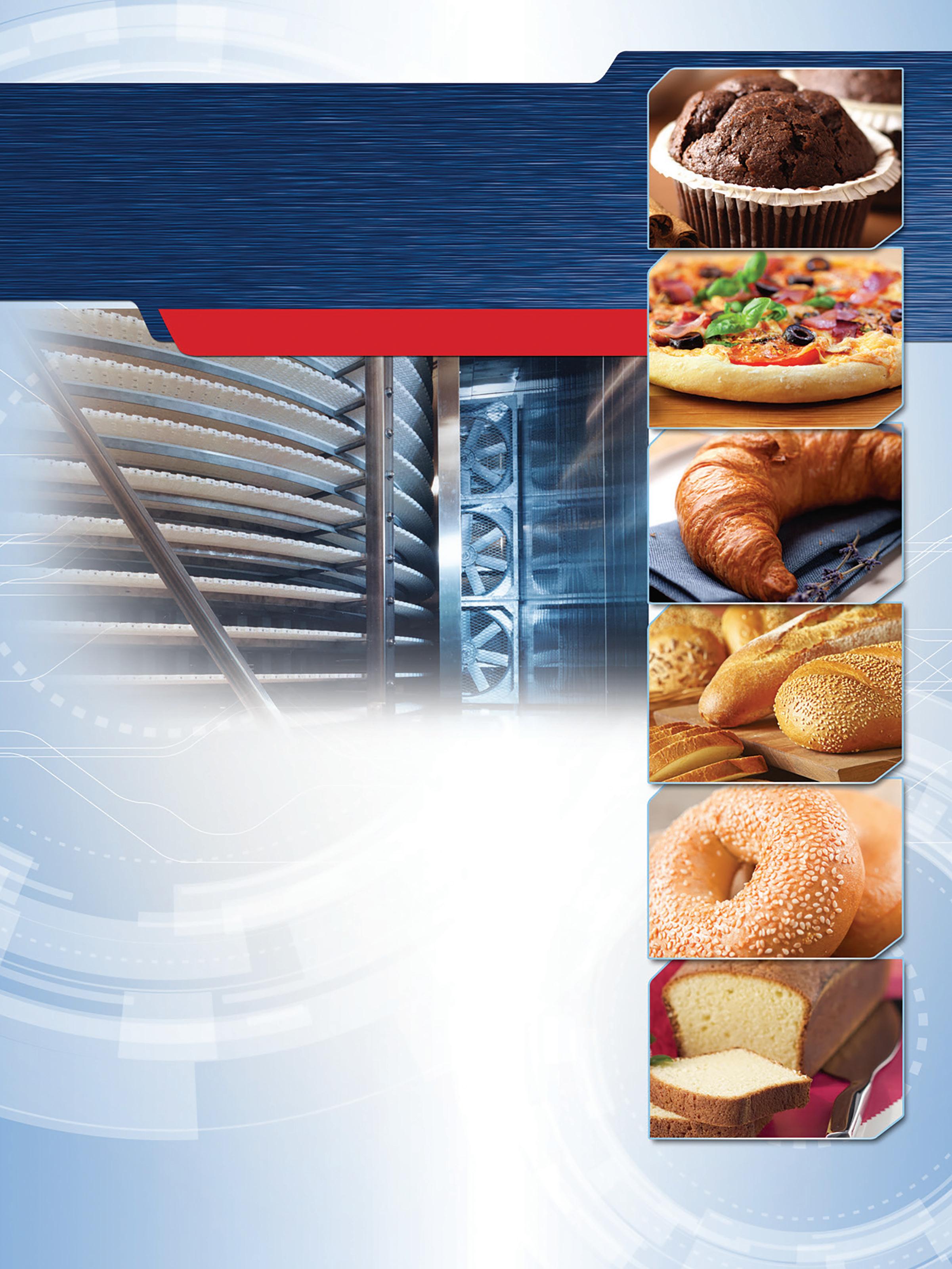






































































•Ultra Hygiene Stainless ashdo n •Track Glide Z-6000 Reduce Contamination •Ultra Series DDS Intralo SELM Belt •Auto-Pressurization Infiltration Control •Typhoon Belt Washing uto-Cleaning Systems •Powerwash 5000 High Pressure Washer •Sequential Defrost u t o - a s h C o i l s •Series 7000 Stainless Full elded Floors
FREEZING INNOVATION IN MOTION NEWHYGIENETECHNOLOGY! 20 E ecutive Blvd • Farmingdale, N 11735 www.ij hite.com • sales@ij hite.com • (631) 293-2211
SPIRALBLAST
“This investment allows the industry at large see our organization as solutionsoriented,” Mickelson said. “Instead of going through the Rolodex, so to speak, customers can look at Crown Bakeries as a one-stop shop. The breadth of our capabilities encompasses large, important categories for our customers.”
Once known primarily as a regional bun supplier, Crown’s capabilities are becoming limitless.
“We want to see our products on every corner of the intersection,” Yianny said. “Whether it’s a convenience store, supermarket, hotel or foodservice. That’s the goal.”
Getting there requires more than a robust product portfolio. Crown Bakeries’ investment in production, R&D and its workforce, along with a commitment to the culture built by its founder, is the path forward as demonstrated in the makeover at Smyrna.
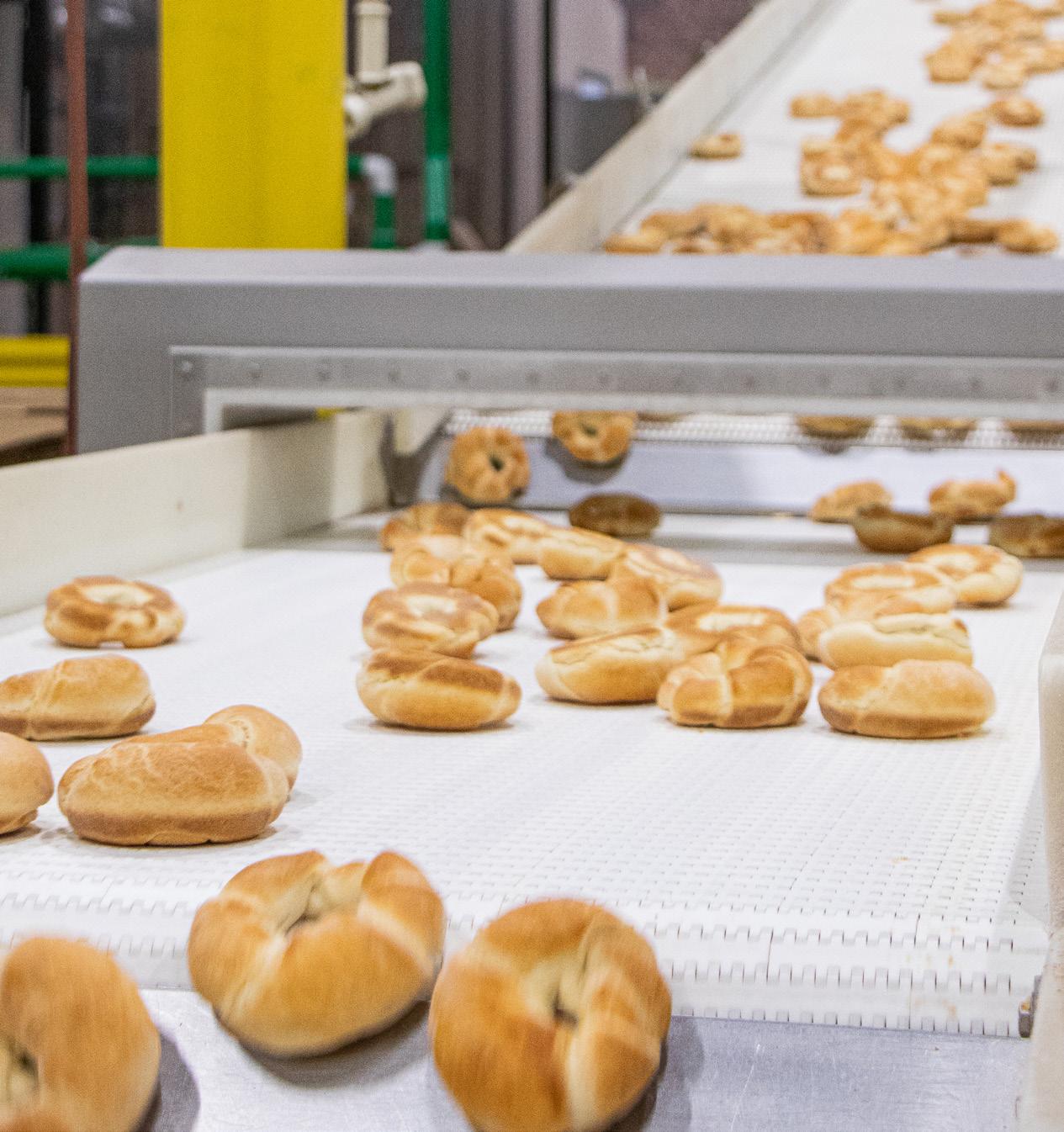

“We want to make sure the industry knows who we are and what we’re planning to do,” George said. “We’ve had a tremendous amount of improvement here, and when our customers visit, they see the huge differences in what we can do.” CB
INNOVATIONS FROM THE BAKERY FLOOR
In the nearly 200,000-sq.-ft. Smyrna, GA, facility, Crown Bakeries invested around $20 million and spent 18 months completely overhauling the entire bakery, from the plant floor to common spaces, to a more than 1,800-sq.-ft. R&D lab. This BRC- and SQF Level 2-certified location marked Crown Bakeries’ entry into the laminated and sweet baked goods market, an area that has exploded for the company in just two years. Below are the innovations that can be found on the bakery floor and in the lab.
AMF Bakery Systems proofer, oven and spiral cooler
Auto-Bake oven
Bundy Baking Solutions pan system
Empire Bakery Equipment high-speed bowl mixers
GEO/Comas depositing
IJ White spiral freezer
JBT blast freezer
KB Systems flour system
Oakes bowl mixers
Rademaker sheeting, laminating and makeup line
Revent test ovens
RONDO makeup equipment
Syntegon packaging equipment
32
FEBRUARY 2023 Q1 CROWN BAKERIES
The laminated line produces finished frozen products with the flexibility to fold or hand-pinch, depending on customer specifications.
Photo by Olivia Siddall | Avant Food Media
Made for your blending process for process
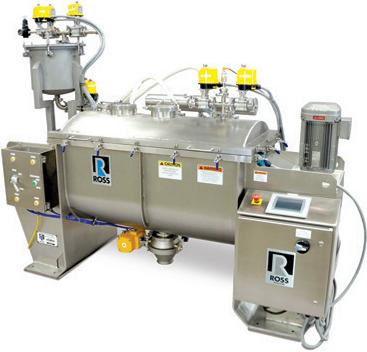
ROSS Ribbon Blenders meet the toughest requirements for quality materials and heavy-duty construction. Standard features include thick stainless steel troughs, low-maintenance gearmotors, BISSC-certified design and much more.
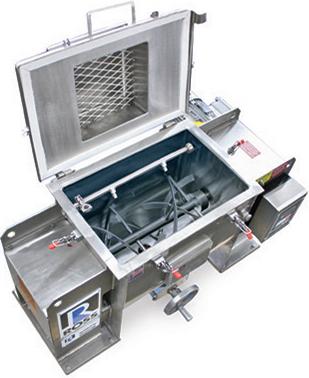
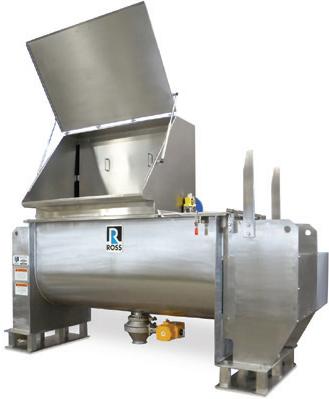

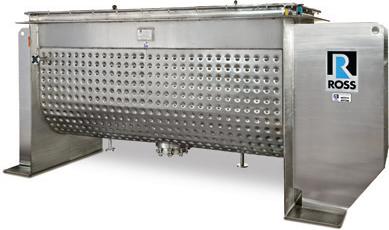

Need a Ribbon Blender customized for your process? ROSS offers MANY options. Complete control systems, spray nozzles for coating, pressure feed vessels and vacuum operation, to name a few.
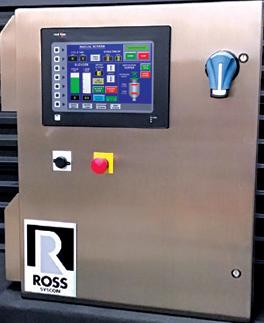

Used in a wide range of food applications, from trail mix snacks and sugar confections to cake batters and icings, we can customize a ROSS Ribbon Blender for your application.
Sizes from ½ cu. ft to 1000 cu. ft. A variety of standard models are in stock for faster delivery. Available worldwide.

mixers.com/ribbon-blenders mixers.com 1-800-243-ROSS
CONFIDENCE. BUILT IN.
Quality, robust ingredient automation. Reliable, repeatable process management. Unmatched service and exceptional value that create enduring relationships. The only global provider focused solely on food.




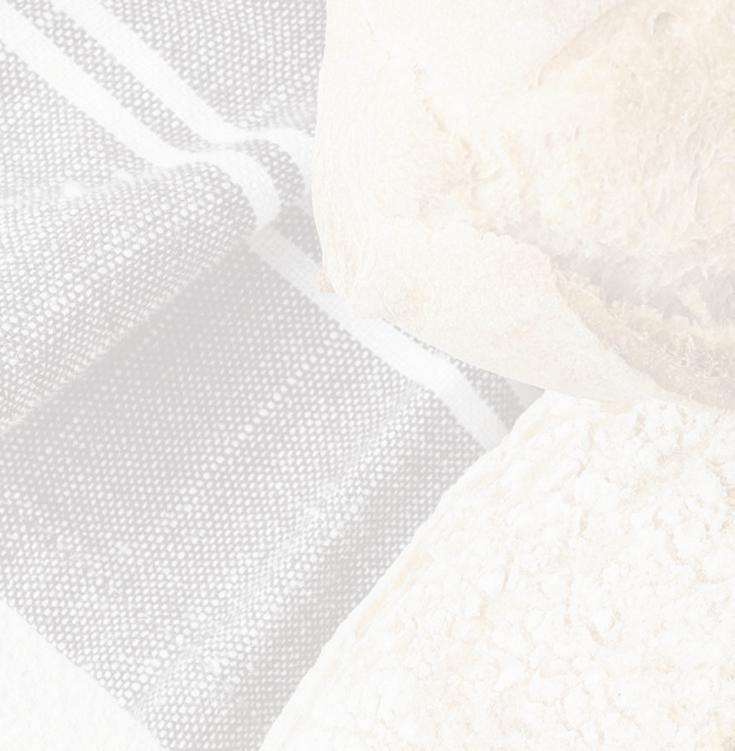

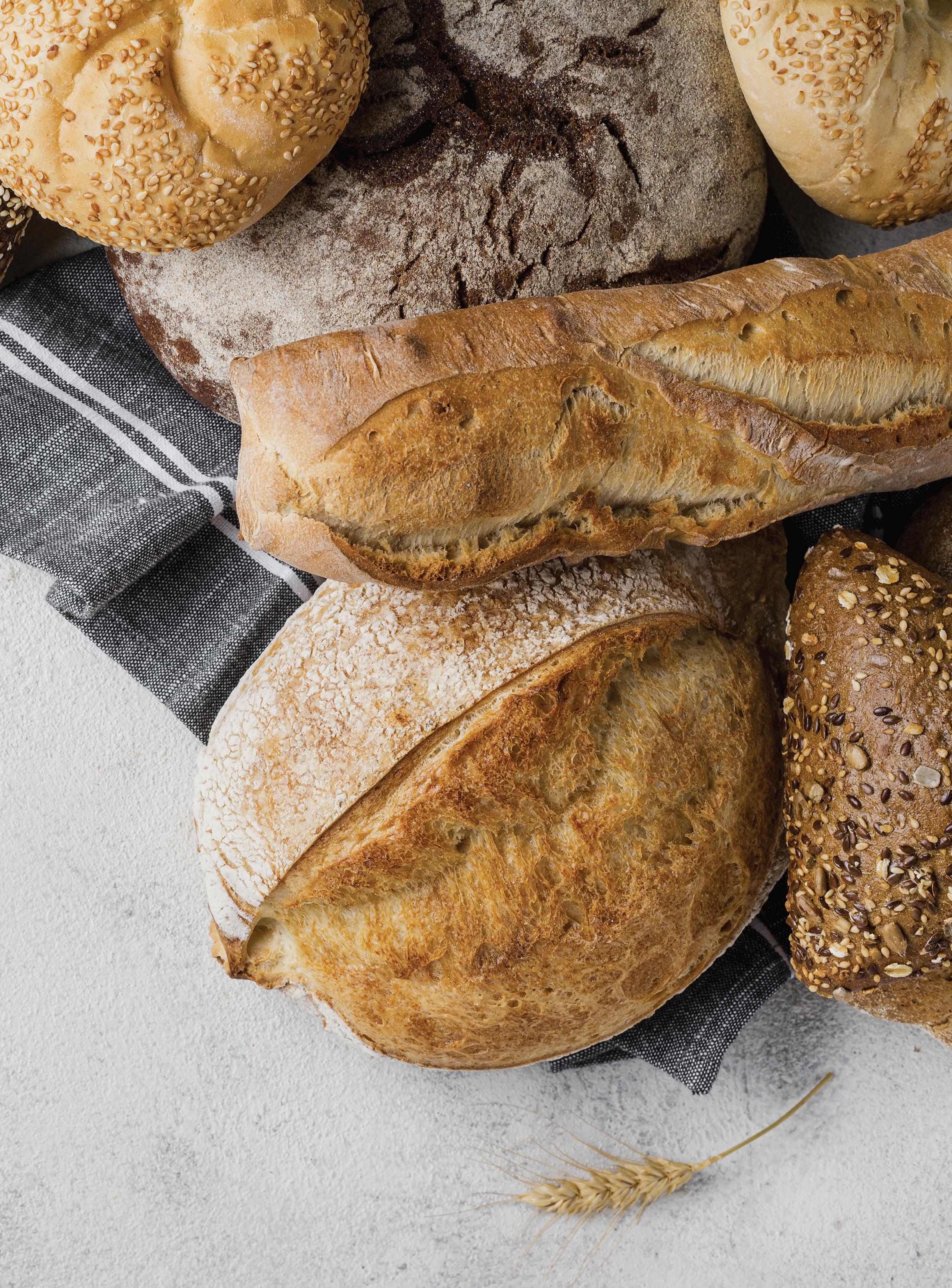
Whether it’s storing, sifting, metering, weighing or transferring, Shick Esteve is your complete flour reclaim and ingredient automation systems provider.



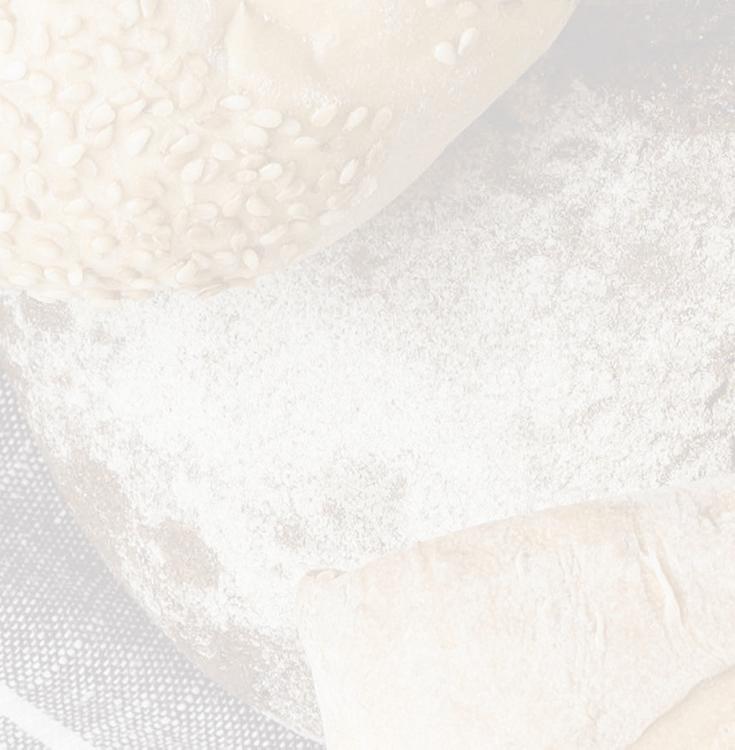
Contact us to learn more.
FOLLOW US




shickesteve.com




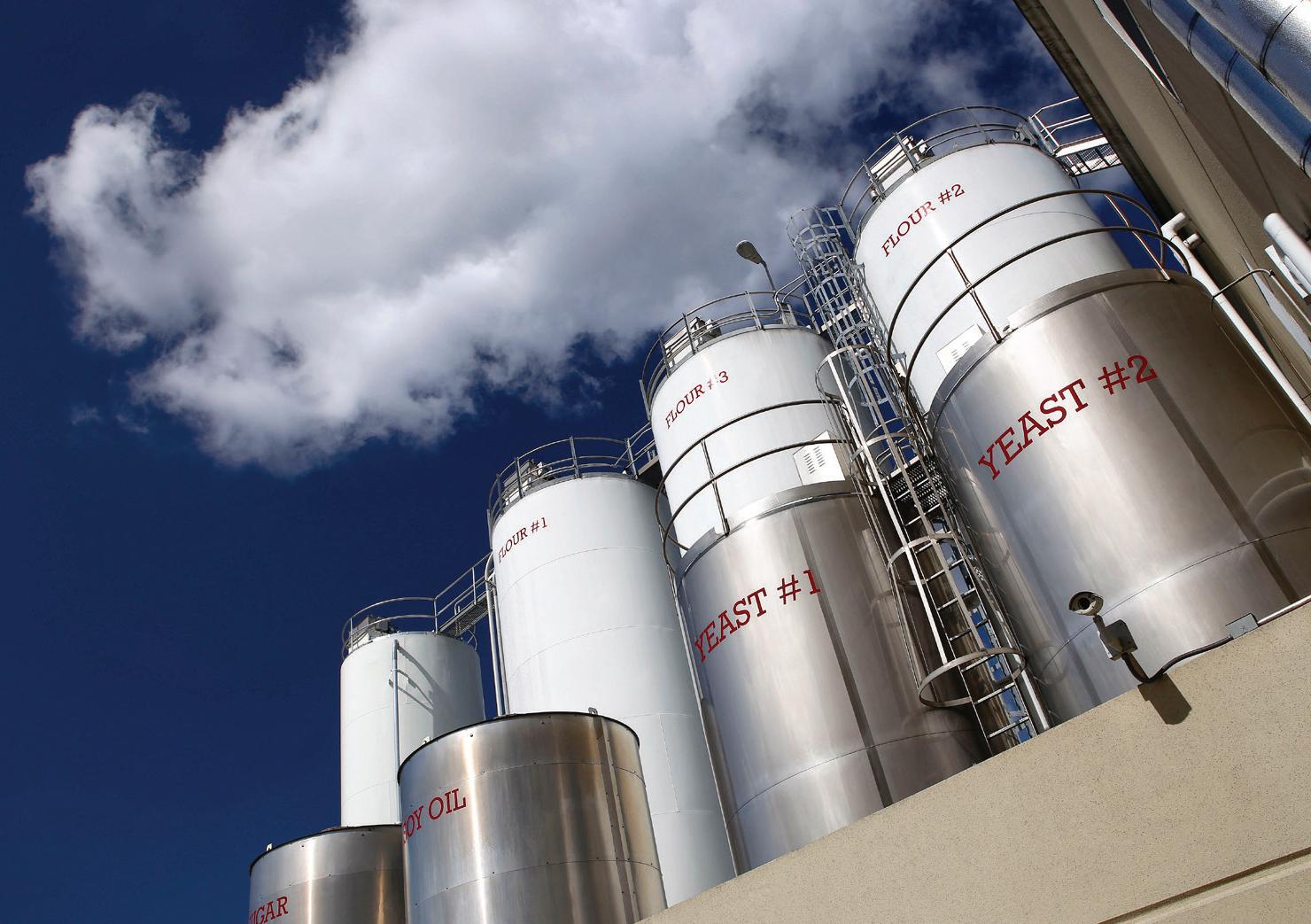

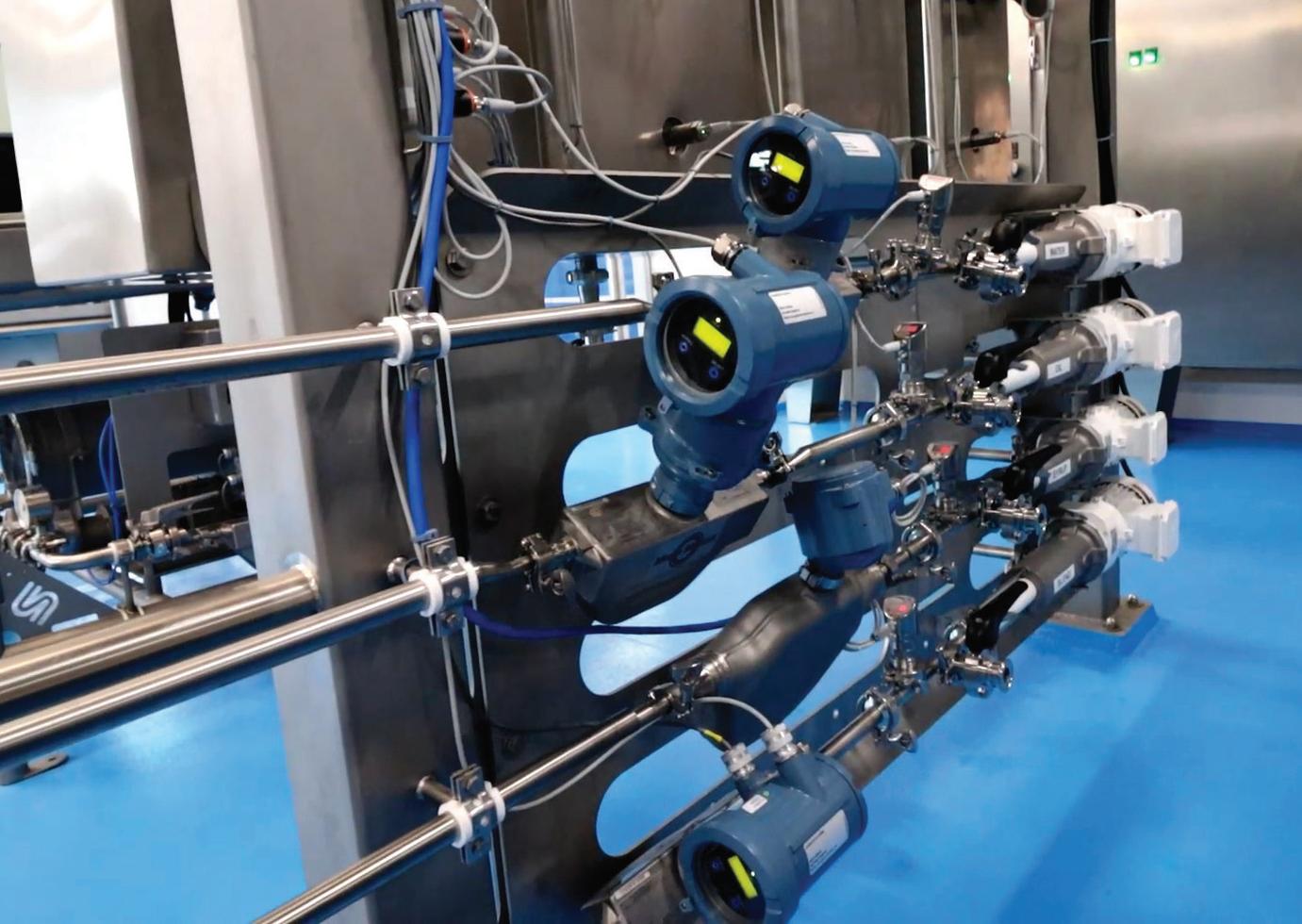
SCAN ME
Driving Forward
Eric Dell joins ABA as president and CEO with a future-facing mindset.
 BY JOANIE SPENCER
BY JOANIE SPENCER
36
All photos courtesy of ABA
FEBRUARY 2023 Q1
Eric Dell has no misconceptions about what it takes to move an industry forward. As the new president and CEO for the American Bakers Association (ABA), he has experience in Washington DC that spans from lobbyist to congressional chief of staff, forming the roots from which his association advocacy work has grown.
Dell has a long list of values that align with ABA and the commercial baking industry, starting with a passion for service that leads to a better future for all.
“Coming from the Hill, I took my knowledge of working with constituents to working with member companies,” he said of his transition from congressional work to association advocacy for the National Automatic Merchandising Association (NAMA).
Spending a decade with NAMA, Dell’s roles included building the association’s government affairs team, heading its external affairs and spending two years as EVP. In that time, Dell fine-tuned the art of the association member experience.
“Constituents elect you in a congressional office,” he said. “Similarly, in an association, the members give you purpose.”
For Dell, that purpose is about doing good for the association and the industry it serves.
While the “NAMA” Dell came from is not to be confused with the flour miller’s association, it is a group steeped in food and beverage, specifically snack vending and office coffee service. This NAMA has also been connected tangentially with the baking industry, with the two associations having some crossover membership and collaborative work over the years.
Both associations have shared involvement in advocacy through the Food & Beverage Issue Alliance, which focused on issues like labeling and other regulatory topics concerning the Food and Drug Administration (FDA) and the US Department of Agriculture (USDA).
From the shared interest in government affairs and advocacy with FDA, USDA and the Environmental Protection Agency, Dell is well versed in issues like front-of-pack calorie disclosure and public health, which has been a personal passion throughout his career. In fact, one of his more notable accomplishments was assisting in the creation of the 2020 commitment to increase better-for-you options in vending machines throughout the US.
“It was truly a commitment by NAMA members — making up the majority of vending sales in the country — who were committed to it,” Dell said. “We teamed up with the Partnership for a Healthier America to find ways to work together with the public health community. It’s a great example of my philosophy that working together creates solutions.”
Not one to focus on the past, Dell is forward-focused for the baking industry, from enhancing ABA’s already powerful government relations, to creating more environmental sustainability opportunities, to finding new ways member companies can contribute to food equity in America.
That’s a lot to bite off in his first month leading an association, but Dell has marked them as priorities in ABA’s strategic development plan, taking place with the executive committee, board and membership this year.
“You can’t tackle it all at once, but these are issues we should have out in front,” he said.
37 COMMERCIAL BAKING EXECUTIVE PROFILE: ERIC DELL
“When we partner up, we can create solutions for the industry’s biggest challenges.”
Eric Dell | president and CEO | American Bakers Association
“If you’re not in front of these issues, you can’t pave the way. And these are areas where our industry can be the leader. Customers and consumers are demanding these things, and it’s where we need to be positioned.”
Looking at those issues like food equity and sustainability, Dell sees opportunities to propel the industry. Doing so requires uncovering member companies that are “hidden gems,” quietly setting standards for best practices, so he plans to focus on members that are leading the way but remain under the radar.
Not only will that open the door for other members to follow new best practices, but it also creates a compelling
narrative, especially for lawmakers and elected officials.
“We need to establish some discovery to determine where we are and what kind of commitment we can make,” Dell said. “What are the right areas for that commitment? I don’t know the answer, yet, but our strategic planning will illuminate that.”
Those kinds of commitments are what ignite Dell’s passion for industry advocacy. It’s a fire that has burned since he volunteered in politics as a teenager in rural South Carolina.
“It’s crucial to help industries navigate the political process and educate lawmakers,” he said.
It’s not just his professional perspective on advocacy that spans both sides of the coin; Dell’s passion comes from his belief that change happens through educating both lawmakers and constituents.
“I learned early on that ‘lobbyist’ is not a dirty word,” he said. “It’s important to the process. It’s important to bring members of the industry from around the country — off the bakery floor — to sit with their elected officials.”
Legislators can’t be educated from the confines of their offices, though. Dell believes in the power of showing, not telling, and he encourages bakers to open their doors and welcome elected

FEBRUARY 2023 Q1 38
EXECUTIVE PROFILE
Starting his post as president and CEO of ABA on the first work day of 2023, Eric Dell (center) brought energy to the staff ... and found energy to match upon his arrival.

Where a mix becomes a better mix. The answer to all your blending needs B.C. Williams Bakery Service | BCW Food Products 800.527.4104 | bcwilliams.com SOURCE•BLEND•INNOVATE
officials inside to show firsthand how the government impacts day-to-day bakery operations.
In Dell’s experience, this kind of bridge building and relationship development is the tangible definition of advocacy. In those terms, ABA can be seen as the “glue” between member companies and lawmakers, and Dell wants to prioritize that for the small- to mid-size baking companies that make up nearly 90% of ABA’s membership.
One area where Dell plans to b enefit members through advocacy is by reigniting ABA’s fly-in events in Washington DC .W hile the a ssociation h as been known for facilitating Hill visits for years, the pandemic has greatly impacted its momentum. But with the return of in-person events, Dell can now use his expertise to bring back the power of the fly-in.
The key is developing value beyond the connection with lawmakers. By making the event a networking opportunity, Dell has discovered that more companies get involved.
When that happens, a fly-in becomes an opportunity that leads to larger, often more diverse representation of the industry on Capitol Hill.
While fly-ins have long been a successful tool for ABA members, Dell brings a new perspective to build from that strength and give it a modern reboot. From his perspective, fly-in events are another effective way to create that two-way education that has been instrumental throughout his career, combining business, networking and advocacy into one experience.
“It’s advocacy, but it’s also getting business done,” Dell said. “If you build things from a business standpoint
from the beginning, people will come, and they’ll have a great experience. You only get one chance with these types of events, and you’ve got to get it right.”
It’s about creating new win-win opportunities for members and the industry.
“There are a lot of regulatory issues for the industry, and we can’t forget that part,” Dell emphasized. “And we also need to find new places for partnership because when we partner up, we can create solutions for the industry’s biggest challenges.”
ABA welcomed Dell to the i ndustry on the first business day of 2023, ushering in waves of change for the association. One transformation already in motion was an overhaul of ABA’s annual convention, set for March 26-29 in Amelia Island, FL. While Dell was not involved with the convention update, he is joining ABA during an exciting time of change.
Disruption has, in many ways, become the status quo. Dell isn’t afraid to shake things up a bit to create positive change in this mature industry. It’s something that was a mutual draw for Dell and ABA’s executive committee, led by board chair, Cordia Harrington, founder and CEO of Nashville, TN-based Crown Bakeries.
With a history of working with forwardfocused leaders, Dell suited just what Harrington and the executive committee
were looking for — and he complements her flair for innovation.
“Cordia is forward leaning and mission focused,” he said. “I work well with those types of leaders.”
Coming from a related industry, with lifelong experience in advocacy and a passion for partnership, Dell is ready to steer ABA and the baking industry ahead. That said, innovation doesn’t have to disrupt a firm foundation.
“ABA is well established on the advocacy front, and we have a strong, stable staff,” he said. “That means I can focus on the future in areas like strategic planning, where we can create new and valuable ways for members to be more involved. That ultimately leads to increased ROI for membership.”
Achieving these goals, of course, can only happen through action. As a husband and father of two active young boys, that’s something Dell knows a thing or two about. And he knows that energy is the precursor to action. Suffice it to say, energy was the first thing Dell brought to the table for ABA … and it’s what he discovered waiting for him.
“There’s energy in this association,” Dell observed. “And we’re using that energy and driving forward.” CB

FEBRUARY 2023 Q1 40
EXECUTIVE PROFILE
“[Advocacy] is crucial to help industries navigate the political process and educate lawmakers.”
Eric Dell | president and CEO | American Bakers Association


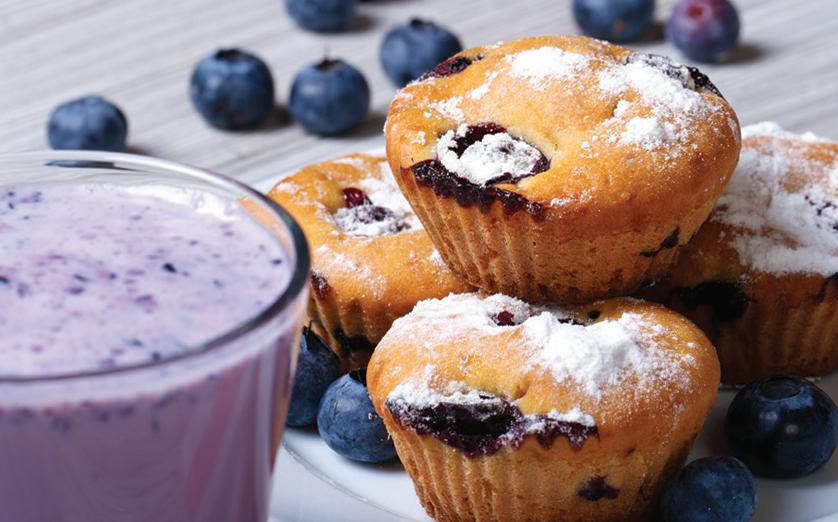
It’s ingrained in us © 2023 Ardent Mills, LLC. All rights reserved. At Ardent Mills, we are your supplier partner to solve today’s challenges At Ardent we are your partner to solve and stay ahead of tomorrow’s trends. With our nationwide footprint and stay ahead of tomorrow’s trends. With our nationwide and localized support, we help you respond to market dynamics and localized support, we you to market dynamics. And with our best-in-the-business research and resources, like And with our best-in-the-business research and resources, like our Innovation Center, we’re continually developing concepts and our Innovation we’re concepts and products that that can help you seed can you seed growth. Let’s innovate what’s next. next. Visit ardentmills.com/together today. *Ingredients depicted in raw form and not ready for use.
let’s bring ideas to life
Solutions for today. Growth for tomorrow. Together,
Under Pressure
Industry CEOs take care of their workforce … but are they taking care of themselves?
BY JOANIE SPENCER
If hindsight were 20/20, the baking industry should enjoy its share of clarity by now. Three years ago, the world shut down, and the only thing more deafening than the silence was the panic that accompanied it.
As consumers scuttled out of supermarkets with shopping carts overflowing with toilet paper, bottled water and loaves of bread, restaurants closed their doors while they figured out how to simultaneously keep patrons out and stay open for business.
Bakery line operators were classified as essential. They were seen as heroes, but they were scared. They looked to their leaders for support, and CEOs throughout the baking industry stepped up, scrambling for PPE, sourcing COVID-19 tests, paying bonuses, supplying meals and gift cards to keep families fed and local restaurants afloat, and much, much more.
In a time of crisis, these leaders acted without vulnerability or fear. They put their teams before themselves and kept the bakeries running.
The pandemic has waned, but its effects linger, with ongoing supply chain and workforce challenges reaching crisis levels and the industry bracing for an impending recession. In the c-suite, the pressure is high as ever.
CEOs put on a brave face, but for many, the cards are starting to show. In 2022, a Deloitte survey of 2,100 employees and c-level executives indicated that 76% of those in the c-suite reported the pandemic had a negative impact on their wellness. And 70% said they were seriously considering leaving their job for one that better supported wellbeing.
Health and wellness, which includes mental health, comes with many qualifiers, but it doesn’t have a job title. There’s
no “chief” in front of the human experience, and there’s no such thing as an “executive human being.” At the end of the day, mental health is a struggle across the board; yet corporate executives are treated — and treat themselves — with a different set of expectations.
It’s almost as if personal wellbeing has become a task that moves up and down the to-do list, depending on the crisis du jour. In the moment, finding equilibrium is key. But when it’s a matter of combining

FEBRUARY 2023 Q1 42
© Jorm Sangsorn on Adobe Stock
the need to protect with the need to grow, self-preservation can end up being the balancing force or collateral damage.
“In human nature, there are often two driving forces,” said Julia Freeland, professional development strategist and executive coach. “There’s a drive to protect, preserve and maintain things as they are, and the drive to explore and expand. Many leaders have a balanced approach because they naturally want to grow their organizations. But, at the same time, there’s pressure to protect and preserve because there are so many people relying on them.”
Taking the helm at any company requires certain characteristics that often m anifest as opposing forces: assertiveness vs. empathy; ambition vs. generosity; self-control vs. risk taking. It’s a dichotomy that can make managing one’s wellbeing a constant challenge.
According to Colleen Saringer, Ph.D., health and productivity consultant and first VP at Alliant Employee Benefits, mental health is part of a general health crisis from an organizational perspective. The stigma occurs when organizations — or society, really — qualify mental health into a silo. Seeing cognitive wellbeing as an overall health issue is the first step to allowing leaders the leeway to prioritize their own care.
“If companies are focusing on organizational change, development and DEI, then mental health has to be folded into that fabric,” Saringer said.
Although on the radar in Western culture now more than ever, mental health is not always widely acknowledged in the manufacturing world, where hard skills and efficiency rule. Here, competition still feels like a zero-sum game. It’s a hard
mindset to steer away from, especially in a mature industry like baking.
But in a bakery manufacturing setting, mental health can easily be tied to safety. Extreme stress — and its side effects such as sleep deprivation — can pose real physical threats. However, safety can’t solely be tied to the plant floor. Those same factors can impact critical decision making that, in turn, affects the business in a variety of ways.
Crisis situations can trigger “fight or flight,” the physiological reaction to an immediate external threat. Human beings have evolved to trigger fight or flight in stressful — but not imminently threatening — situations.
In everyday life, it looks more like a phenomenon called “amygdala hijack,” first introduced in the mid-’90s by Daniel Goldman, author of Emotional Intelligence. Simply put, it’s an emotional response to a stressful situation. In that instance, the amygdala — the part of the brain that controls emotions and responds to threats — overrides a person’s ability to respond rationally to a perceived threat, essentially hijacking the logical part of the brain.
This kind of chemical reaction can shut down access to critical thinking, so the brain becomes reactive. That can inhibit short-term decisions, but it can also lead to lasting impacts on bigger decisions and overall wellbeing, especially when every aspect of the organization falls on one person’s shoulders.
“It’s about being able to find dynamic stability,” Freeland said. “That’s the capacity to feel stable despite everything moving around you. Finding that stability is based on understanding and being at peace with your limitations.”
COMMERCIAL BAKING 43 CRITICAL ISSUES: MENTAL HEALTH
“You have to take care of yourself if you want to fully lead others ... It’s a responsibility as a leader to treat yourself well.”
Daniel Servitje | chairman and CEO | Grupo Bimbo
Small practices such as breathing exercises may seem trivial, but they can make a big difference in maintaining clarity and minimizing emotional responses when managing a heavy load on a daily basis.

For global baking industry leader Daniel Servitje, chairman and CEO of Mexico City-based Grupo Bimbo, health — on every level — is part of his daily routine. For him, it’s a critical element for effective leadership.
“I have a set of practices I try to abide by, like doing a short meditation every day or engaging in a respiratory exercise,” Servitje said. “These things allow me to increase my capacity and also quiet me a bit more.”
Physical and mental wellbeing are not mutually exclusive, and it’s important to Servitje that he incorporates healthful practices wherever he can, including participating in “walking meetings” when possible.
“I exercise every day,” he said. “Sometimes that means multitasking to do physical activity while working. I also try to eat well and get enough sleep.”
While it may feel indulgent to make time for workouts or a midday walk, Servitje encourages leaders to shift that thinking.
“You have to take care of yourself if you want to fully lead others,” Servitje said. “It’s not selfish. If you don’t take care of yourself, you’re going to be leading in an incomplete way. It’s a responsibility as a leader to treat yourself well.”
Additionally, Freeland said, shifting expectations enables leaders to have a
quick reset and reengage critical thinking because when that happens, innovation often follows.
It can be a long way to the pinnacle of a career. People spend decades working toward a “chief” title, and in the baking industry, the journey might begin on the plant floor. There’s often a perception that a wealth of benefits, including power, prestige and the big payday awaits in the c-suite.
That’s often where perception and reality diverge. Sure, there’s clout that comes with the c-level title, but there can also be cost associated with the benefits.

They say it’s lonely at the top, but when things get hard, it gets even lonelier. Veronica Delgado, EVP and chief human resources officer (CHRO) for Centuri Group, a Phoenix-based stra -
tegic infrastructure services company, sees it all the time.
“A lot of people don’t realize there’s no place to go when you’re in the c-suite,” Delgado said. “There’s a certain expectation to show, ‘I can take all this on.’”
Those expectations can inherently inhibit c-level executives from addressing mental health.
“There has to be a more conscious effort on behalf of senior leaders to be okay with saying, ‘I’m not okay,’” Delgado said.
CEOs happily set up employee resource programs for their workforce. But at the same time, their own persona of strength — and the stoicism associated with it — makes those resources seem inaccessible, even if they implemented them in the first place. It’s a Catch-22.
FEBRUARY 2023 Q1 44 MENTAL HEALTH
By using tools that support mindset shifts, leaders can reengage critical thinking and avoid the “amygdala hijack.”
© Anela on Adobe Stock



JLS® is the trusted source for flowwrapper loading. Safe, accurate placement with IP69K rated delta robots. Fill labor gaps. Enhance food safety. EXPERIENCE FOR YOURSELF AT jlsautomation.com | 717-505-3800 DO MORE WITH LESS
As a CHRO, Delgado often sees herself as a concierge of sorts, helping c-level executives connect with the right types of resources. Yes, it’s hard to get into the right mindset or accept that it’s okay to ask for help, but sometimes it’s simply the time-space continuum holding them back. A concierge mentality can help an executive put one mental foot in front of the other, so to speak.
“There’s likely a point in a person’s career where they would be apt to get help, but when they reach a leadership level, it’s like all hands are off,” Delgado said. “There’s a stigma that when people reach a certain level in their career and make a certain amount of money that they should just suck it up. But that’s not acceptable behavior anymore.”
Delgado believes that an executive resource group (ERG) can serve as a mental health parity for leaders. It creates a safe space for CEOs to share their struggles and allows them a realistic way to break free from packed schedules and work through the stress.
These kinds of groups can allow executives the opportunity to express the empathy that might be missing from their daily interactions because often the struggles don’t just live in — or come from — what’s happening in the job. Corporate demands make it harder to manage the demands of everyday life, and sometimes, one side feeds the other.
Resources like ERGs, executive coaches or even symposiums or cohorts can give CEOs a safe space to talk about mental health issues like anxiety management and work-life balance.
As the industry experiences a generational shift in its workforce and leadership, company cultures are being
viewed through a new lens, and mental health is playing a bigger role from which leaders are not always exempt. Today, many baking companies are making cultural changes to become primarily collaborative, and that bodes well to foster an environment of wellbeing for all.
The Deloitte study revealed an inverse relationship between the c-suite’s concern for employees’ wellbeing and the workforce’s perception of it. While 91% of top executives said they believe their employees feel their leadership cares about them, just 56% of rank-andfile workers shared that perception.
Breaking down these misconceptions can enable leaders to show a more vulnerable side, which can open doors to their own wellbeing. That requires balance on a deeper level than just the typical idea of work-life balance.
“The idea of collaborative, community success bakes in the need for vulnerabil -
ity to happen because culture has to be supported and built together,” Freeland suggested.
With baking facilities around the world, Servitje prioritizes being involved with what is going on in the company as much as possible.
“I visit plants and talk with customers and associates so that I’m in touch with the reality of the business,” he said. “But then I make sure to take a step back to focus on the big picture. You cannot micromanage everything as a leader because it’s exhausting. But it’s important to connect and to have a sense of what’s happening in the business.”
Self-awareness and authenticity are also keys to creating a sense of balance.
“In business relationships, you have to be authentic and be yourself,” Servitje added. “You have to be humble to hear
FEBRUARY 2023 Q1 46
MENTAL HEALTH
“If companies are focusing on organizational change, development and DEI, then mental health has to be folded into that fabric.”
Colleen Saringer, Ph.D. | health and productivity consultant | Alliant Employee Benefits
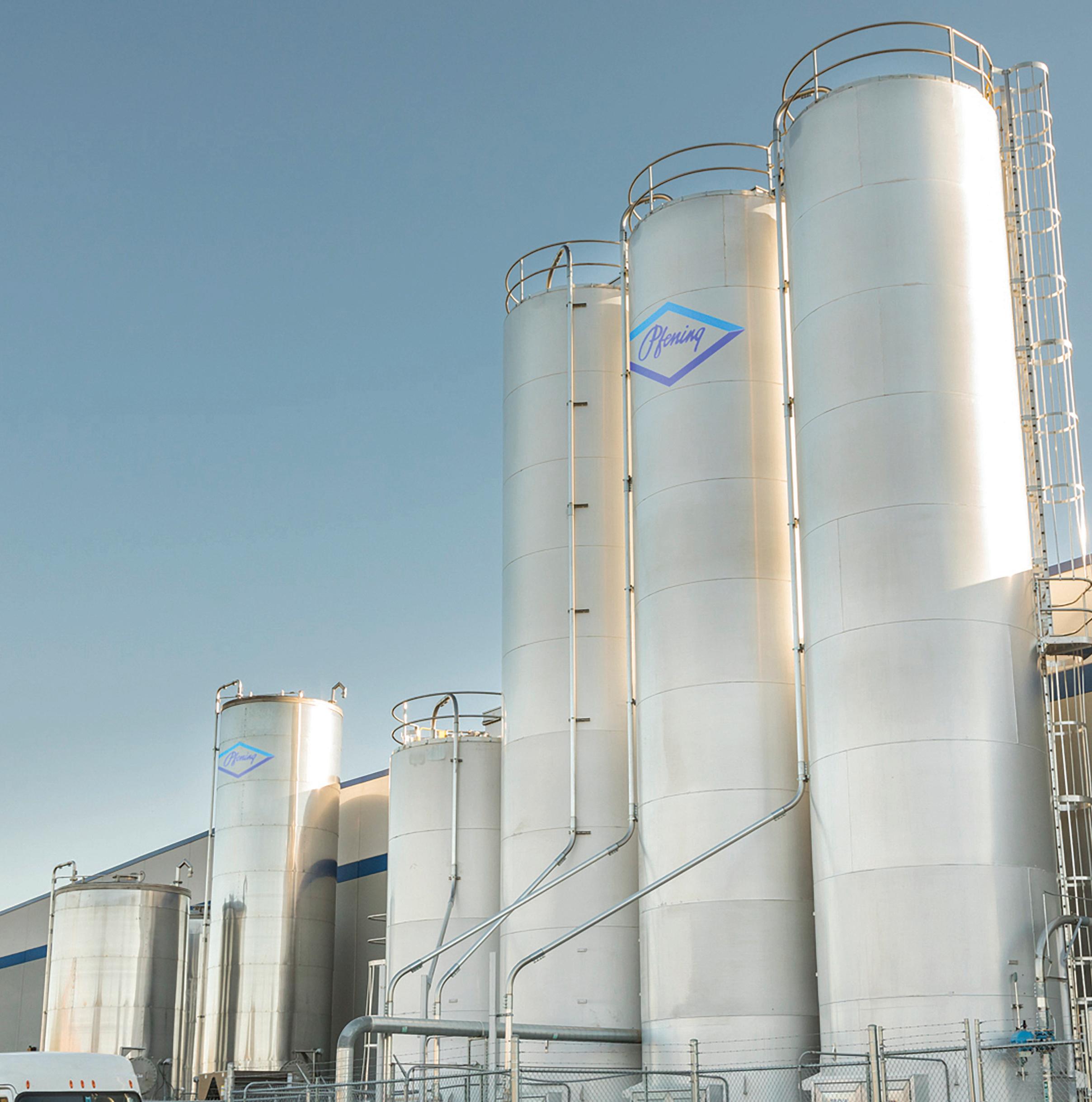

Pfening’s in-house production capabilities allow full control over our equipment design and quality. www.pfening.com | sales@pfening.com WITH PFENING IT’S ALWAYS Customer First Delivering Superior Value Since 1919 • Water and liquid dosing systems • Dough conditioning systems • Comprehensive engineered systems • Automated ingredient handling systems • Turnkey projects from design to startup • Integrated control systems
your strengths and weaknesses because nobody is perfect.”
Servitje not only obtains feedback from Grupo Bimbo associates; he also uses it as guideposts for his own professional development. In fact, he keeps a card on his desk with notes organized in two columns: One side lists associate feedback, and the other side contains impactful suggestions from an executive coach.
Servitje’s card serves as a reminder that leadership is a work in progress that is often the result of feedback and collaboration.

“At the end of the day, leaders are human beings who were raised a certain way and taught to deal with these issues
in certain ways,” Saringer said. “But when you layer in the fact that they’re also the ones keeping the lights on in an organization, that becomes a heavy weight to carry.”
Servitje often thinks of advice once given to him by a board member of his company: “There will always be more work than time.”
Creating a rhythm for managing business is one way that Servitje tries to bring those two forces into balance. It’s not an easy task, but it’s a priority he sets when looking at the year ahead. He then considers that rhythm within the context of his time overall.
“I do a personal review on what brings me energy,” he explained. “Then I look at the
things that are draining to my energy or wellbeing. I have to focus on doing things that don’t drain me in those ways.”
The past three years have taught the baking industry resilience and reminded executives to expect the unexpected. Peace can live in chaos, but it requires

MENTAL HEALTH
©
Paul Craft on Adobe Stock
flexibility, vulnerability and, perhaps above all, grace.
There is a reason why preflight safety protocols direct adult passengers to put their oxygen mask on first. For leaders to be their most effective, they must care for themselves first.

It’s a hard habit to break, but when leaders prioritize their own care, they are able to make better decisions and bring the best of themselves for their companies and associates. After all, a life that is focused only on work is often not a life well-lived.
“In a sense, it’s about being practical,” Servitje said. “Because your life is your time, and that’s it. You only live once. If you have a purpose in life, and you
want to do things in business, with your family and for the community, you have to prioritize yourself accordingly. And you have to surround yourself with good people to help along the way.”
There must come a moment when the title is separated from the person. When that happens, c-level leaders can finally allow themselves to be mentally well. And in the end, they can become better executives from it.
“Every industry is waiting to be disrupted,” Freeland suggested. “The more that leaders are willing to share their difficulties, the more they’re willing to get together and open up and question those shoes they wear, the more they’ll be able to move into the future, together, and better.” CB
“The idea of collaborative, community success bakes in the need for vulnerability to happen because culture has to be supported and built together.”
Julia Freeland | executive coach
Removing eggs from a formula can not only remove an allergen, but also save on costs, make raw material storage easier and simplify the production process.
Brolite’s egg replacers can work as a total egg replacement in yeast raised products and up to 30% in cakes. Even with a partial replacement, a baker can have more consistent costs of ingredients and more supply stability.
Lose the eggs, keep the functionality, supply and cost savings of an egg replacer.

CUTTING EDGE TECHNOLOGY AND THE ART OF OLD WORLD BAKING Egg Replacers
BROLITE PRODUCTS, INC (630) 830-0340 | TOLL FREE (888) 276-5483 | FAX (630) 830-0356 1335 SCHIFERL ROAD, BARTLETT, IL 60103 | 1900 S PARK AVE, STREAMWOOD, IL 60107
PRODUCT DEVELOPMENT: HURDLE TECHNOLOGY
A Winning Combination
New food preservation technology could be the future for longer shelf life.
BY MAGGIE GLISAN
Finding new ways to prolong the shelf life of bread and other baked goods while maintaining that just-baked taste and fresh-from-the-oven texture — not to mention peak nutritional value — is a challenging endeavor. But for bakers up for the tricky task, hurdle technology might unlock the key to success.
Hurdle technology utilizes a combination of mild, reliable food preservation techniques to combat microbial spoilage while maintaining a high level of product quality, safety and stability. Applying hurdle technology along with predictive
microbiology and Hazard Analysis Critical Control Point (HACCP) principles can optimize the food manufacturing and preservation process.
One might think of hurdle technology as an obstacle course for microorganisms, and it’s the job of the course designers — formulators, engineers and manufacturers — to create a series of hurdles that prevent any single microorganism from getting through to the end. This multitargeted approach is an effective way to ensure food safety and extend shelf life without sacrificing product quality.
Keep in mind, this is a relatively new concept. The term “hurdle” was coined by professors Lothar Leistner and Grahame Gould in 1976. The phrase “hurdle technology” was later derived by Leistner in 1985.
The method is still evolving as new technological advances are introduced, and there are significant benefits, especially in the baking industry, according to Kathy Sargent, senior director of technical services for Horsham, PA-based Bimbo Bakeries USA (BBU).

COMMERCIAL BAKING 51
© Maksim Shebeko on Adobe Stock
The concept of hurdle technology has been around since the 1980s, and it’s still evolving as new technologies are developed.
“Any time you put a preventative measure in place to control mold or other microorganisms, you inevitably create some kind of damage, whether that’s to flavor, texture or nutrition,” Sargent said. “But by using multiple hurdles and approaches, you are able to scale everything back to a level that’s more manageable and collectively achieve all your objectives.”
Another advantage is that bakers can prevent microorganisms from figuring out how to overcome their hurdles. Just like a flu strain, microorganisms evolve and develop resistance, but by implementing multiple hurdles, formulators can avoid that with one preservative map. Ultimately, they can also control quality and cost by using several approaches.
Ben Reusser, innovation center manager at Cain Food Industries, shared that one of the biggest advantages to implementing hurdle technology is extending a product’s shelf life.
“I like to think of hurdle technology as compounding interest, each new hurdle adds value to the previous hurdles,” he said. “By using a combination of processing controls, sanitation, standard operating procedures and mold inhibitors, you can create products that stay fresher for longer. Plus, when you use a combination of factors, there’s less reliance on one crucial processing step in the line — if that one step fails, you’re talking about higher customer complaints and possible recalls if it is a food safety issue. Hurdle technology helps mitigate that risk.”
Hurdles are categorized as physical, physico-chemical and microbialderived, and each aims to eliminate or inhibit unwanted microorganisms. Commonly used hurdles include high
or low temperatures (heating/baking or chilling/freezing), reduced water activity, oxidation reduction potential, increased acidity (low pH), preservatives (sorbates, nitrites, sulfites) and competitive floral (microbial fermentations). The intensity of individual hurdles can be adjusted to meet different objectives.
When choosing which hurdles to implement, it’s critical to consider all the steps in the process, from ingredient sourcing, manufacturing and packaging to individual product attributes.
“Anything that’s occurring that would theoretically make it more difficult for a microorganism to grow could be a hurdle — whether that’s inside the product or outside,” said Daniel Unruh, senior scientist at Corbion.
Each product has intrinsic properties that are key to understanding its behavior in terms of shelf life. For example, a baked good with high water activity will
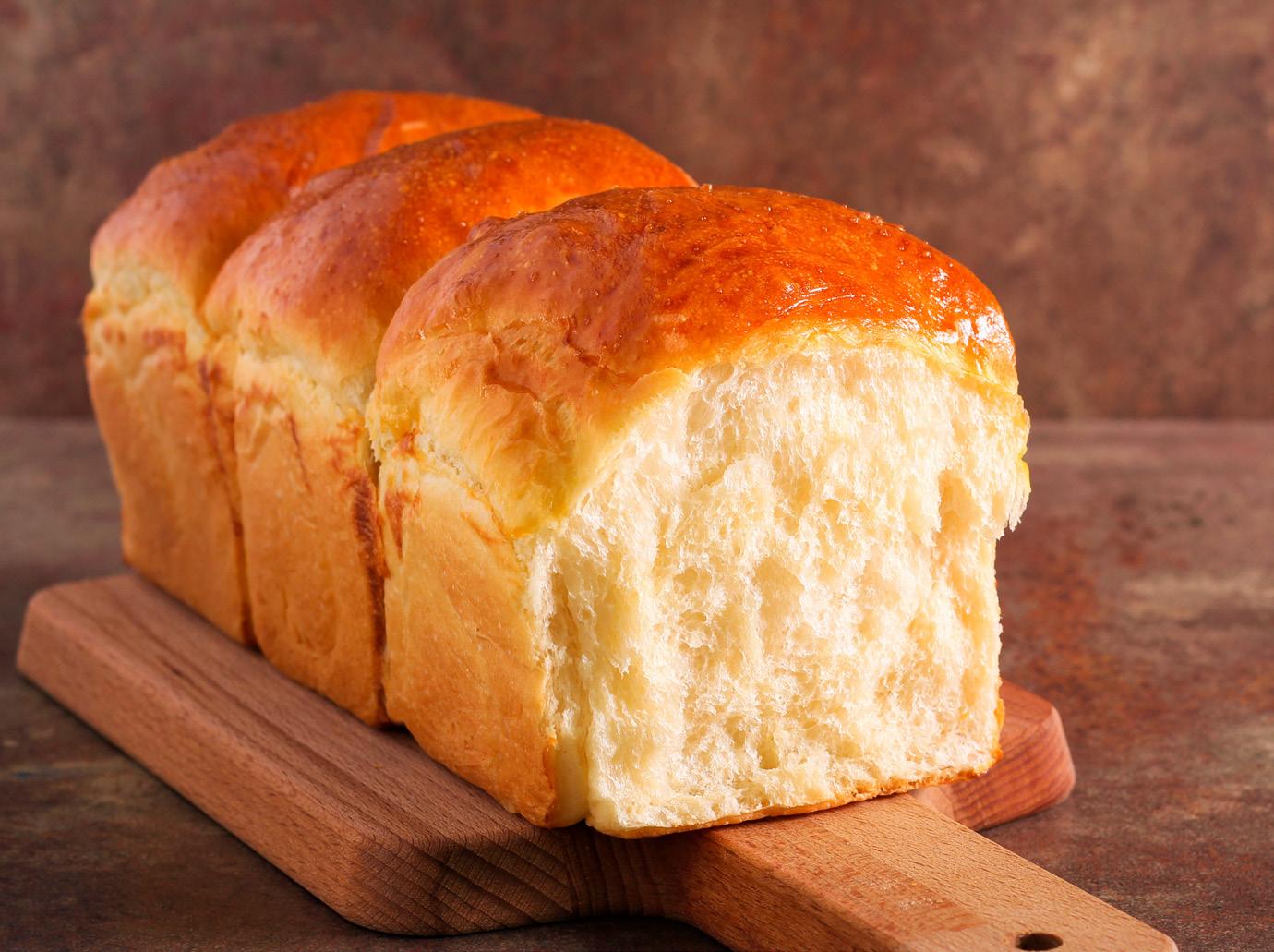
require significantly different hurdles than one with low water activity.
“When you think about baked goods, products like crackers and biscuits are low moisture and have low water activity, so you don’t need nearly as many hurdles or mold inhibitors like bread does,” Reusser said. “Bread, tortillas, buns on the other hand … those all are very high moisture and have high water activity. They also have a lot of surface area, which essentially creates a petri dish for mold to grow. Those types of products in particular really benefit from multiple hurdles.”
Extrinsic factors are just as — if not more — important in hurdle technology. In fact, before defining hurdles based on individual properties, it’s paramount to first address sanitation and process controls.
“You want to have a good sanitation program because no amount of mold
FEBRUARY 2023 Q1 52 HURDLE TECHNOLOGY
Understanding the shelf life behavior of a product requires knowledge of characteristics including water activity and surface area.
© manyakotic on Adobe Stock
NO MATTER HOW YOU


AB MAURI IS HERE
Whatever your challenge or opportunity is, the technical baking team at AB Mauri North America is ready to help. We understand what it takes to succeed in today's baking industry as we prepare for what the world looks like tomorrow. We play our part so you can bake yours.
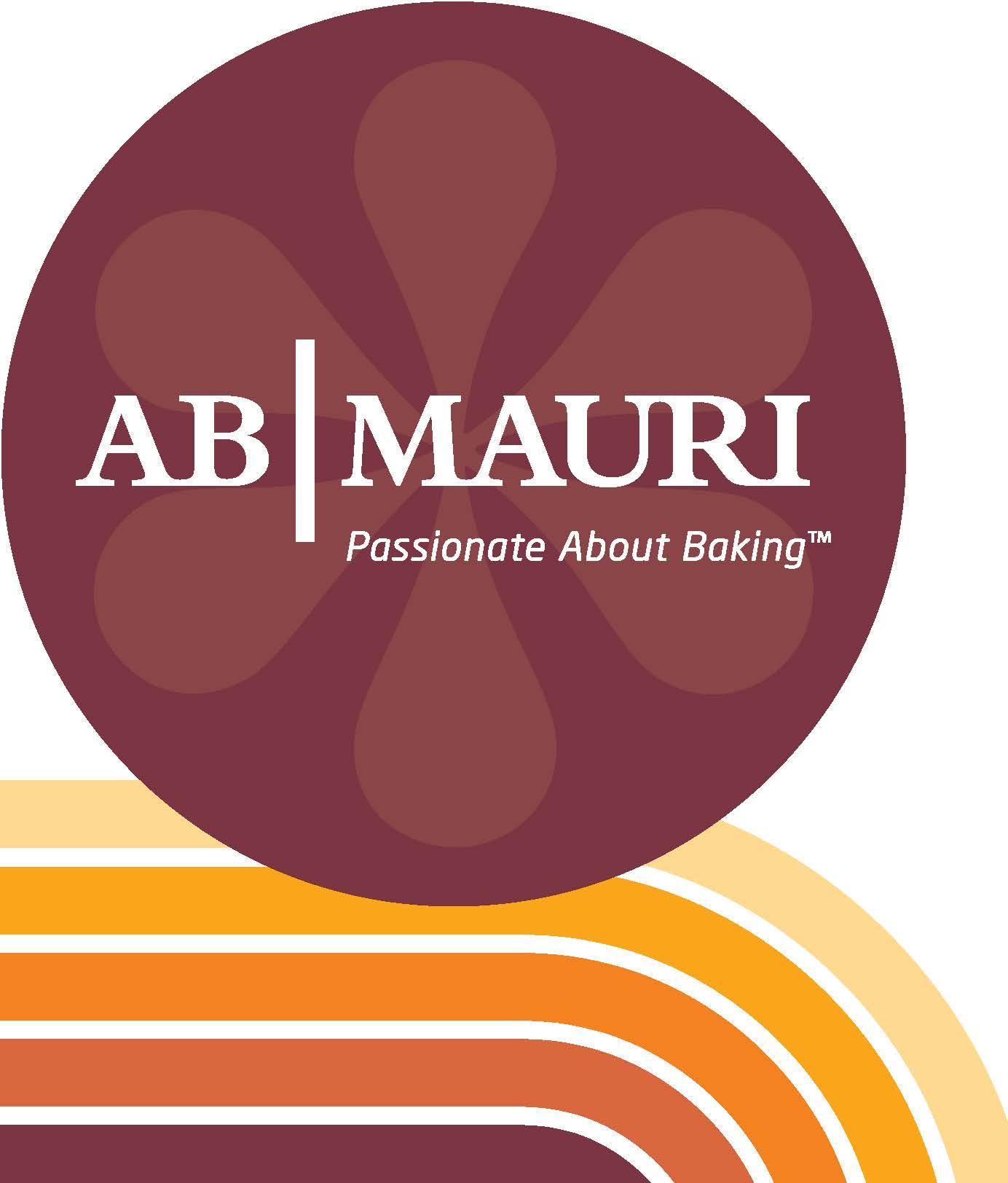
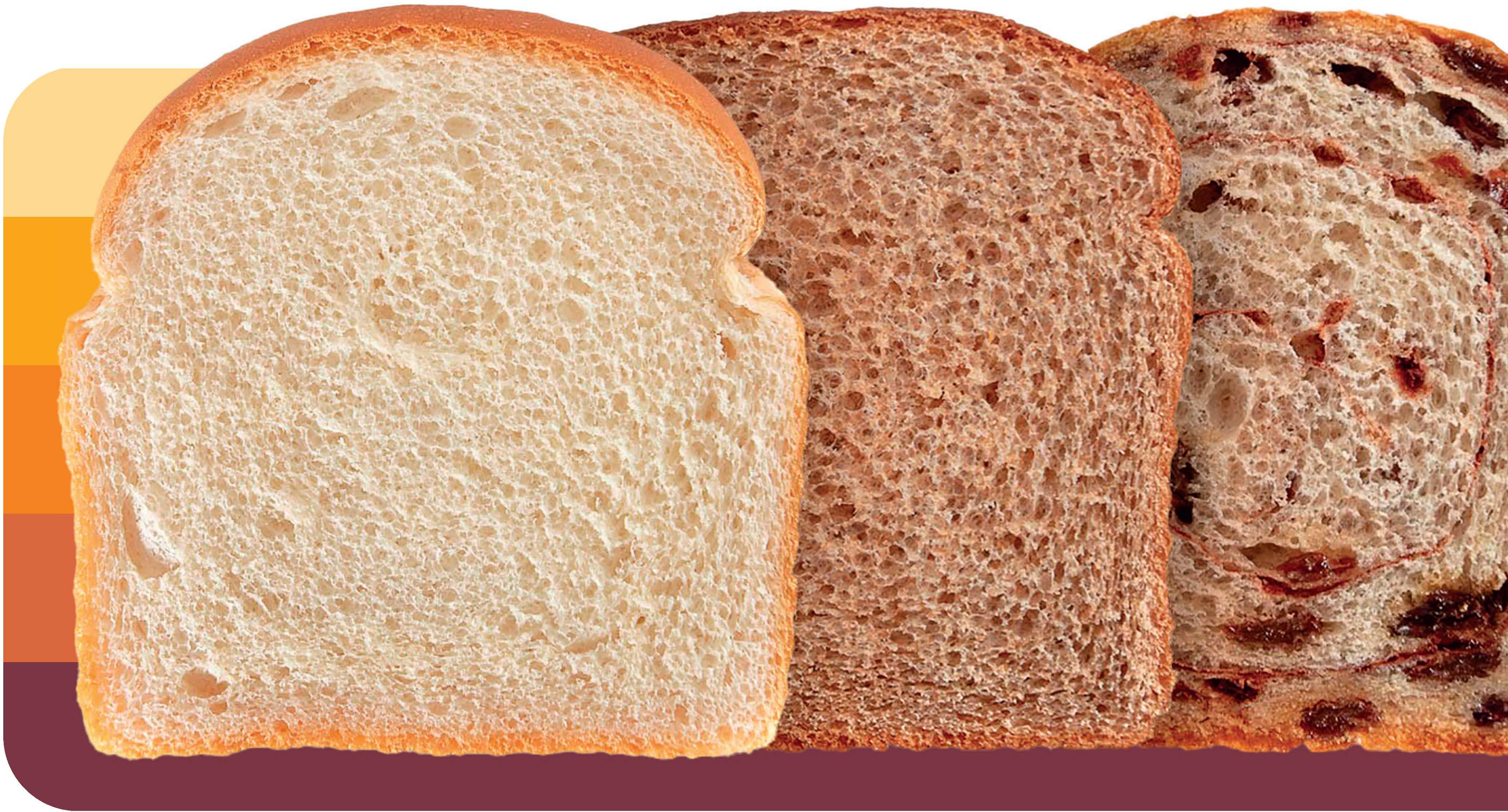


IJIm 02023 AB Mauri Food Inc.
abmna.com · 1.800.772.3971
inhibitor or anything you do to the product is going to do a hill of beans if you don’t have the proper sanitation,” Reusser said.
Sargent also noted sanitation is key.
“You have this really great kill step in the oven, but you still must control the raw materials and manufacturing environment, ensuring it is as clean as possible,” she said. “The post-bake environment is critical because once a product comes out of the oven, you still have to manage exposure through cooling, slicing, packaging, and, for some products, filling and coating.”
According to Reusser, one of the biggest threats to any bakery in terms of spoilage is time.
“After baking, once the product is exposed to the air, it starts accumulating mold,” he said. “So, environmental hurdles need to be considered as well.”
Properly cleaning and treating equipment, managing air flow, and following strict hygiene practices must all be a part of the equation.
When it comes to new product development, Unruh said hurdle technology allows for a better understanding of a product’s characteristics. Bakers will want to think about what hurdles they can institute to work in tandem with those that are already occurring naturally to create an optimal shelf life for a particular product.
“If, during the product development process, you’re able to do more acidification to result in a lower pH, or you are able to understand the product’s water activity, or you have the opportunity to add in an antimicrobial,
you’ll be able to better understand the tradeoffs to incorporating those hurdles,” Unruh said. “In turn, you’ll be able to create a product that will not only be satisfying for your customer from a taste perspective but will perhaps also have a more extended shelf life and have those desirable organoleptic properties.”
Sargent said she sees a considerable amount of innovation happening with hurdles alone in terms of what types of treatments can be applied in different environments.
“The possibilities are endless for innovation,” she explained. “An example could be a preservative treatment that’s not pH dependent. As a result, we might now be able to formulate our products at a different pH and that might improve other ingredients’ functionality, flavor and quality. If you remove limitations we have managed for years, we may have the ability to better optimize across the board.”
Packaging is an essential hurdle for most bakery items, and Sargent said she’s interested in the considerable innovation happening in that area. One innovation to consider is active packaging, which interacts directly with the food or food environment to prolong shelf life and protect quality.
“With some of these innovations, bakers can influence the micro load that is in the package without having to add additional ingredients,” she said.
While freshness remains a top priority for consumers, there is increasing demand for better-for-you food options with clean labels and minimal processing. And that growing demand presents new challenges for commercial bakeries.
Source: US Department of Agriculture
“Historically, the baking industry has been very successful in managing pH, water activity and a level of preservation,” Sargent said.
Hard-to-pronounce or chemical-sounding ingredients are concerning to consumers reading labels. Unfortunately, this is the case for some of the preservatives used in the commercial production of breads and baked goods.
Unruh said the clean label trend is spurring research into new shelf-lifeextending ingredients that appeal to an increasingly discerning consumer.
“Calcium propionate used to be the standard mold inhibition ingredient in yeast-raised baked goods, but when the clean label movement really started to gain momentum, a lot of people started to look into ferments (microbes fermenting similar acid profiles to those in calcium propionate) and using those as mold inhibitors instead,” he said.
There are a number of natural mold inhibitors already gaining traction, and more innovation is on the way.
According to “How the Clean-Label Mega Trend Is Changing the Food
FEBRUARY 2023 Q1 54
HURDLE TECHNOLOGY
Food waste in the US is estimated at 30-40% of the food supply.

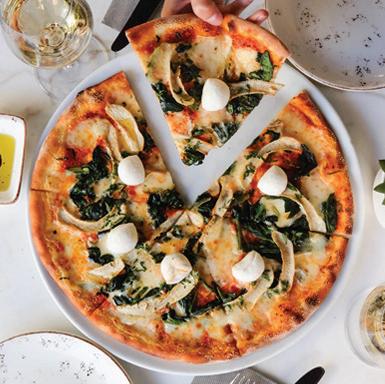



BAKERY SOLUTIONS Some formulas don’t perform as expected and require a custom solution. We blend dry, clean-label ingredients for bakery formulas that improve performance issues. www.repcoworld.com Extended Shelf-Life Volume Strength Stability Stretch & More
Create Baked Goods That Last
Ingredients Landscape,” a 2019 report from L.E.K. Consulting, some of the top ingredients dominating the clean-label food market include natural mold inhibitors such as sorbic acid, stevia, food enzymes, and fruit and vegetable pieces and powders.
One of the biggest challenges in developing clean-label products, of course, is the potential impacts to appearance, taste and texture, and it’s up to bakers to find the combination of hurdles that help them strike that optimal balance.
“Consumers expect products that are simple and more natural, but they also want products that last,” Sargent said. “With the right technology, we can satisfy both, but it creates an ambitious challenge, and it’s going to require the industry to stretch their thinking around bakery.”
Because hurdle technology has a direct impact on the shelf life of breads and baked goods, new innovations could also have a significant impact on food waste. According to the US Department of Agriculture, food waste in the US is estimated at between 30-40% of the food supply.
“Any time we can be more efficient at getting products to market and into consumers’ hands — and then helping them to be stable until they’re ready to be consumed — the better,” Sargent said. “An extended shelf life gives us more flexibility and reduction of waste as we work through manufacturing and distribution.”
Hurdle technology might also offer opportunities for bakers to repurpose products that don’t meet quality standards but don’t pose any health hazards. For example, if a loaf of bread didn’t meet
certain texture standards but could be repurposed for another use such as breadcrumbs or French toast, having the technology in place to ensure the safety of the repurposed product would allow bakers greater flexibility.
Despite the considerable benefits, there are still potential risks for bakers to keep in mind.
“Hurdle technology as a combined approach tends to mitigate some risks as opposed to creating them, but as with any technology, it’s important to understand the impact,” Sargent advised.
She said bakers should weigh the environmental impacts — understanding carbon emissions or energy outputs — of particular hurdles, as well as any possible safety risks and mitigation techniques for associates in production.
“Hurdle technologies are great, and the theory is sound, but you still need to determine your level of risk,” Unruh said. “You can do that by utilizing p redictive modeling, through literature or you can run a challenge study, which is the gold standard. It’s important to validate those hurdles.”
He also advised seeking expert guidance when implementing hurdle technology. He recommended consulting first with an experienced microbiologist who has the knowledge and modeling capabilities to understand the interaction of different antimicrobials to ensure optimal results.
As with any innovation, there’s still much to unlock with hurdle technology. But it shows promise for the future of developing safe, delicious baked goods with the extended shelf life consumers are seeking. CB
FEBRUARY 2023 Q1 56 HURDLE TECHNOLOGY
“Historically, the baking industry has been very successful in managing pH, water activity and a level of preservation. Now, if we’re trying to be as ‘clean label’ as possible, that’s creating both new obstacles and opportunities.”
Kathy Sargent | senior director of technical services | BBU
Our Essential® portfolio is composed of clean label proprietary enzyme-based blends formulated carefully with specially selected enzymes, providing solutions with built-in tolerance to avoid overdosing. These solutions can be used to replace the functionalities of baking ingredients such as gluten, DATEM, SSL, and mono- and diglycerides.

From baker's yeast to enzyme-based baking solutions, Lallemand Baking's fermentation-based products are infused with science and innovation.
Lallemand Baking: Your partner and supplier of innovative baking solutions.

-------------• IAiiiiw.ill.!ii,. «fifoRIW> LALLEMANDBAKING
FSAIJ!DI
Essential.
Essential®
USA +1 800 687 6483 or +1 901 547 1579 Canada +1 800 840 4047 or +1 514 522 2133 Mexico +1 800 710 4856 or +52 552 6205300 www.lallemandbaking.com baking@lallemand.com
SANITARYSLICINGANO PACKAGINGFORSOFTBREAD, Bl/NS, ANOMORE


For high-speed, reliable packaging solutions, AMF PackTech delivers sanitary solutions for bun, roll, and bread slicing and bagging, and bulk bun packaging. The recipe-driven Saber 75S Slicer and Mark 75S Bagger improve the packaging process by introducing a series of automated adjustments that eliminate operator intervention, improve product consistency, and ensure operator safety. Plus, the new design offers easy access for simple, safe sanitation and maintenance. All PackTech equipment is engineered with reliability in mind for simple operation to ensure optimal package quality and extended product shelf life.


BAKERY SYSTEMS A Markel Food Group Company Scan to learn more AMFBAKER�COM I SALES@AMFBAKER�COM © 2023 AMF Bakery Systems
USA I Netherlands I UK I China I Singapore I Canada I Mexico
Perimeter paving the way
Bread/Bun/Roll Dollar Sales
Bread/Bun/Roll Unit Sales
Resourcefulness can be the mother of invention, and bread’s simple recipe is a medium known to provide just that. Bread in its many forms — loaves, slices, buns, rolls and more — offers consumers a multitude of ways to make mealtime and snacks less predictable. This is pa rticularly important as hybrid work schedules reign supreme for many. A shopper survey conducted by IRI found both at-home and in-office workers primarily source their afternoon meal from home, creating a positive impact on the bread/bun/roll category.
While leftovers still top the list of lunchtime choices, sandwiches are increasing in popularity, winning in dollars and volume in 2022. The preference for both lunch options serves as evidence that consumers are not only prioritizing their spending, but they are also seeking a balance between cost savings and the desire to eat more healthfully.
IRI shared that in October 2022, 48% of school lunches were packed at home, and 38% of those working away from home packed a lunch more often, too.
With consumers eating most of their meals at home, the humble — or perhaps not-so-humble — sandwich remains a winner in the category. Those who look to recreate a restaurant-like experience at home are finding products such as Sara Lee Artesano Bakery buns, rolls and bread to replicate a dining out experience for less. In fact, center-store breads were a Top 4 category in the fresh foods market, as far as dollar sales growth.
CATEGORY OUTLOOK: BREAD | BUN | ROLL
59
CENTER-STORE BREADS CENTER-STORE BUNS | ROLLS PERIMETER BREADS PERIMETER BUNS | ROLLS DOLLAR SALES ($ IN BILLIONS) % CHANGE VS. A YEAR AGO $10.02 $5.01 $1.46 $0.97 12.0% 10.3% 7.7% 13.2% Source: IRI OmniMarket Integrated Fresh | Latest 52 Weeks Ending Jan. 1, 2023 COMMERCIAL BAKING
CENTER-STORE BREADS CENTER-STORE BUNS | ROLLS PERIMETER BREADS PERIMETER BUNS | ROLLS UNIT SALES (IN BILLIONS) % CHANGE VS. A YEAR AGO 3.20 1.72 0.54 0.45 -0.7% -4.1% -3.2% 0.5%
Current dollar sales for center-store breads and rolls were $17.78 billion, an increase of 11.4% vs. a year ago. This was also one of the few categories to be flat in units, rather than declining.
Within the overall bakery category, consumer interest remains in better-foryou (BFY) attributes as more people seek to improve health and wellness through everyday choices. The fastest growing BFY attributes include non-GMO, vegan, all-natural, protein and the absence of negatives such as low carb, no artificial sweeteners, no preservatives, low sugar and gluten-free.
The Horsham, PA-based Bimbo Bakeries USA portfolio of BFY breads has shown strong dollar and unit growth rates. These include the basic, yet nutritious, 45-calorie, whole-grain Sara Lee Delightful and Rustik Oven Artisan Bread made using a traditional European baking process.
Thomasville, GA-based Flowers Foods’ Nature’s Own Perfectly — touting no artificial preservatives, colors or flavors, no HFCS and nonGMO ingredients — also showed strong dollar and unit sales growth in 2022.
“Consumers are willing to pay premium for breads with natural and healthy positioning,” said Melissa Altobelli, principal, strategic solutions group for IRI. “Manufacturers need to make their bread labels easy to understand. It’s not enough to just make a claim. The next generation of products will need to provide naturalness.”
For some manufacturers, supply chain disruption and steep inflation have triggered changes in package size. However, in the bread, bun and roll categories, this hasn’t manifested in a reduction of overall ounces to mini -
mize price increases like it has in other categories, Altobelli noted. She hypothesized that’s because a sandwich, hot dog or hamburger can be a cheaper alternative to ordering in or eating out. According to IRI, hamburger buns, hot dog buns and sandwich bread were the top products in the center-store breads and center-store buns and rolls categories, respectively. One signifier is that category units have remained stable, so manufacturers likely haven’t felt the immediate pressure to make changes in size counts.
Similarly, consumers are making their own financial changes in response to inflation, especially with price-per-unit increases in perimeter and center-store up over 10% vs. a year ago for the category as a whole according to IRI.
Source: IRI OmniMarket Integrated Fresh | Latest 52 Weeks Ending Jan. 1, 2023
CATEGORY OUTLOOK: BREAD | BUN | ROLL
60
FEBRUARY 2023 Q1
Although center-store breads and rolls saw $17.78 billion in sales and 11.4% growth from last year, the category was flat in unit sales.
to meet your bun/roll needs.

Pair any number of our slicers with the level of bagger to meet your bun/roll packaging needs.




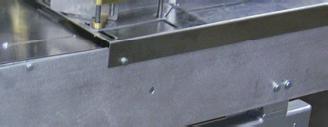














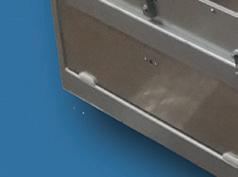









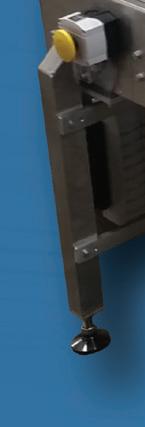

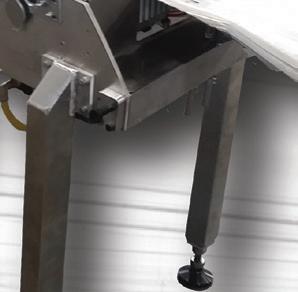





Hand Bagger
loaded with a 110v blower motor for wicketed
Great for clustered or very firm products can










































Simple spring loaded design with a 110v blower motor for wicketed bag inflation. Great for clustered or very firm products. Average operator can operate bag between 10 and 25 bags/min.
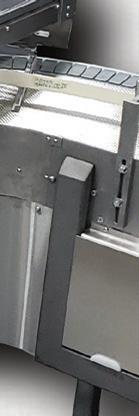
Deluxe Hand Bagger
Air operated retractable tuckers designed for a more positive bag hold. This works great for really soft or hard to hand bag products. Uses compressed air. Average speeds run between 10 and 25 bags/min.



Model B Bagger
This is a hand-loaded automatic bagging system. Operators load flights with product as they pass by. Allowing for the bagging of most items with ease at average speeds of 30 to 55 bags/min.
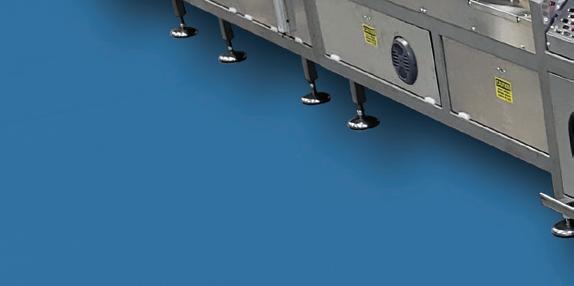
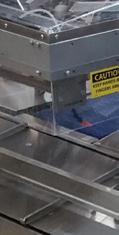


BSI ALPS























Fully automated line that groups, slices, stacks, and bags most types of buns/rolls at average speeds of 35 to 55 bags/min. High Speed option allows for speeds up to 66 bags/min. Not all products run at the same speeds.


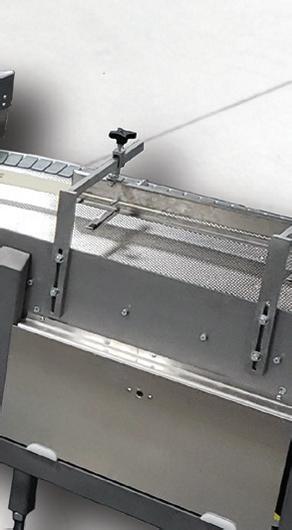
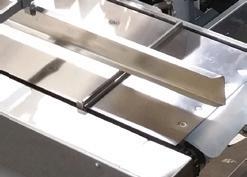


Bettendorf Stanford sales@bettendorfstanford.comwww.bettendorfstanford.com
These changes include looking for sales/deals and cutting back on nonessential purchases. Because bread is prized for its freshness, there is little stocking up when it comes to its purchase, with the exception of some promotional deals in-store. Promotions will likely be more targeted at retail to retain primary shoppers, as opposed to swaying them through competitive deals, Altobelli said.
“Consumers are looking for sales and deals,” she continued. “Bakery promo is rebounding, but it still hasn’t reached pre-pandemic levels. I suspect that will change as inflation drags on. In the meantime, it will be necessary to appeal to those consumers who are trying to make ends meet.”
Such inflationary juggling can also come in the form of trading down from a premium option to a private label alternative. Switching to a loaf with a higher slice count or half-loaf are also potential alternatives, though the halfloaf concept has not yet fully taken off. There is also a little degree of switching from fresh bread to frozen varieties that are typically flourless/low glycemic and garner a premium price.
After multiple years of soaring sales, the glory days of center-store bread may be fading. Perimeter bakery had the better year in 2022 as far as units, but center-store bakery fared better in terms of dollar sales. Center-store bread units were flat in 2022 at 3.20 billion but were down — 536 million — in perimeter. The opposite was true for buns and rolls, with units down in the center-store at 1.72 billion but up in perimeter at 450.60 million.
“In December, perimeter unit declines were on par with center-store, so unit sales appear to be leveling out, perhaps
Top Center-Store Sandwich Bread by Dollar Sales
CATEGORY OUTLOOK: BREAD | BUN | ROLL
1 2 3 4 GRUPO BIMBO $2.87 BILLION FLOWERS FOODS $2.56 BILLION PRIVATE LABEL $1.30 BILLION CAMPBELL SOUP CO. $0.72 BILLION 5 LEWIS BAKERIES, INC. $0.32 BILLION 62 FEBRUARY 2023 Q1
Source: IRI OmniMarket Integrated Fresh | Latest 52 Weeks Ending Jan. 1, 2023
Baker Approved!







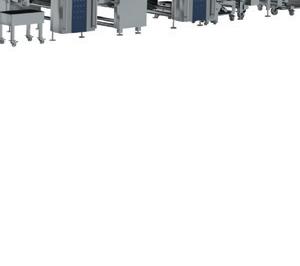


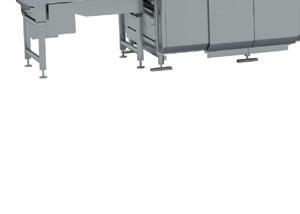






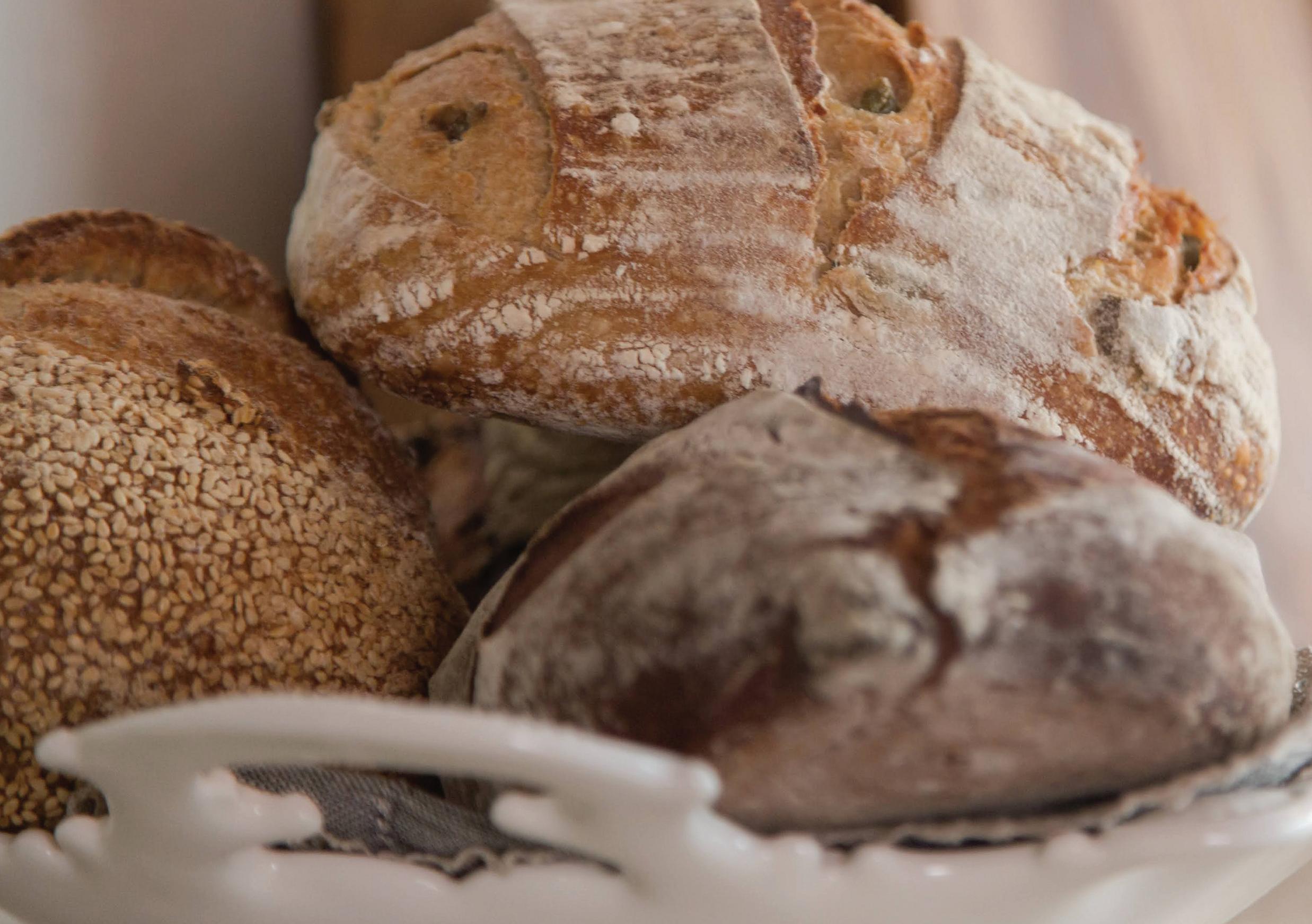
finally overlapping the low post-COVID period,” Altobelli said.
To put this in context, center-store bakery categories were heavily promoted in years past, which contributed to unit decline, Altobelli continued. Likewise, consumers looking to indulge by purchasing more premium buns and rolls in lieu of dining out is likely a contributing factor of success in the perimeter. This is reflected in the 13.2% increase in dollar sales for perimeter buns and rolls vs. a year ago, according to IRI. Dinner rolls, sandwich buns and specialty rolls topped the perimeter

buns and rolls segment, accounting for three-quarters of the dollar share.
In such an environment, it is more likely consumers will consider an impulse purchase in their increased trips to the store, walking through the perimeter to supplement a quick meal or snack. The perimeter bakery, which tends to be a high-traffic area, is the perfect place to capture the interest of those looking for deals.
While bread will always be a staple, the breadth and depth of the category also leaves plenty of room for extraordinary
experiences. Altobelli recommends that in addition to practicality, bread manufacturers remember the emotional elements of eating and the fun of partaking in a delicious treat.
Bread plays a starring role in the ever-changing lives of consumers. Whether they work from home or return to the office full-time, people will contniue to rely on the convenience and consistency of this category. Manufacturers would be wise to keep the increased interest in premium and perimeter goods as well as staple buns in mind for the year ahead. CB
Center-Store Buns | Rolls By
CATEGORY OUTLOOK: BREAD | BUN | ROLL 64 FEBRUARY 2023 Q1
DINNER ROLLS: 23.9% ALL OTHER BUNS | ROLLS: 0.4 %
While hamburger and hot dog buns dominate the center-store buns | rolls segment, units have remained stable, reducing immediate pressure for manufacturers to change size counts.
Dollar
Source: IRI OmniMarket Integrated Fresh | Latest 52 Weeks Ending Jan. 1, 2023 HAMBURGER | HOT DOG BUNS: 58.6% SANDWICH BUNS: 15.7% SPECIALTY ROLLS: 1.4%
Share





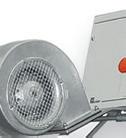
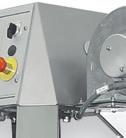




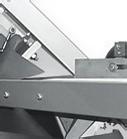
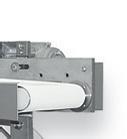
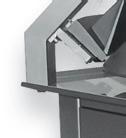



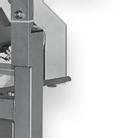
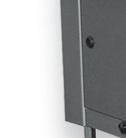



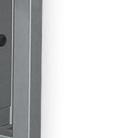

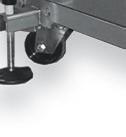
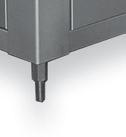

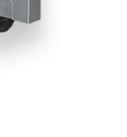



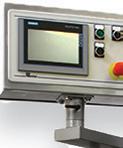
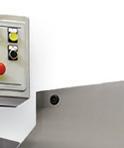
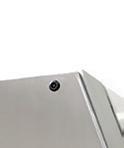


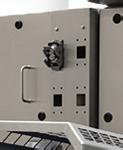



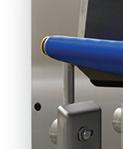


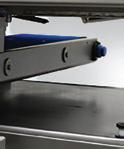


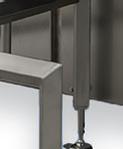


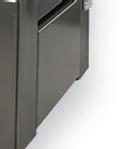









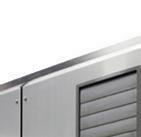


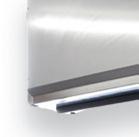

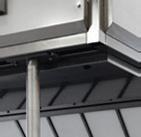
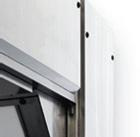

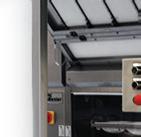
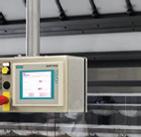


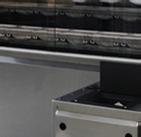
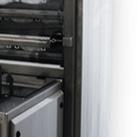

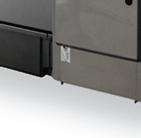
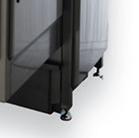

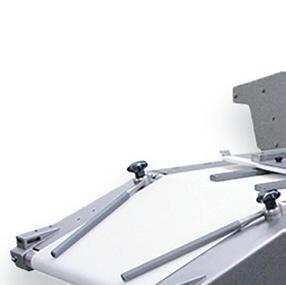
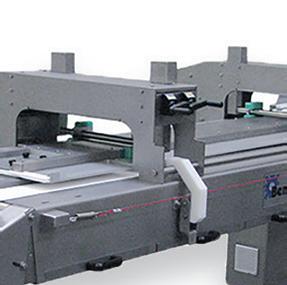
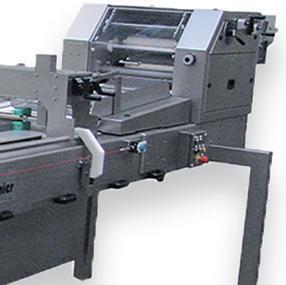



New Name, Same Great Products. Solutions for Your Bakery Mixers, Dividers, Rounders Pre-Proofers, Molders, and more. IS NOW Best Lead Time 24/7 Local Service and Support Clean Design Line Integration Sustainable Development Goals www.Kaak.com Rounders Dividers Pre-Proofers Molders Contact Johan Laros at jlaros@kaak.com
Vision Guided Robotics | Secondary Packaging | Turnkey Packaging Solutions











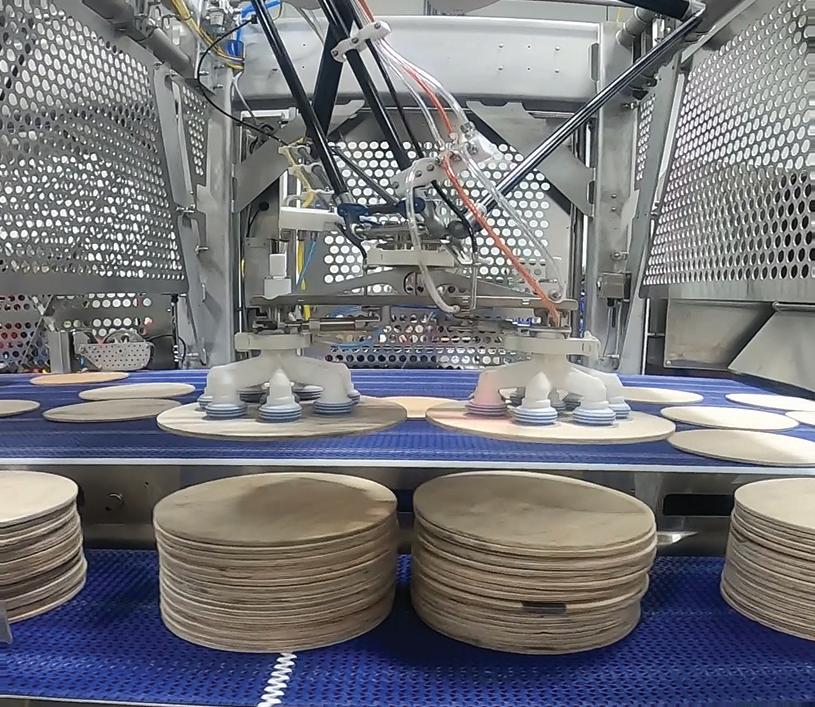

























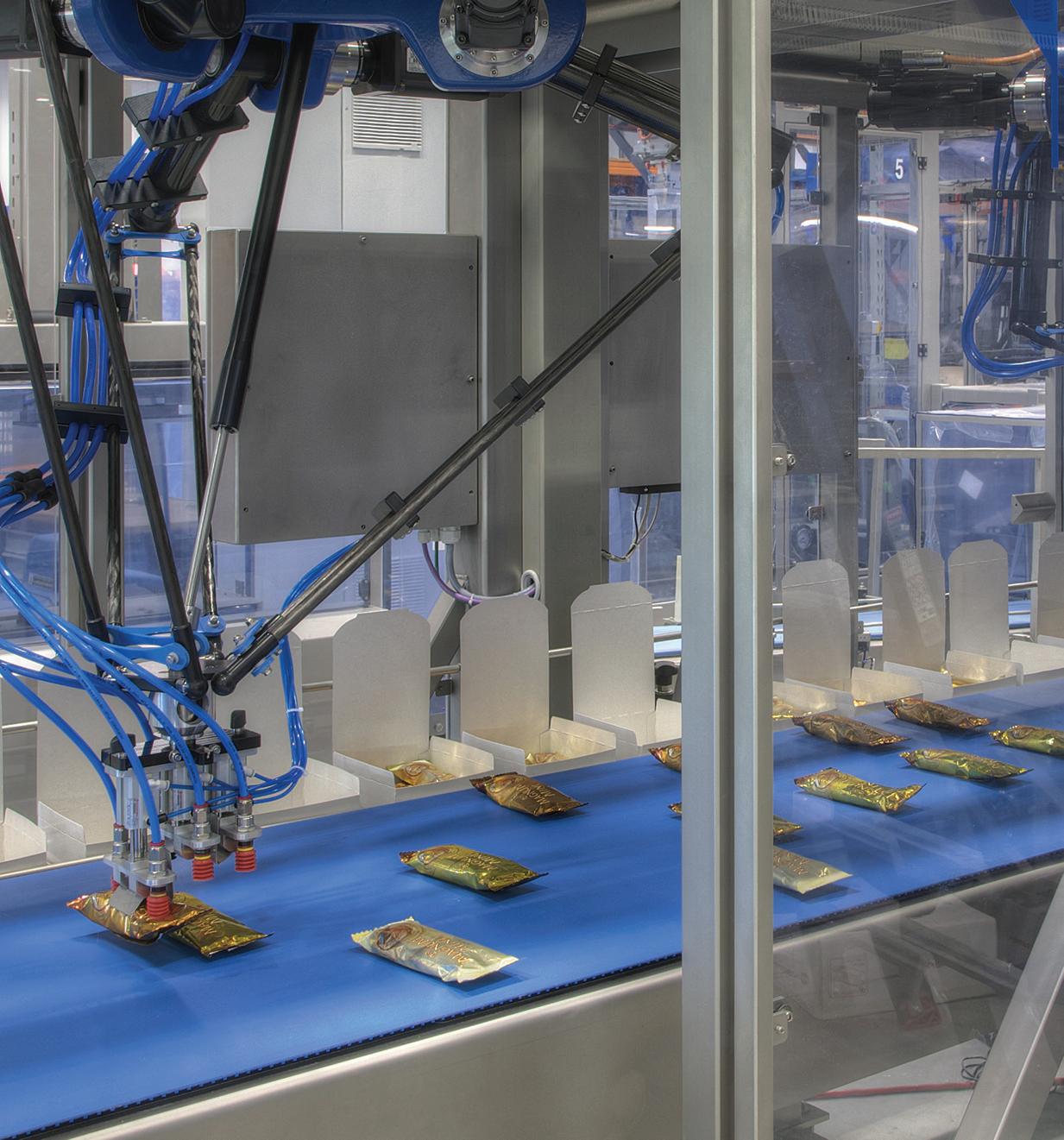










You make it. We it. End of line solutions for the bakery, snack and tortilla



BPA loads your and naked into cases and various secondary containers including your hffs machines, wrapper chain in-feeds and thermoform machines




You make it. We pack it. End of line packaging solutions for the bakery, snack and tortilla industries. BPA loads your packaged and naked products into cases and various secondary containers including your hffs machines, wrapper chain in-feeds and indexing thermoform machines.
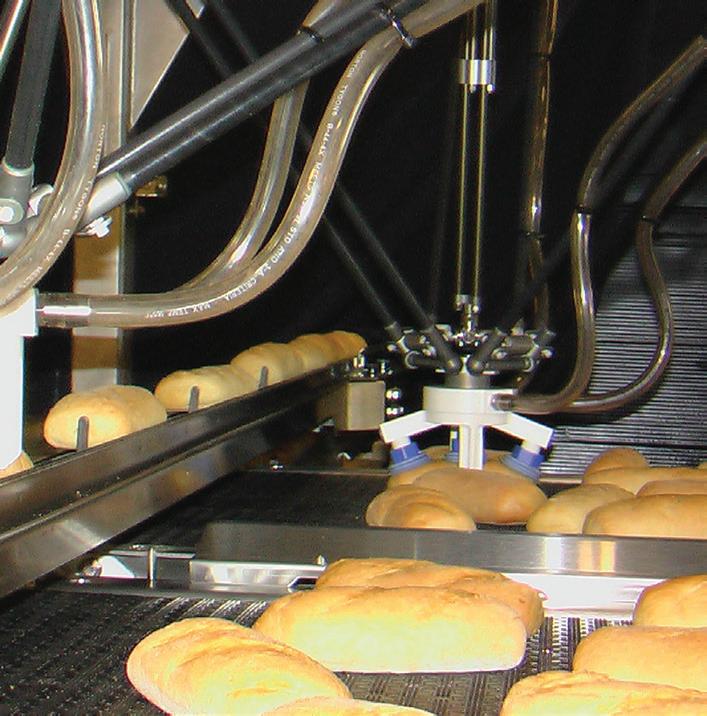

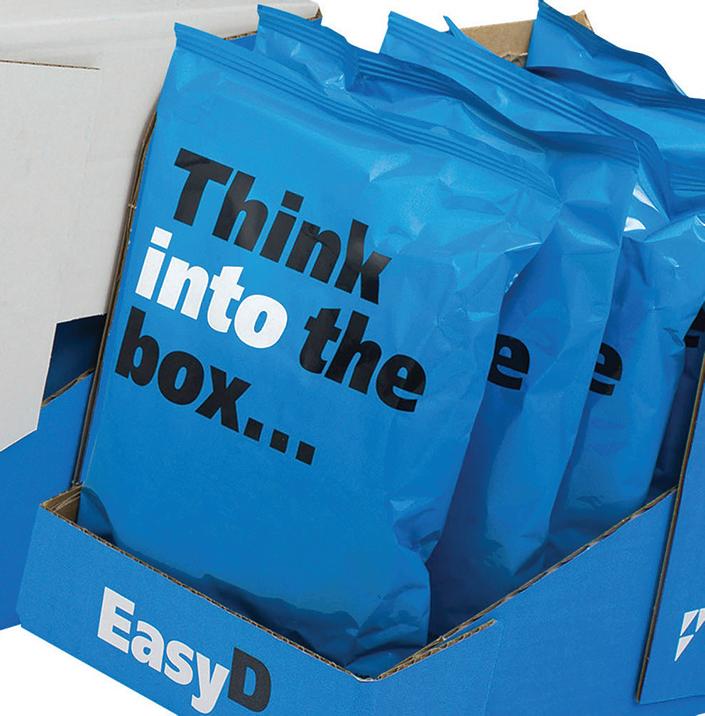
blueprintautomation.com
Scan For Video SNAXPO 1031
carton loading
case packing
stacking
shelf ready
wrapper loading
multipacks
Functionality meets convenience
The goal of good health has become far more than a New Year’s resolution. For many, the health-related scares of the COVID-19 pandemic left a lasting impression — one that’s brought everyday health and wellness to the forefront of consumers’ minds. The result is an increasing demand for better-for-you (BFY) bars for busy lifestyles.
Bars featuring functional benefits such as added protein, less sugar and fewer carbs are proving to be just the ticket. BFY attributes accounting for the most dollar sales include natural, protein, sugar, gluten-free, non-GMO and energy. Some up-and-coming BFY attributes include calcium, heart-health claims, immune defense and no artificial sweeteners, although, relatively speaking, they are not largely impacting sales.
Following taste, protein is the secondmost sought-after attribute in bars. Protein claims account for more than one-third of total bars dollars, according to IRI. Within nutritional/ health bars, protein claims accounted for more than 70% of dollar sales. Protein also showed significant growth with snack bars and was a likely driver of snack bar shares in 2022.
CATEGORY OUTLOOK: BARS 67 COMMERCIAL BAKING
70%
Source: Mintel
Within nutritional/health bars, protein claims accounted for more than of dollar sales.
Snack bars offer consumers a potentially more affordable and family-friendly way to get their protein outside the nutritional/health bar segment, which is already premium priced and most impacted by inflation.
Emeryville, CA-based Clif Bar & Co., acquired by Mondelez International in August 2022, remains the largest player in health bars. Known for its dedication to athletics, the company saw 6.3% dollar growth in the latest 52 weeks ending Jan. 1, 2023, according to IRI, but experienced significant unit losses, underperforming vs. the segment. Standouts in terms of dollar and unit growth for the brand included Clif Kid Z Bar, Clif Builders 20g Protein Bars and Clif Duos, which combine two favorite Clif Bar flavors in one smaller energy bar.
The No. 2 player, El Segundo, CA-based Quest Nutrition, also showed strong double-digit dollar growth while maintaining units. Quest is known for its indulgent flavors that uphold nutrition criteria with claims of low carbs and sugar, as well as higher fiber and protein. Other smaller players driving dollar and unit growth include Power Crunch protein bars, FitCrunch bars from celebrity chef Robert Irvine, and the Met-Rx protein bar featuring the Metamyosyn protein blend. Category disruptor Park City, UT-based Kodiak Cakes demonstrated strong dollar and unit growth in 2022 with its protein-enhanced Kodiak crunchy granola bars.
While the simple granola bar is often thought of as the original bar, Minneapolis-based General Mills retains its title as reigning leader. The company’s bar portfolio includes Nature Valley and Quaker Chewy, and while both showed strong dollar sales growth in 2022, they had a 6-7% unit sales decline.
Total Bars | Squares Dollar Sales
Total Bars | Squares Unit Sales
Quaker Chewy saw pockets of unit growth with its Chewy Yogurt and newer Fruity Fun and Mini Dips, but it failed to offset decline across core sub brands. Newer players enjoying strong growth as a result of distribution gains include MadeGood bars, which are vegan, organic and free from the most common allergens, and Junkless bars, made with clean, non-GMO ingredients.
Smaller formats in the form of bites, thins and clusters further encourage on-the-go convenience and snacking with some well-known favorites. Battle Creek, MI-based Kellogg Co., a longtime leader in the snacking space, enjoyed strong dollar growth in 2022 in its bar offerings. Its largest brand,
FEBRUARY 2023 Q1
CATEGORY OUTLOOK: BARS
Source: IRI OmniMarket Integrated Fresh | Latest 52 Weeks Ending Jan. 1, 2023
68
PERIMETER CENTER-STORE DOLLAR SALES ($ IN MILLIONS) % CHANGE VS. A YEAR AGO $14.91 $8.73 9.3% 31.2%
CENTER-STORE PERIMETER UNIT SALES (IN MILLIONS) % CHANGE VS. A YEAR AGO 3.89 3.51 -14.8% -0.7%
Forget trying to integrate incompatible automation platforms from multiple suppliers. Get everything you need for fully automated bakery packaging from Harpak-ULMA instead. With your low total cost of ownership in mind, our row distribution systems, high-speed feeders, tray/carton formers & closers, applicators, loading systems, robotics and palletizers all operate flawlessly to fit the way you work. Package after package, time after time. Every smart, connected G.Mondini and ULMA packaging platform utilizes Rockwell Automation’s Integrated Architecture to reduce solution complexity and maintenance costs, while realizing better quality, capacity, and throughput.



































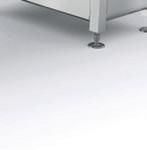

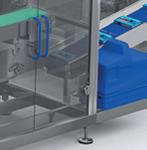
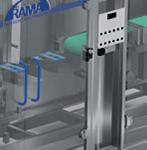
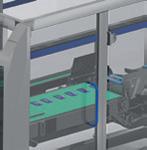
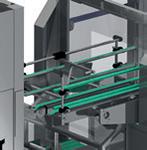
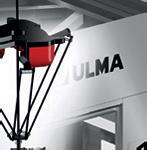

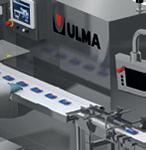






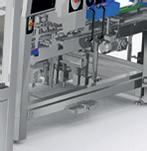
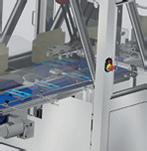
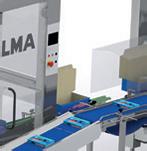

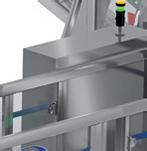



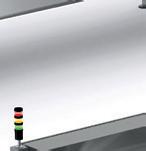

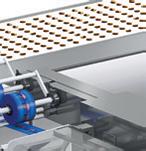

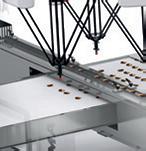
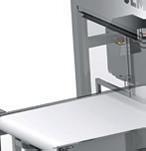

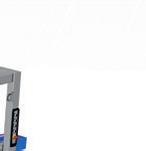
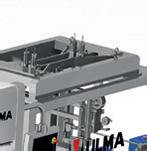
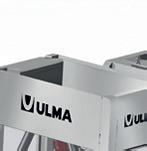

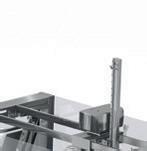

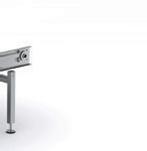

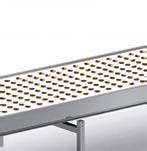
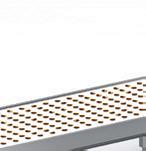





































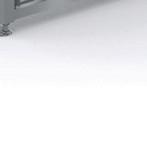







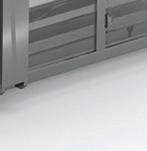
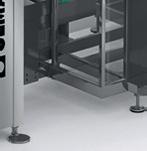
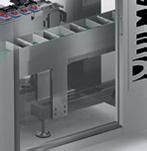
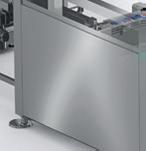










If you’re looking for a way to stay focused on the environment, bring f you’relookingforawaytostayfocusedontheenvironment,bring automated management of your baskets into the picture. Reusable plastic utomatedmanagementofyourbasketsintothepicture.Reusableplastic containers (RPC’s) not only reduce carbon emissions, waste, and natural ontainers (RPC’s)notonlyreducecarbonemissions,waste,andnatural resource consumption, they offer excellent product protection. esource consumption,theyofferexcellentproductprotection.

















































































© 2023 Harpak-ULMA Packaging, LLC, 85 Independence Drive, Taunton, MA 02780 USA You Bake It, We Take It from There! Complete, product to pallet automated packaging lines can help meet all of your bakery packaging requirements. Increase Throughput Increase Productivity Create a Safer Work Environment Contact Harpak-ULMA today to find out more! HARPAK-ULMA.COM • 800-813-6644
Rice Krispies, continues to explore trends that address consumer interest in smaller, grab-and-go formats while staying true to its indulgence roots with 50% larger “homestyle” treats. Kellogg’s also launched Nutri-Grain Bites to help consumers “come prepared” for breakfast on-the-go or snacking throughout the day.
New York-based Kind Snacks, the second largest player in snack bars, showed strong dollar growth in 2022 with its KIND Minis, KIND Breakfast Protein, KIND Clusters and new KIND Thins bars.
Reno, NV-based Nature’s Bakery also showed strong dollar and unit sales growth last year.
“Nearly 55 percent of adults snack two to three times a day,” said Melissa Altobelli, principal, strategic solutions group for IRI. “Because of their size and convenience, bars are well positioned to accommodate consumers who are looking for better-for-you nutrition and who want to limit sugar and carbs.”
Certain demographics tend to gravitate toward that type of convenience. Hispanic consumer engagement in the bars category is strongest within the snack bar segment, although this demographic significantly over-indexes in the meal replacement and weight-loss bar segments.
“This indicates busy Hispanic parents are reliant on the bars category, not just as snack solutions for their typically larger households inclusive of multiple children but also as convenient nutrition for themselves,” Altobelli said.
Mintel found four in 10 parents in the US bought more bars in 2022. This was particularly true among dads, who are
Top Important Attributes for Bar Purchases, 2022
Source: Kantar Profiles/Mintel November 2021
CATEGORY OUTLOOK: BARS
70 FEBRUARY 2023 Q1
Users ranked up to three in order of importance, with one being most important
38% Flavor 37% Protein amount 30% Sugar amount 29% Calories 25% Low price 22% Fiber amount 21% 18% Brand name
No artificial ingredients
Protein source (E.G. WHEY, PEA)
source (E.G. SUGAR, STEVIA) Short
list
18%
12% 12%
Sweetener
ingredient
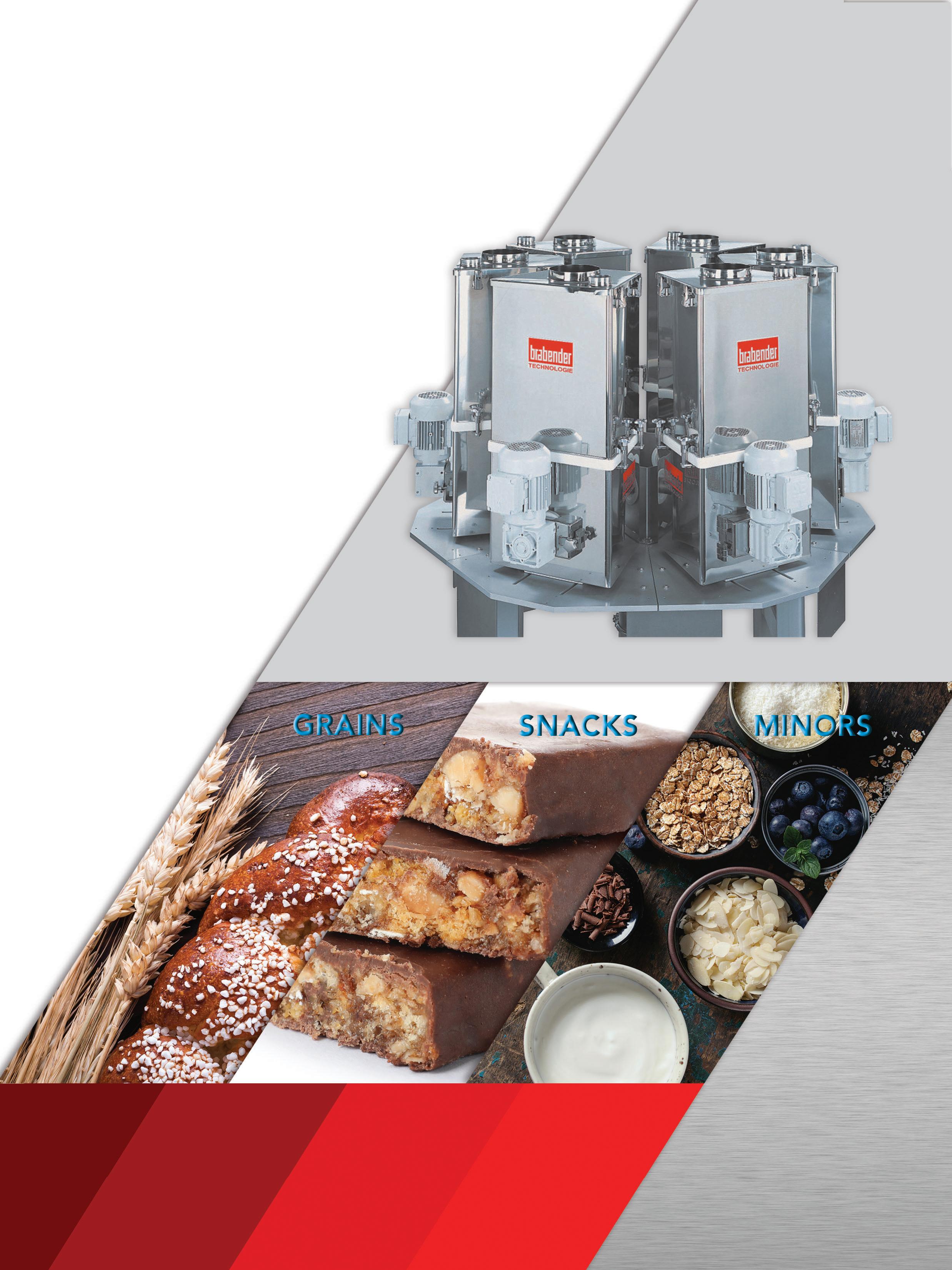


































Providing safe and reliable feeding equipment to the baking industry for over 60 years Contact us today! 1-888-284-4574 w w.brabenderti.com Keep the Flow
already a core target. Fathers purchase bars for themselves and their children, over-indexing across segments. Snack bars, which are more mainstream and carry a lower price tag, appeal to younger shoppers, while premium-priced nutritional bars resonate with higher-income households.
Altobelli shared that while the total bar category shows a slight male skew, the gap between male and female engagement is most evident among purchasers of performance bars designed to supplement high-intensity workouts and competitive athletics — fueled by Clif Bars, Pure Protein, Met-Rx and Power Crunch.
Performance bars, geared for energy and recovery, are also forecasted to show decline in 2023 before falling into several years of stagnant performance, according to Mintel predictions. The segment is facing encroachment from
Top 10 Nutritional/Intrinsic Health Value Bars By
other types of bars, which are capitalizing on high-protein claims.
Currently, there is a greater portion of US adults who exercise for mental and emotional wellbeing rather than strictly physical. This could mean that performance bars with benefits related to energy, mood or post-workout relaxation could be a point of differentiation in the athletic-focused bar market, Altobelli said. Additionally, active and passive outdoor activities such as hiking, fishing, camping and boating could also offer ways to forge a connection between bars and emotional wellbeing and relaxation.
In the absence of a return to pre-pandemic levels, the bar category will likely feel challenged, with snack and granola bars taking market share from nutritional/health bars. These alternatives offer a diverse range and meet consumer health criteria
Dollar Sales ($ in Millions)
without the premium price of specialized bars. With Mintel reporting that 58% of consumers prefer snacks other than bars at home, bars will also likely feel pressure from other snacking categories.
It will be important for manufacturers to meet long-term hybrid lifestyles and establish relevance and value at home vs. strictly on-the-go. This offers an opportunity to identify with new occasions such as cooking or at-home exercise.
Lastly, while variety packs are common in the bars category, that variety is often delivered via flavor assortment. To stay competitive, Altobelli suggested bars manufacturers consider options for positioning bars as a treat or an indulgence with dessert-inspired and nostalgic flavors. In balancing health and taste, bar companies can keep up with consumer needs. CB
CATEGORY OUTLOOK: BARS
72 FEBRUARY 2023 Q1
Source: IRI OmniMarket Integrated Fresh | Latest 52 Weeks Ending Jan. 1, 2023
CLIF QUEST KIND ATKINS NATURE VALLEY PURE PROTEIN
$815.49 $323.24 $303.06 $288.26 $216.31 $154.44 $152.91 $128.78 $115.32 $98.44
THINK RX BAR POWER CRUNCH ONE
THE LIGHTLINE PICKERLINE SO MUCH MORE THAN JUST AUTOMATION.
ATTRACTIVELY PRICED
Low investment costs, low energy consumption, future-proof investment.
EFFICIENT
Pre-configured for standardized packaging tasks, high-performance range.
FAST
Short delivery times, reduced installation costs, fast commissioning.
HIGH QUALITY
Highest quality availability as per proven Schubert standards.



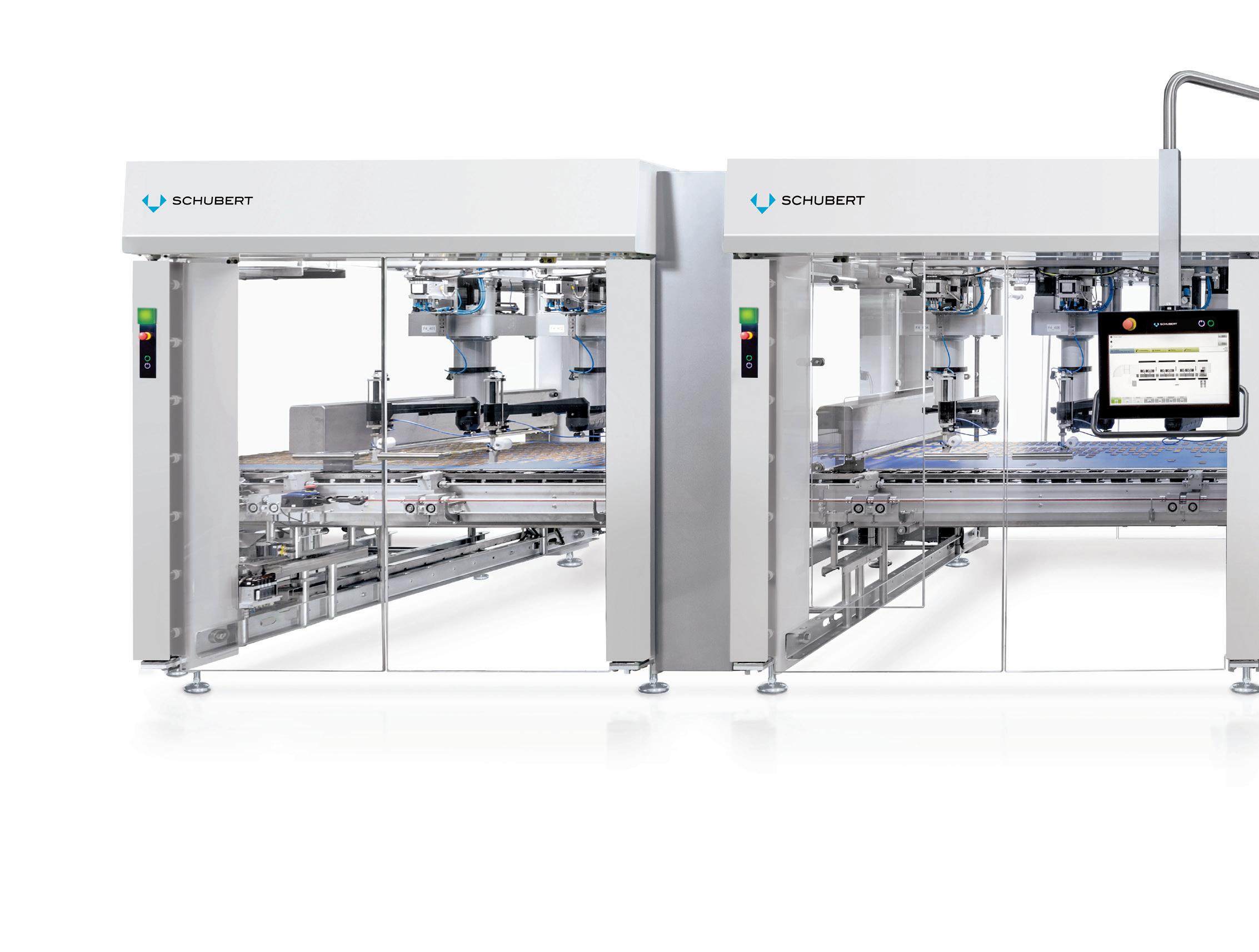
SEE IT IN ACTION
www.schubert.group











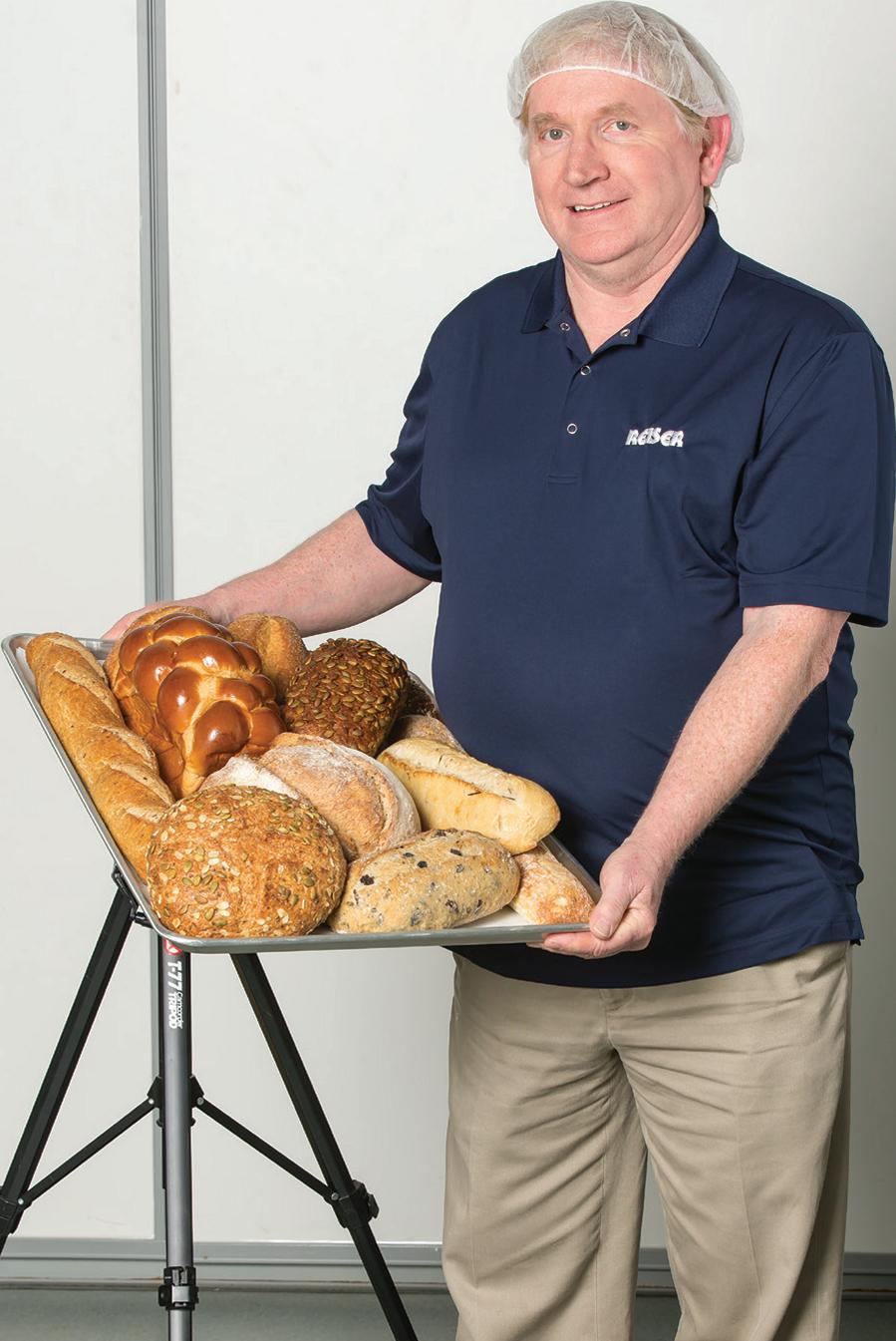


www.reiser.com Reiser • Canton, MA • (781) 821-1290 Reiser Canada • Burlington, ON • (905) 631-6611 Reiser UK • Milton Keynes, Bucks • (01908) 585300 2021 At Reiser, we have the experts, the process knowledge, the experience and the equipment to help you improve your entire bread line. Our Bakery Specialists will show you how to improve scaling without sacrificing quality. Come run your product with us at the Reiser Customer Center. Unmatched scaling and quality.
Rolling with the punches
BY ANNIE HOLLON
Whether it be a smaller operation or one of the country’s biggest bakery manufacturers, bread producers are feeling the weight of challenges impacting their operations. Acclimating to the unexpected is the new normal, and post-pandemic, the ability to adapt quickly to new practices, resources and solutions makes all the difference.
The effect of inflation on key ingredient costs continues to impact bread manufacturers and their consumers. To navigate uncertainty, bakeries are learning to work with suppliers to keep costs and shortages at bay.

At Thomasville, GA-based Flowers Foods, producer of notable brands including Nature’s Own, Dave’s Killer Bread and Wonder, the focus has been on balancing consumer needs with manufacturing capabilities. According to Tom Winter, the company’s chief supply chain officer, Flowers’ bakeries have maintained food quality, safety and regulatory compliance as top priorities despite rising costs.
“As high inflation continues to impact production costs and consumer decision-making, we are laser-focused on providing reliable customer service — meeting orders on time and keeping shelves stocked — and minimizing
COMMERCIAL BAKING 75
Photo courtesy of Flowers Foods
Thomasville, GA-based Flowers Foods is upholding quality and food safety in the face of increasing costs.
CATEGORY INSIGHT: BREAD | BUN | ROLL
costs,” Winter said. “This means we must operate as efficiently as possible.”
St. Louis-based Companion Baking found itself less impacted by the supply chain because of its longstanding supplier partnerships, Josh Allen, Companion’s founder, shared.
“We don’t change vendors regularly, and it’s not always about the best price,” he said. “It’s about the relationship, the service, the fill rate, and folks taking care of us — and us taking care of them.”
Allen noted that those relationships add shelf life and value to its operations. Companion has worked with ADM Milling for 20 years and partners with AB Mauri, who’s just 20 minutes away.
“Those relationships have value, and that consistency has value,” he said. “If we’re not constantly beating people up about price and service, and if we recognize that mistakes are mistakes and work through them together, then when things get challenging, we get closer to the front of the line on product availability.”
Supply chain challenges related to ingredients are not currently a pressure point for Companion. That is placed on increased costs across the board.
“We’ve been around for 30 years, so we’ve seen all kinds of different things,” Allen said. “What we’ve never seen before is plastic for packaging escalating at the rate it is, while at the same time flour and labor costs are escalating. We’ve never had that trifecta, where every single line item that goes into gross margin is getting hit at once.”
Companion has yet to raise its prices, but rising ingredient costs are a concern. Even though cost pressure is in other
areas such as plastic bags and corrugated boxes, there’s greater concern about the hands needed for production.
Labor challenges have bakeries trying to find employees while supporting work-life balance. Technology such as an automated storage and retrieval system has helped La Crosse, WI-based Kwik Trip reduce the number of coworkers needed, noted Eric Fonstad, bread and bun plant director.
“The automation has kept us from needing 20 to 30 people every year to where we’re only hiring a few coworkers every year,” he said. “It has helped us tremendously; without it, we would be in trouble.”
Kwik Trip has set its sights on maxing out on automation. Its new facility, which opened in 2018, was built for growth, with automation that supports expansion. By automating some processes, the facility increased bread production from 150 to 225 loaves per minute and doubled bun production from 800 to 1,600 buns per minute.
To supply its hundreds of c-stores, Kwik Trip uses vertical integration for quality
and price control. Growing concern over staffing resources realized a highly automated bakery operation for its 11 bread and 11 bun SKUs for everything from raw ingredient scaling and mixing to packaging and order pulling.

A Zeppelin ingredient handling system scales approximately 95% of everything manufactured at Kwik Trip and manages the ingredient transfer from storage bins to mixers. The company also invested in several mixers, including three 2,000-lb. AMF Bakery Systems mixers for bread and a continuous mixer from Reading Bakery Systems (RBS) for buns. The RBS continuous mixer supports plans for expansion and increased productivity.
AMF proofers, ovens and coolers also helped automate the plant floor. “When you look at the proofing and bake, it’s all conveyorized,” Fonstad said. “There’s no interaction that has to be handled by a co-worker; it’s all handed off from one unit to the next .”
Even with high automation, Kwik Trip trains co-workers to the fullest capacity by instilling knowledge and confidence, which ensures production flows.
FEBRUARY 2023 Q1 76 CATEGORY INSIGHT: BREAD | BUN | ROLL
For St. Louis-based Companion Baking, long-held relationships create added value to the bakery’s operations.
Photo by Liz Goodwin Avant Food Media
State-of-the-Art Systems and Ingredient Handling




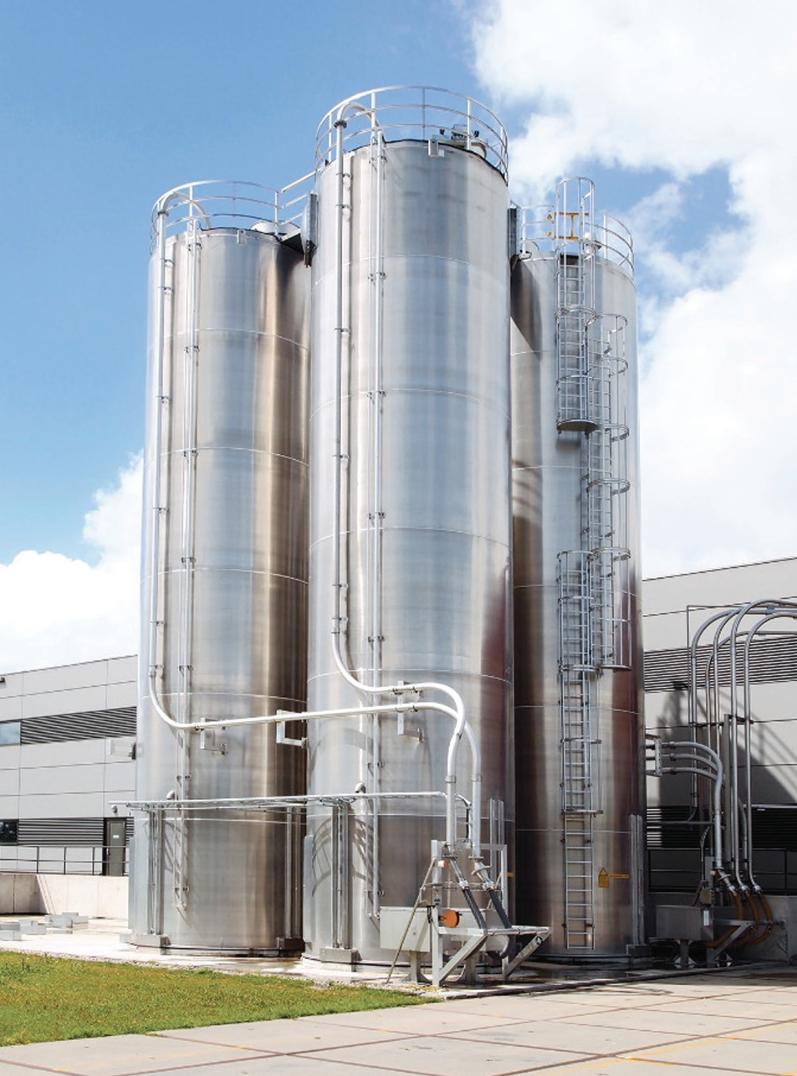
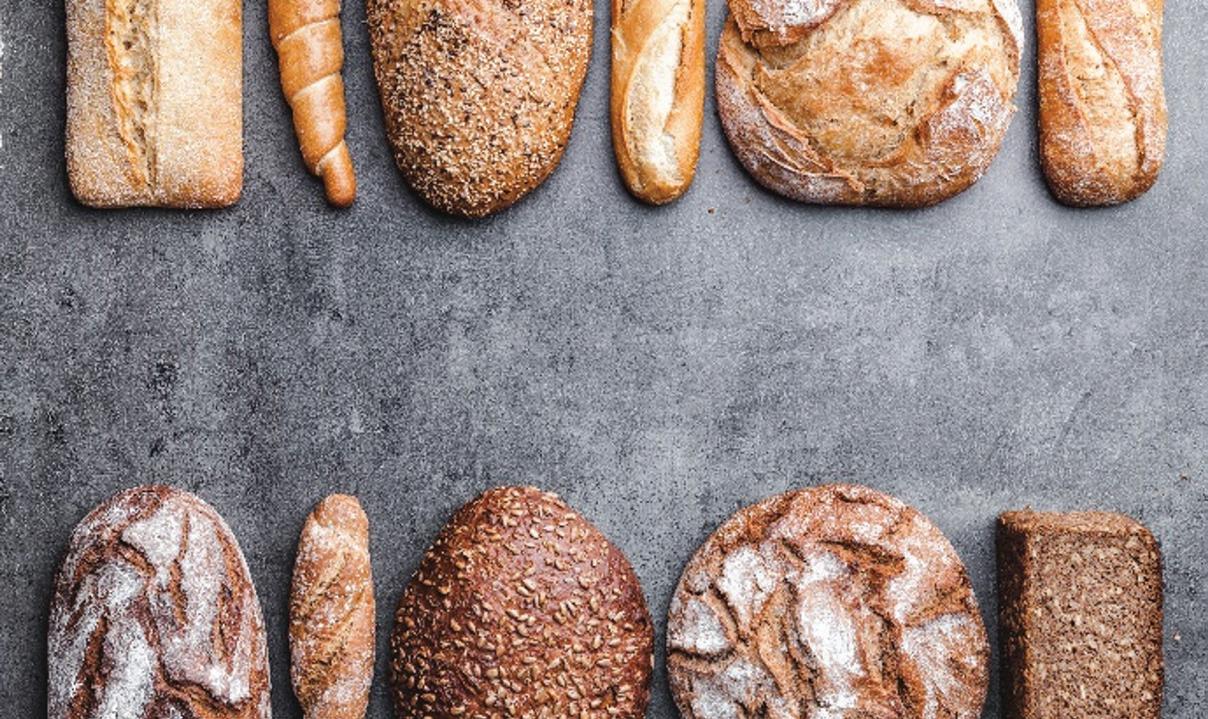
COMPLETE EXPERTISE FROM ONE SOURCE
Raw Materials acceptance, storage, application, conveying, preparation, blending, dispensing, mixing and control: We develop extraordinary solutions in all areas. All key components are developed, produced, and in some cases patented by us. The equipment with excellent processing quality is designed for round the clock operation. It fulfills the strict hygiene standards usual within the food industry and is designed for easy cleaning.
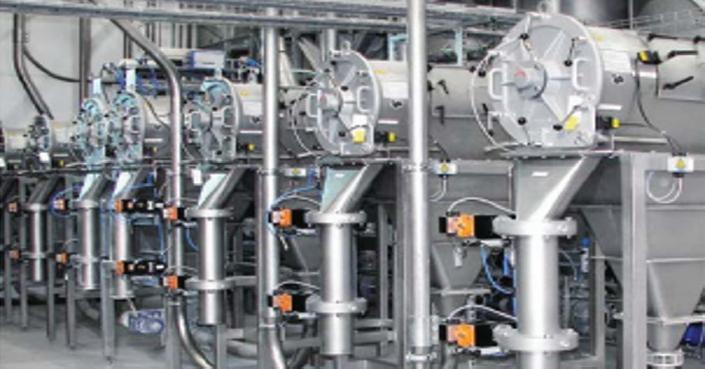

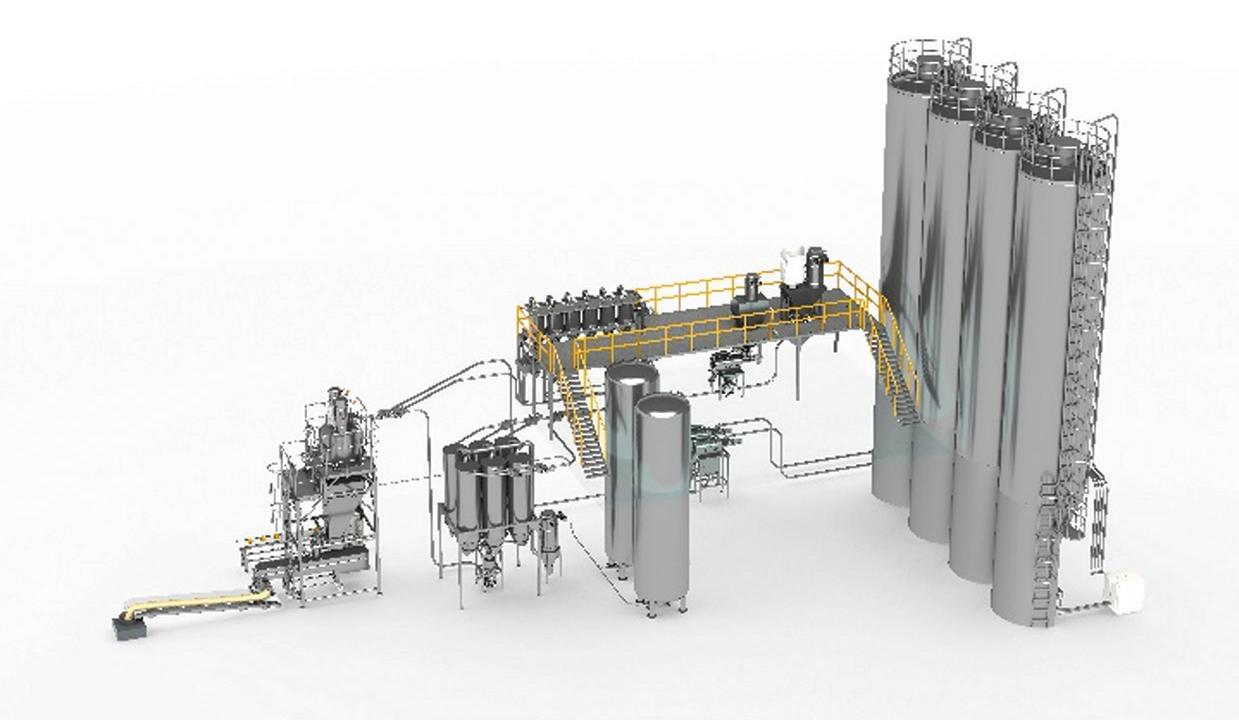
To learn more about us and our engineering solutions, Please visit us at www.zeppelin-systems.us




Zeppelin Systems USA, Inc. (Food Processing Plants Division) 13330 Byrd Drive Odessa, FL 33556






Phone: 813-920-7434
Email: Info@zeppelin-usa.com.

Zeppelin Systems USA, Food Processing Plants Division Find us on Zeppelin Systems on
Scan code to watch
video of Zeppelin Continuous Mixing with Codos in Action
In St. Louis, Companion is investing in automation to improve efficiency and address labor challenges, Allen shared.
“We’ve worked with B ettendorf-Stanford and have invested in their bag packing equipment in the past 24 months,” he said. “We purchased case erecting equipment and a robotic palletizer in the past 12 months, which we really needed to keep the process moving. We’ve also worked with Sottoriva for a new bun line.”
The new year brought an additional obstacle for bread, bun and roll manufacturers when sesame joined the list of major food allergens under the Food Allergy Safety, Treatment, Education and Research (FASTER) Act.
For Kwik Trip, the impending impact of the FASTER Act caused the team to reevaluate its active SKUs. The company’s bratwurst bun was the only product manufactured with sesame at the time, and the team faced a decision: Include sesame on every bun produced or cut the SKU. Sales data dictated the decision to eliminate the product.
“In October 2021, we stopped making the brat buns with sesame seeds on them, and since then, we have been picking different pieces of equipment and thoroughly cleaning them,” Fonstad said, adding that the company’s QA team has continued to do environment testing to ensure the allergen is gone.
But no two bakeries approach allergens the same way. For instance, Companion Baking, which serves an array of customers, has upped the ante on sanitation and cleaning processes for changeovers with sesame products.
“It doesn’t really have an impact on us other than it is a little bit more time
consuming when we do changeovers from a product with sesame, where we didn’t have to be concerned about that before,” Allen said. “But it isn’t as if we’d been allergen-free anyway. We do some products with cheese and with nuts already, so it’ll fall in line with those items.”
Allergens are not the only consumer needs manufacturers must stay attuned to. As consumers resume on-the-go lifestyles post-pandemic, Jonathan Potts, regional sales manager of Companion Baking, noted its customer base needs products that last through deliveries.
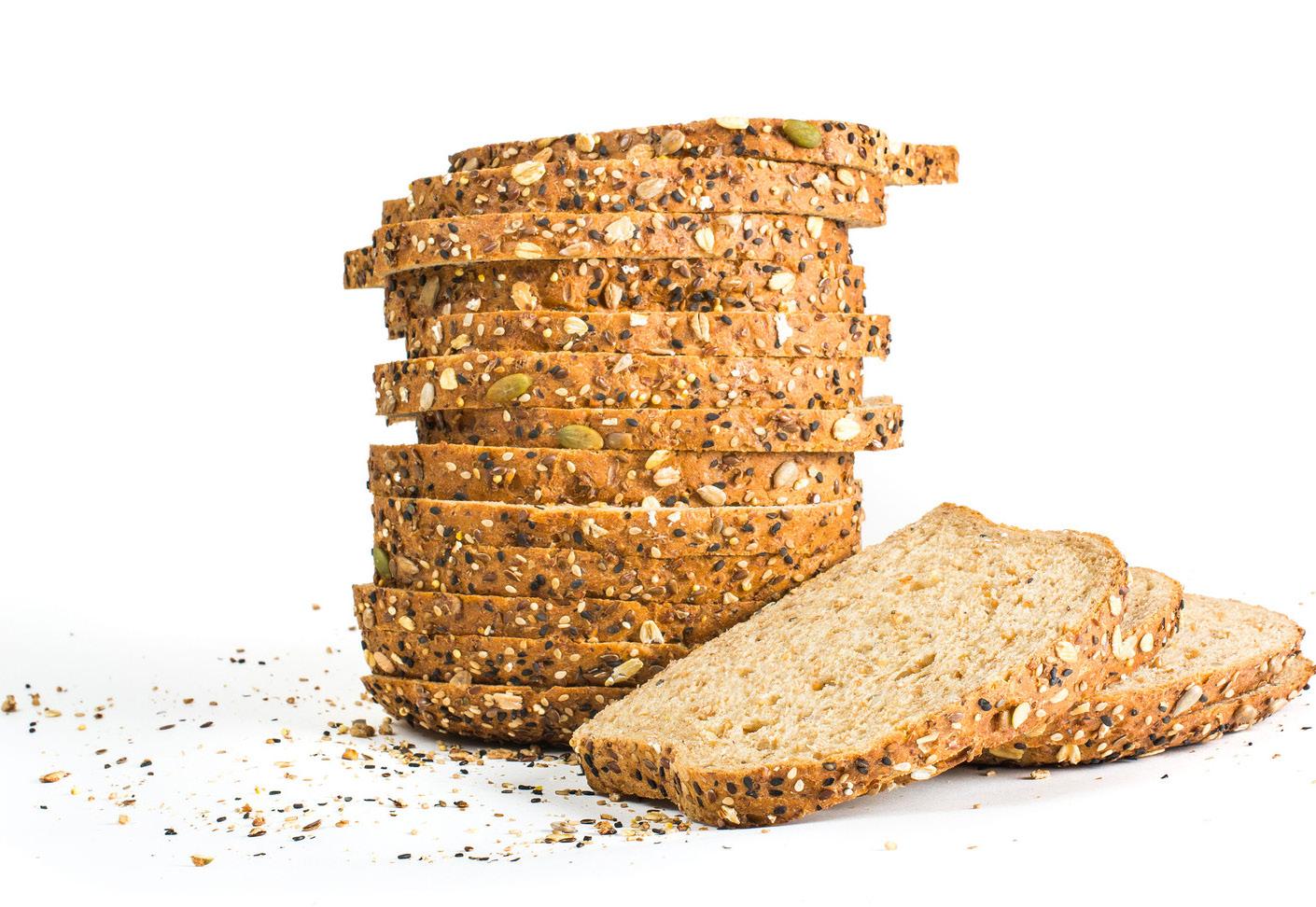
“Post-COVID, the to-go food movement is not going anywhere,” he said. “It’s going to provide a 25 to 30 percent portion of foodservice revenue going forward. We need to have a product that holds up well in those formats.”
Potts also noted a shift in the retail business toward thaw-and-sell, largely in part to continuing labor challenges. Thaw-and-sell also reduces costs and waste while extending shelf life.
When it comes to R&D, bakers must ask the hard questions for the sake of innovation.
“The conversation needs to be ever-changing to what the struggles and pain points are in the environment right now,” Potts explained. “These conversations were a lot different four years ago, so it challenges us to ask more questions and really listen more to customers.”
Connecting with customers is critical, but so is understanding consumer feedback, something Flowers Foods has sharpened its focus on. In October 2022, the company introduced www.creationsbyflowersfoods.com, an e-commerce site where consumers can receive a sample of a new product and provide direct feedback.
Debo Mukherjee, chief m arketing officer of Flowers, noted that by capturing these insights, Flowers gains crucial decision-making data beyond traditional research.

FEBRUARY 2023 Q1 78
CATEGORY INSIGHT: BREAD | BUN | ROLL
As consumer needs shift, some baking companies are relying on direct customer feedback for innovation.
Photo courtesy of Flowers Foods
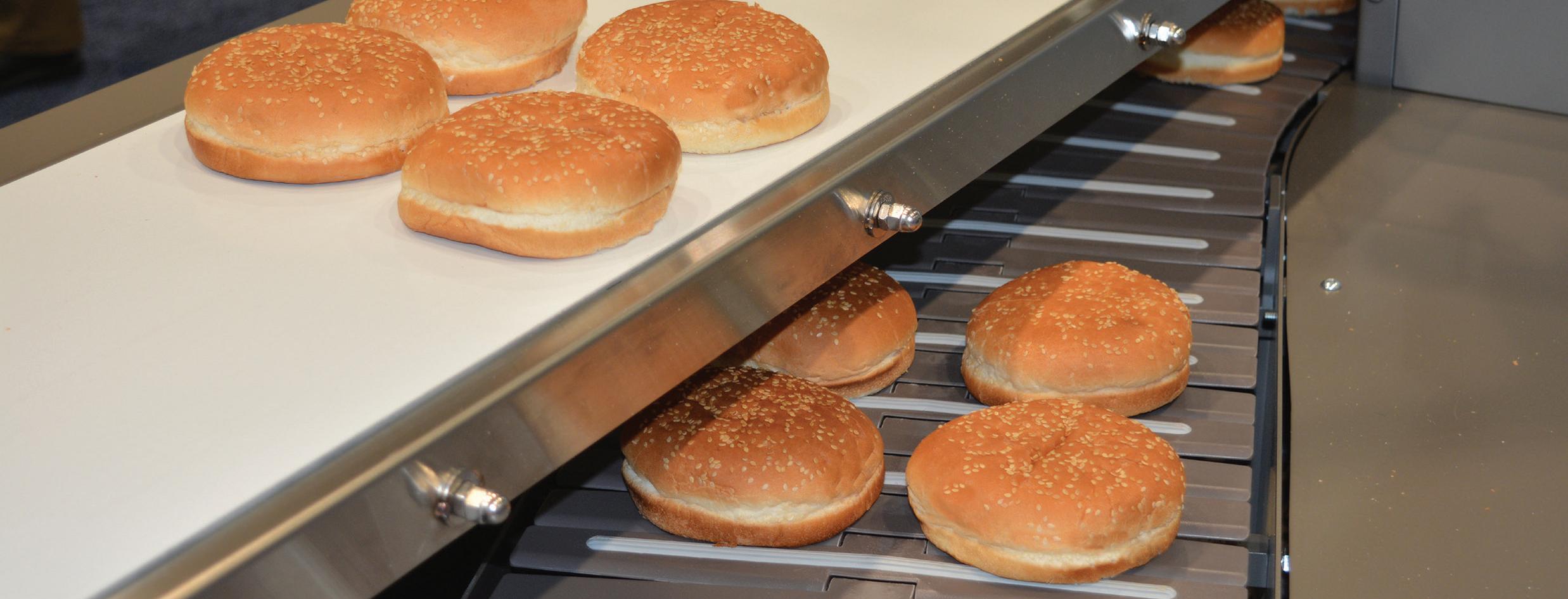


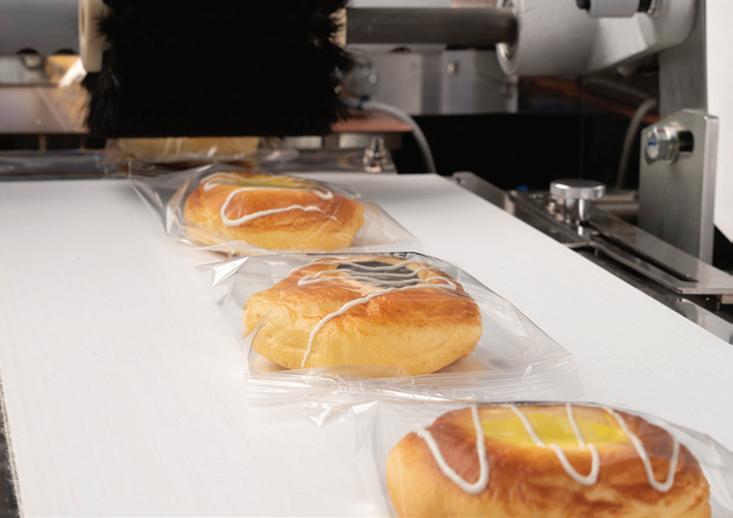

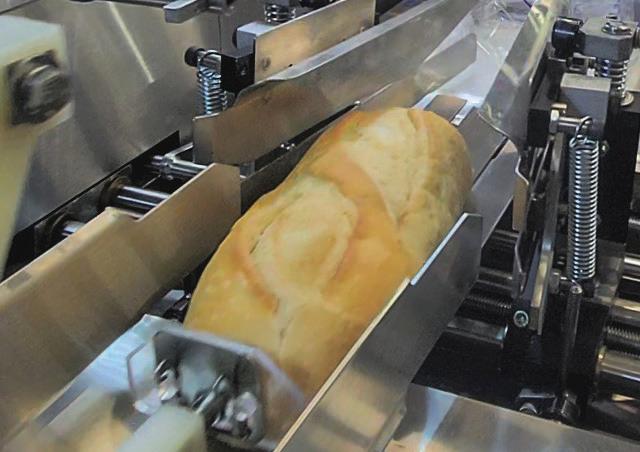

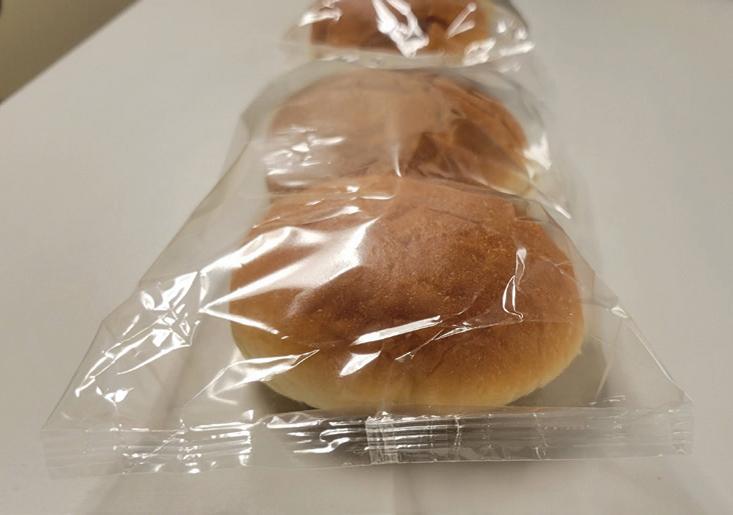


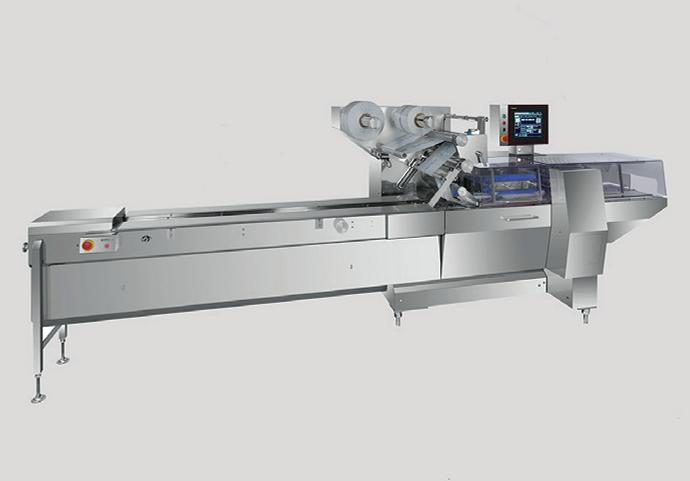
www.formostfuji.com 425-483-9090 sales@formostfuji.com “Quality is: First and Formost” Flow Wrappers, Bagging Machines, and Automation We’ve got you covered! Partnerships, Customization, and Service are just a few advantages of doing business with
“We are also focused on developing new sources of revenue outside our core business,” Mukherjee said. “We are making substantial investments in our agile innovation group, which is leveraging the power of our No. 1 brands to extend our reach beyond the traditional bread aisle. Our team employs a testand-learn process for new product innovation and relies heavily on valuable feedback from our consumers.”
He shared that recent product launches including Dave’s Killer Bread Epic Everything breakfast bread, Nature’s Own Hawaiian loaf and Canyon Bakehouse brioche rolls, are yielding positive results.
With such an array of products, commercial operations must balance innovation with flexibility.
The Companion team is focused on creating unique varieties of products catered to specific customer requests.
“We probably produce five to seven different hamburger buns that aren’t that dramatically different from one another,” Allen explained. “But different customers have very different needs, so it just creates some complexity in the process of managing more items.”
Whether it be multiple varieties of one product or the consistent production of staple breads, attention to detail still requires a human touch.
Even with a highly automated system, Kwik Trip needs manual involvement on its multigrain, eight grain and oat grain products.
“There are things we just can’t flow through a pipe, like some of the supersoaked grains,” Fonstad said. “Those have to be hand-added at the mixing
sites, so those require more attention when it comes to the mixing side of things.”
Additional technical support can make a major difference. Equipment advances add support for bakeries that are braving anticipated growth and production shifts.
“Given the nature of pre-ferments and other things that we do here when we make bread, the ability to manage that process more efficiently would be terrific,” Allen said. “It’s quite cumbersome and labor-intensive, which is what has kept us from getting there with the challenges of the pandemic. So that’s the next thing on our radar when it comes to production technology.”
Though Kwik Trip’s facility is already equipped with what it needs to succeed, as more projects come down the pipeline for Fonstad and his team, some solutions to accelerate the facility’s automation may be in order.
“We will have some smaller projects coming down the road — maybe some pan handling robots — as we want to increase rates on our 24-oz. loaves,” he said. “That would be something down the road that we would certainly want to look at introducing. Otherwise, this facility is built for well into the future.”
Bread bakers produce some of the most quintessential goods in the industry, and working past the challenges makes certain operations stand apart. Whether it’s an uncertain supply chain, evolving customer interests, a new allergen or a waning labor force, rolling with the punches is bread, bun and roll producers’ best defense. CB
FEBRUARY 2023 Q1 80
| ROLL
CATEGORY INSIGHT: BREAD | BUN
“As high inflation continues to impact both production costs and consumer decision-making, we are laser-focused on providing reliable customer service — meeting orders on time and keeping shelves stocked — and minimizing costs.”
Tom Winter | chief supply chain officer | Flowers Foods
















a·vant adjective culturally or stylistically advanced Thought for Food avantfoodmedia.com






















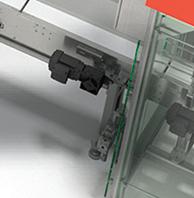
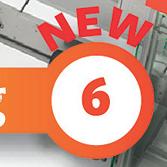
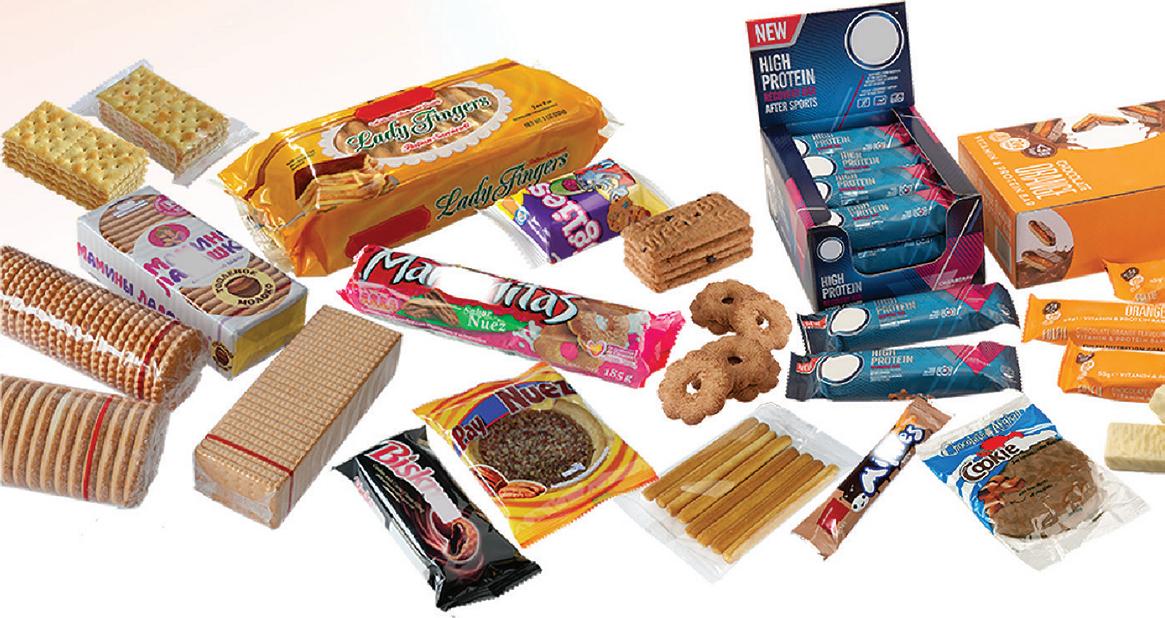


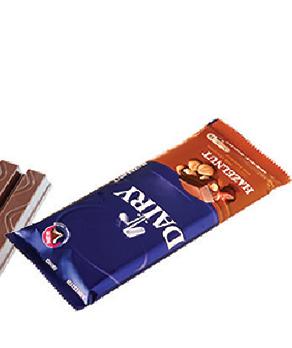


Cavanna: scalable Flowpack, Cartoning & Casepacking CAVANNA PACKAGING USA INC. 3400 Corporate Way | Suite F | Duluth GA 30096 Phone: (770) 688-1501 Fax: (770) 810-3528 sales@cavannagroup com www cavanna-usa com Cavanna Packaging specializes in: • Turn-key Flow Wrapping, Cartoning and Casepacking solutions • Sanitary Design Systems for the Food Industry • Easy to clean toolless Poke Yoke solutions • Fully Caustic Washdown Flow Wrapping lines • Unique space and labor saving Flow Wrapping solutions Turn-key Flowpack & Cartoning
CATEGORY INSIGHT: BARS
All-in-one innovation
BY ANNIE HOLLON
Compared to other bakery categories, bars have cornered the convenience market — and are running with the momentum. The pandemicinduced health awakening sparked more consumer interest in nutrition labels. Rather than stick to classic snacking, they’ve taken a closer look at what is fueling their bodies, and the bars sector is responding. Bars — and their manufacturers — are reacting and redirecting their strategies to better the planet and its people.

Ranging from baked and cold-pressed to extruded and co-extruded, the convenience can’t be beat, but it can be evolved. As consumer interests shift, bar companies and co-manufacturers are adapting accordingly.
Currently, the ingredient supply chain is tricky, leading bar makers to be more strategic to keep things moving.
In the Windy City, Jonathan Miller, president of mid-size manufacturer Element Bars, leans into forecasts to streamline production. With a range of bar types and customers, ingredient procurement happens en masse to account for everything produced.
“We don’t schedule a production run until we have a purchase order in hand,” he said. “All our customers provide us with a forecast, and we order ingredients to that forecast.”
According to Miller, forecasting increases visibility through the supply chain, so no one is caught unaware. He also works with suppliers to maintain warehouse space and contracts by breaking shipments into multiple runs.
COMMERCIAL BAKING 83
With uncertainty in the supply chain, bars manufacturers are working ahead to stay on track with production.
© misskaterina on Adobe Stock
CATEGORY INSIGHT: BARS
“That way, it’s not taking up room in my warehouse, and it’s almost forcing suppliers to hold a bit of safety stock but with a commitment to purchase it,” he said.
For Louisville, CO-based Fresca Foods, a multi-platform manufacturer and innovation company in which bars are its largest, longest running product, challenges like supply chain issues and inflation have placed an added emphasis on staying prepared and upholding relationships.
“Relationships are so important right now — relationships with our suppliers as well as with our brand partners — so that we all are working together to figure out solutions,” said Allie Brimlow, director of sales and marketing for Fresca. “A lot of the time in the co-manufacturing space, it can be very transactional. What we try to do is foster collaborative relationships with our customers so that it’s the two of us versus the problem.”
The value of relationships continues into the supply chain as securing supply of critical ingredients and increasing inventory become strategic moves to manage uncertainty. These disruptions not only ignited proactive practices for Fresca, but they also took the company back to creating processes that stand under pressure.
“In a stressful environment when there are delays or things get rescheduled, that’s when the cracks in the foundation can show,” Brimlow said. “We have relied on our solid, strong foundational processes more than ever the last two years. Leaning into the fundamentals has been really important to us, and it’s helped us weather the storm.”
Fresca has negotiated contracts to secure supply for critical ingredients, plan ahead and keep hold of inventory as
a preventative measure to keep production running.
Some companies, like Steamboat Springs, CO-based Bar-U-Eat, have had a string of luck. One way the bakery stayed ahead is by pre-approving alternative ingredient options.
“Oats, for example, have been hard for a lot of people to come by in the past couple of years,” said Jason Friday, co-founder of Bar-U-Eat. By ensuring alternative ingredients are up to par, the brand can confidently move to a secondary supplier rather than settle for another.
This intentionality is especially helpful with a product that boasts a simple ingredient list. Just as consumers are becoming increasingly invested in how they fuel their bodies, bar manufacturers are tuned in to the impact of what they’re putting out into the world.
This approach extends into the entire operation — from ingredients to wrappers — for brands like Bar-U-Eat. With health and sustainability at its core, the company boasts a clean-ingredient
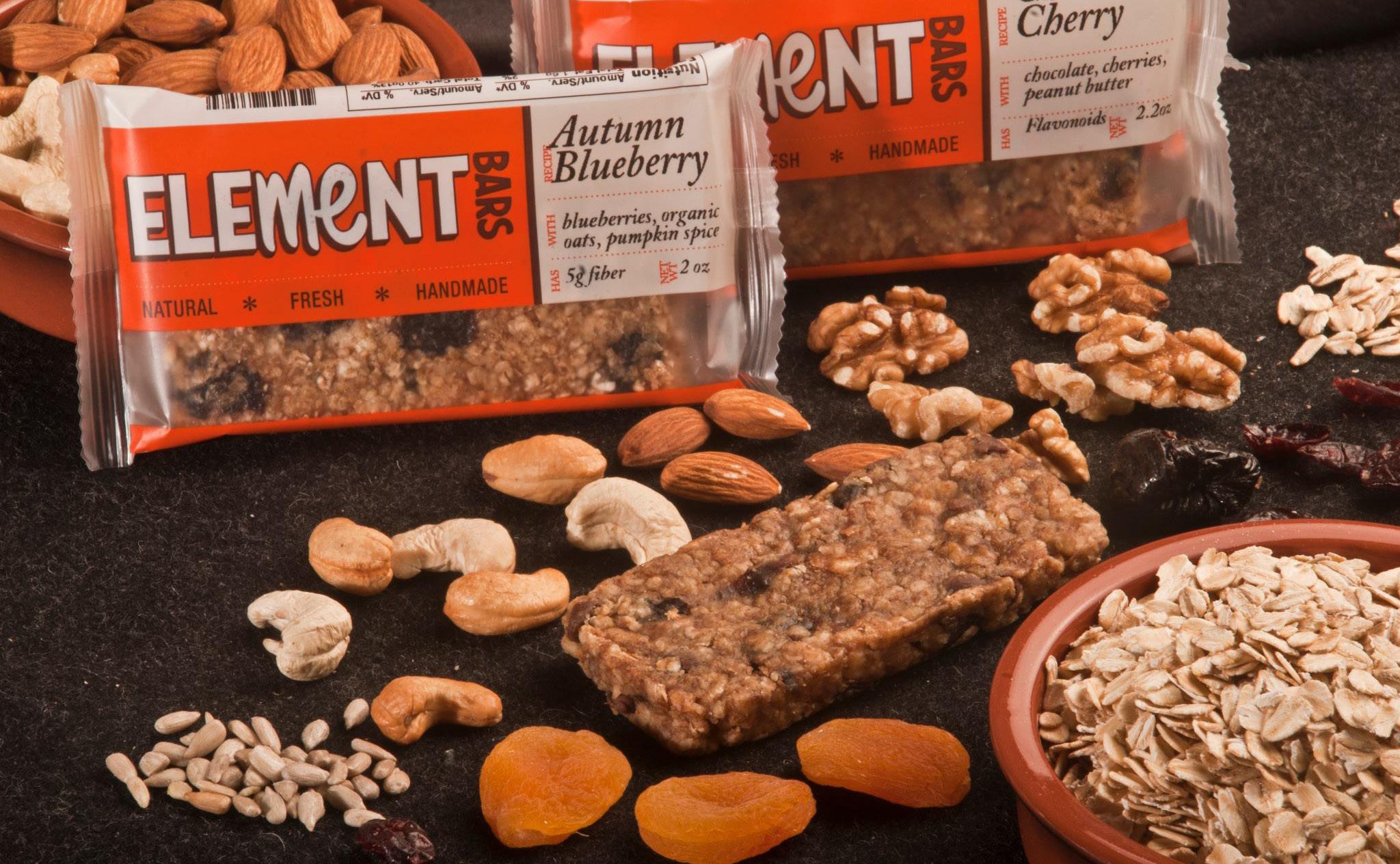
product free of oils and preservatives and wrapped in plant-based compostable packaging material.
“You realize how much waste you’re generating when you eat a lot of bars and you’re buying them off the shelf,” Friday said. “We want to be part of a solution for the planet and not add more petroleum-based packaging to landfills, the ocean and the environment.”
Bars answer the call for a range of health claims and can serve as an all-encompassing snack option for the active consumer. In tandem with piqued interest for how these products can be better-for-you, consumers are increasingly conscious of what ingredients comprise their bar of choice, from the visible to the legible.
“Some big things that are important to people are not having oils or preservatives and having ingredients that you can recognize visually,” Friday said. “Especially in the natural foods arena, it’s incredible how much people are now paying attention to the ingredients that are in each individual product.”
FEBRUARY 2023 Q1 84
For Chicago-based Element Bars, using forecasts has helped the mid-size manufacturer cover its bases.
Photo courtesy of Element Bars

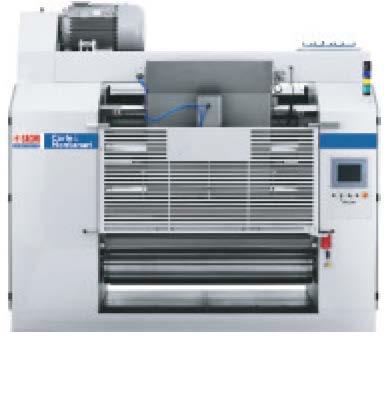




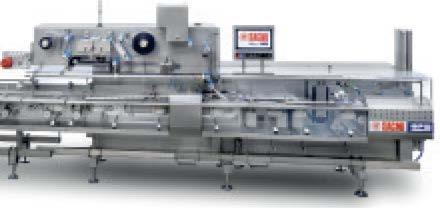
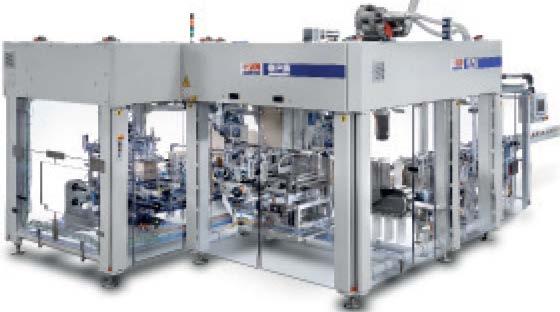




@SACII Carle& I ••1=111 Montanari •• WEAREINNORTHAMERICA TOSERVEYOU CHOCOLATE PREPARATION PLANTS MOULDING LINES Academy& Training Center Upgrades Workshop Repair WRAPPING MACHINES � Customer Service RemoteSupport PRIMARY PACKAGING � (::fr·& Genuine Spare Parts SECONDARY PACKAGING Line&Machine Assessment Preventive Maintenance Contactus -----------------------------SERVICEMANAGER DALETARRANT dale.tarrant®sacmigroup.com SPAREPARTS ANNAROSA ODORICI annarosa.odorici®sacmigroup.com ATRUSTEDPARTNERALWAYSBYYOURSIDE PROJECTMANAGER JARRETTDIXON jarrett.dixon®sacmigroup.com @SICII Carle& I ••1=111 Montanari L--..
Beyond seeking familiar flavors like chocolate, a rising number of consumers are in search of additional protein in their bars. Miller shared that even in the kids bar sector, shoppers are looking for more protein and less sugar. In formulation, creating a nutritious bar comes down to adjusting carbs, fat and protein. The challenge, though, is learning how to balance more protein without sacrificing flavor and composition.
“From a formulation perspective, a lot of the bars we run are allergen-free, so you’re looking at nonallergenic plantbased proteins, and formulating with them can be challenging. The taste can be off or earthy, or the texture can be not quite right,” Miller explained. “But there are other types of proteins out there that people have started to experiment with — everything from chickpea to fava bean protein.”
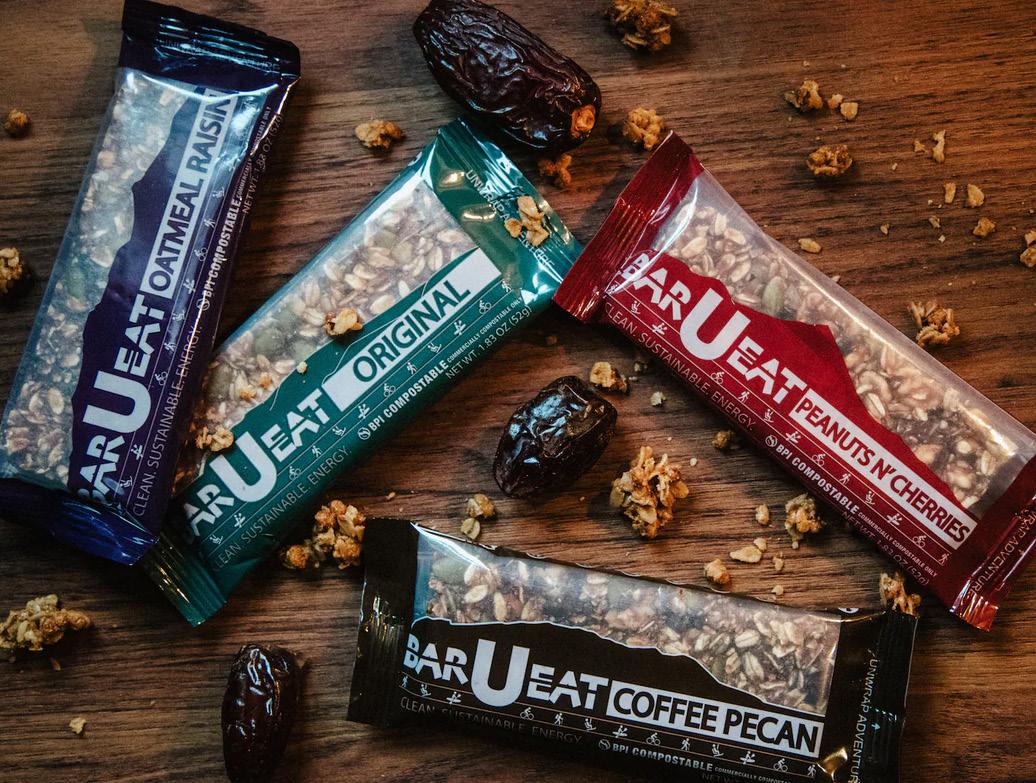
With a widening interest in health and clean label ingredients, R&D for bars that fall into the natural food space can get a little complicated. As a younger company among more tenured manufacturers, Bar-U-Eat has paced itself when looking to expand its portfolio; the brand currently carries the same four flavors from the past two years. As the company considers future varieties of its products, ensuring a fit within the current machinery is key.
“We’re currently looking to add some new flavors, so at the top of our mind is how it’s going to work in our machines,” Friday explained. “Is it going to be too sticky? Is it going to make it so that the bar crumbles and falls apart? We can’t have too many crumbs falling off the bar because it leads to issues with the flowwrapping, packaging and seals, so those are all things to consider and test before we can go through full-scale production.”
As new bars emerge, innovation is growing alongside it. Despite uncertainty in the supply chain and rising ingredient costs, innovation has yet to slow down, according to Brimlow.
“We saw innovation for sure slow down in 2020 and 2021, but I think the delay of innovation in the early days of the pandemic has put more pressure on it today,” Brimlow said. “Now, I think brands realize that innovations are imperative for growth. And even though the world is uncertain, innovation is very important to keep consumers interested and to keep brands growing. Despite all this uncertainty, we have not seen innovation slow down. In fact, it’s picked up.”
To make up for lost time and to improve their margins, bar brands look to their co-manufacturers for operational efficiency. This has developed a unique dynamic between the two as companies strategize while labor is down and ingredient costs are rising.
“We’re feeling the pressure, but we’re working with our customers as much as we can to focus on margin improvement,” Brimlow continued. “We’re focused on keeping costs down as much as we can and doing some reformulation work to look at how we can reduce the cost of our materials or formulations.”

With plant-based packaging still in its infancy, Bar-U-Eat is looking for a solution that can help them on a larger scale. Due to its unique composition, compostable packaging is tricky to flowwrap and more costly compared to its plastic counterpart. The company’s interest in increasing its bars-per-minute rate presents a unique challenge given the brand’s commitment to compostable packaging.
“Your typical bar manufacturer is looking to do between 300 and 500 bars per minute, and when our packaging is limiting us to 80 per minute, that means we have a higher cost for making
FEBRUARY 2023 Q1 86
CATEGORY INSIGHT:
BARS
Steamboat Springs, CO-based Bar-U-Eat has to work within the capabilities of its machinery in R&D for new flavors.
Photo courtesy of Bar-U-Eat
the competition.
Sustainable oven systems from Reading Bakery Systems.


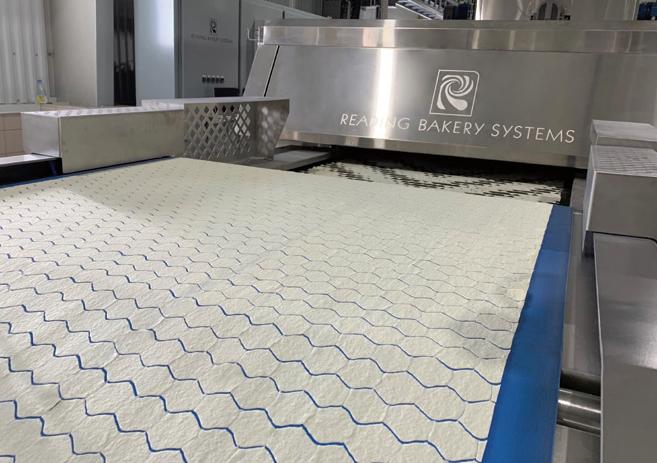

Put our latest advancements in baking technology to work for you.
Reading Bakery Systems ovens feature advanced technology that delivers the flexibility, consistency, and efficiency you need to perfect your process and your products. Our oven engineering team employs sustainable and sanitary design principles, energy-efficient materials, as well as valuable data gathered by our exclusive SCORPION® 2 Profiling System to optimize production. RBS outbakes the competition, so you can too.
• Reduce carbon footprint with alternative fuel and electric ovens.

• Reduce energy costs with better insulation, stack heat reclamation, lighter oven belts, and recipedriven baking profiles.


• Improve product quality and efficiency using hybrid ovens.

• Increase product output with better baking technology.
• Reduce sanitation time with SafeShield® design protocols.



• Increase operational sustainability with fully automated controls.

For more information, call (01) 610-693-5816 or visit readingbakery.com. Experience the Future of Baking at RBS Booth #419.
Engineered to outbake
our bars,” Friday said. “One of our goals as a company is to try to make plant-based compostable packaging the status quo in the industry, and I just can’t see that happening until big manufacturers can use it at the rate that they are currently using their plastic packaging.”
When formulating a simple product like Bar-U-Eat, he continued, production has to be equally simple. To keep true to the company’s commitment of no additives, the team got inventive with custom nonstick aspects — like pusher paddles — developed in-house. The company is looking at scalability and technology currently available to help with aspects like packaging.
“Right now, we’re still hand-packaging and boxing all our bars,” Friday said. “As we scale, we’re looking to implement a boxing machine and palletizer to make it a hands-off process so we can just send our bars through the slab former, hit ‘go,’ and everything will be packaged up so we can store it easily.”
While more automation helps some bar producers, others stick to the tried-and-true equipment already in their operations. Miller shared that Element’s manufacturing is largely done with existing equipment like sigma horizontal mixers from Peerless and single- or multi-head Vemag extruders. By keeping equipment needs simple and understanding exactly what is needed to keep production in order, bar
producers narrow their loss percentages and worry less about equipment service.
In the bar category, allergens are often a top concern for producers.
Element manufactures a range of bars with all gluten-free products, most of which are baked and allergen-free due to the high number of kid’s bars produced. With three separate production rooms creating 100,000 to 200,000 bars per customer per day, keeping things sanitary is a primary focus. To ensure proper sanitation, the company conducts protein residue swabs daily.
With hundreds of thousands of distinct bars running through equipment, Miller said that a simpler machine setup keeps production moving and makes adding an hour of run time easy.
“I think most people would agree that longer uptime is the most important thing that you can have in a bakery,” Miller said. ”For me, incremental costs to add 10,000 bars is only an hour. So, when I’m already running, one more hour is nothing, right? That means making machine setup easy for people to do is one of the most important things.”
Skilled labor is invaluable as the industry still faces workforce shortages. For Miller, this means having trained employees in maintenance, scaling, mixing and quality control. However, retaining employees in the face of inflation and
rising living costs can become a challenge for smaller operations.
In rural Northwest Colorado where Bar-U-Eat operates, the pandemic rocked housing prices, making it difficult to retain a labor force in an area with a high cost of living.
“It’s $50,000 for us to pay any of our employees a living wage, which we deliberately strive for,” Friday said. “Something that is difficult for us is having enough of a labor force in an expensive rural area and making sure people have housing and a stable income that they can live on.”
Friday shared that adding automation to Bar-U-Eat’s operation serves as a safety net if things go awry.
“Automating our process can alleviate that,” he said. “We still want to provide jobs to the area, but it certainly helps to make sure that we have automation in place, so if something does go wrong, or if someone moves away because they can no longer afford the area, that we have those bases covered.”
The bars category is vast and evolving. With more companies learning how to balance purpose with product, opportunity remains for innovation and opens the door for new producers to make waves and for co-manufacturers to grow with their customers and consumers. CB
FEBRUARY 2023 Q1 88 CATEGORY INSIGHT: BARS
“We have relied on our solid, strong foundational processes more than ever the last two years. Leaning into the fundamentals has been really important to us, and it’s helped us weather the storm.”
Allie Brimlow | director of sales and marketing | Fresca Foods
Bake more, bake better with IPCO steel belt technology

Our solid and perforated steel belts have helped bakeries produce premium quality products for almost 100 years. Flat, straight, durable and easy to clean, they provide a baking surface that’s ideal for everything from rich, chewy all butter cookies to traditional biscuits and crackers.
The other reason for choosing IPCO is our global service capability, providing the reassurance of premium productivity too.
•High productivity wide belts up to 3500 mm.
•Maximum versatility – bake more on an IPCO steel belt.
•Energy efficient – lighter belt means lower carbon footprint.
•Belt only or full range of conveyor components.
• Installations, upgrades (mesh replacement), repair, maintenance and spare parts.
ipco.com/bake See us at Bakery China Shanghai · 22-25 May · Hall 21 Stand A97 See us at IBA Munich · 22-26 Oct · Hall C1 Stand 120 Bakery China
Terms of Separation
Repurposing bread product waste into animal feed is just one way Van de Weijer Drogerij puts its stamp on sustainability.
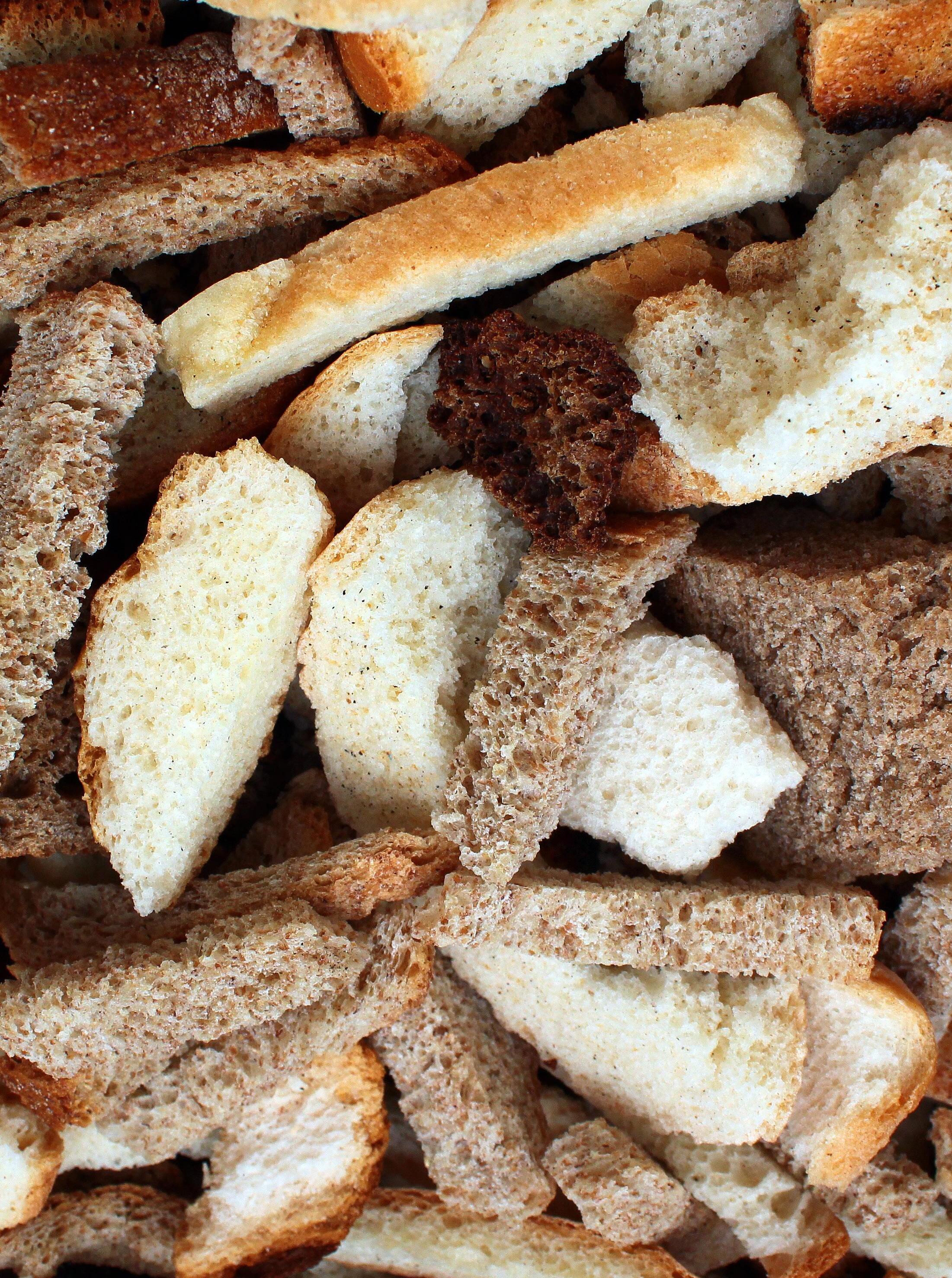 BY CATALINA MIHU, BAKING+BISCUIT
BY CATALINA MIHU, BAKING+BISCUIT
Bakeries ship their stale bread to Van de Weijer Drogerij, a Dutch separation and drying company headquartered in Panningen, The Netherlands, exactly as it sat on the supermarket shelf, packaging and closures included. The company separates, upcycles and recycles the out-of-date bakery products, turning them into animal feed using equipment, technologies and processing methods designed in-house.
“It’s a sustainable concept — all the energy required for these processes is self-generated and produced in the plant using biomass,” said Monique van de Weijer, managing director of Van de Weijer Drogerij. “Our goal is to reuse bread in the most sustainable way possible.”
Using biomass was a big step forward. Turning a natural product with inherent fluctuations into an energy of a specific value was a more complex process to master compared to using gas for energy. The challenge was to stabilize processes despite using fluctuating energy, and it has taken the company many years to achieve.
“After some 30 years of investing our energy and time, through trial and error, we are now at the point where we can say we are entirely sustainable — even the energy needed to recycle is sustainable,” van de Weijer said. “We are now truly a company that recycles products.”
© aquatarkus on Adobe Stock
90 FEBRUARY 2023 Q1
International content provided by baking+biscuit international, an F2M publication.
The concept came as an extension of family values: “Do not throw away something that can still be useful.” This is the principle at the core of building the production lines. In developing the e q uipment, the company’s goal was not to reinvent the wheel but to make use of certain useful principles from various machines.
The idea of recycling old bread was the first step, followed by separating the packaging from the bread, and then automating the process, which is Van de Weijer Drogerij’s differentiating point. Secondary packaging is often part of the bread shipments the company receives, and removing plastic wrapping from bakery products can be challenging, often requiring different techniques depending on the type of packaging involved. The challenge was to invent a machine that could tackle any number of variations and provide the same results.
Sustainability is in the DNA of the business, including the equipment. For example, the company repurposed a stainless steel flour silo and adapted it for storage needs rather than buying a new one. “Stainless steel lives forever, so why not use an existing silo and give it a second life?” van de Weijer said.
The company currently has four lines for its separation and drying operations, with a combined capacity of 140,000 tons of product per year. The processing lines, which run 24/7, include separating and drying, which improves efficiency. Van de Weijer Drogerij has developed various drying lines with specifications that match the requirements of different types of products. Initially, the production plant was about 6,500 sq. ft.; however, the company has reduced the floor space it needs for all its processes down to about 1,000 sq. ft.
“Our system is engineered to only require one person to operate everything,” van de Weijer added. The operator monitors the feeding, but no other process parameters require supervision or intervention.
Because the final product becomes breadcrumbs that are used in the animal feed industry, particle size is important. The dry mass of the resulting product is also important because, just like in bread production, it directly impacts shelf life, which can be several months long. It can also be used as a secondary material in feed mixes, which is why a long shelf life is desirable.
Van de Weijer Drogerij works with bakers within a 200-mile radius of its facility; local partnerships are the most sustainable and mutually worthwhile. To make the process even more efficient, the company makes its containers available to the bakeries that provide them with unusable bread. The bakeries deliver fresh bread to their stores in the morning and collect leftover bread at the same time. When the containers are full, they are picked up, brought to the production site and processed right away.
“Although it is not bread’s initial intended use, we also handle it with the same care as when it was first made, because we also want to make something noble of it — animal feed,” van de Weijer said. “This also takes considerable attention, time and processing power to achieve.”
Looking into continuous technology upgrades is also part of the business philosophy at Van de Weijer Drogerij. The company wants to ensure they make the best use of resources, keep costs under control, maintain an interesting price for the bakeries providing them with their days-old product, and, ultimately, be more sustainable.
91
INTERNATIONAL MARKET
“Although it is not bread’s initial intended use, we also handle it with the same care as when it was first made, because we also want to make something noble of it — animal feed.”
COMMERCIAL BAKING
Monique van de Weijer | managing director | Van de Weijer Drogerij
Consciousness on a Global Scale
From food waste to sustainability, people around the world want food for good.
 BY BAKING+BISCUIT STAFF
BY BAKING+BISCUIT STAFF
Consumer consciousness regarding food waste grew to 72% in the past two years; by comparison, it was 33% in 2020, according to a report published by the Capgemini Research Institute. The global survey was conducted in 11 countries across North America, Europe and Asia Pacific in April and May.
Food waste is one of the population’s main concerns, together with rising food prices, supply chain challenges and the pandemic, with an impact on their behavior. For the report, titled “Reflect. Rethink. Reconsider. Why food waste is everybody’s problem,” the institute surveyed 10,000 consumers and executives from 1,000 large organizations in food manufacturing and retail.
Consumers are already looking into ways to reduce their food waste. For example, there is an 80% year-onyear growth in social media searches for methods to increase the life of food items, according to the research. Cost savings (56%), concerns around world hunger (52%) and climate change (51%) are the primary reasons for this.
Looking into the causes of food waste, consumers take responsibility, with 60% feeling guilty about wasting food.
FEBRUARY 2023 Q1 92 INTERNATIONAL MARKET
Although food retailers and manufacturers focus on reducing food waste in upstream logistics and processing and packaging, few players pay the same attention to agricultural production or downstream storage.
© Chepko Danil on Adobe Stock
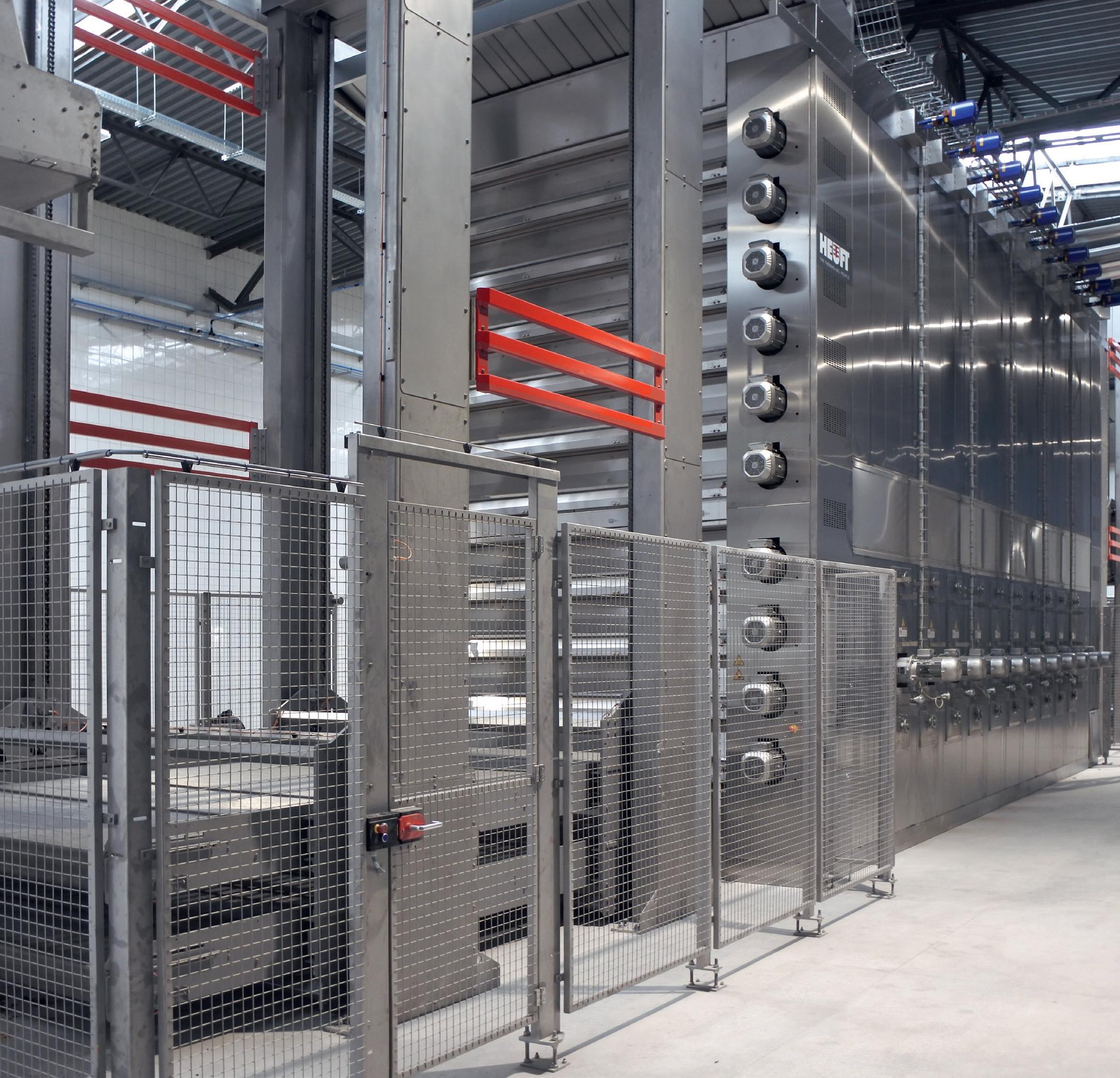







1700 TRADITION SINCE HEUFT Thermo-Oel GmbH & Co. KG, USA Marcus Hofmann, Tel: +1 619-394-9640 m.hofmann@heuft1700.com www.heuft1700.com Thermal oil ovens = Lowest CO2 footprint!
However, the survey showed that people also think retailers and food manufacturers are not doing enough to help them curb the issue. Nearly two-thirds (61%) of consumers want brands and retailers to do more to help them tackle food waste, and 57% are disappointed, as they feel that businesses don’t care enough about the issue.
The study revealed that consumers feel they are too often left to their own devices regarding reducing food waste. When it comes to increasing food longevity at home, two-thirds (67%) are going to third-party sources for information (friends, family, influencers and social media), and only a third (33%) are getting information from packaging and commercials or campaigns run by food manufacturers and retailers.
“The increased awareness amongst consumers and the initiatives being taken by businesses to tackle food waste is a positive step forward,” said Tim Bridges, global sector lead, consumer products, retail and distribution at Capgemini. “With the help of technology, organizations can track and assess food waste at every stage of the food value chain to enable action at the right time while also engaging with their consumers by inculcating waste-avoiding behaviors and making them an active participant in waste reduction. An agile, intelligent supply chain can also enable an effective collaboration across the value chain to create a sustainable and future-ready ecosystem.”
Although reducing food waste at the retail and consumption phases is an important facet, much more food is lost during production and d istribution (1.5 billion tons vs. 931 million tons,
respectively), according to the World Wildlife Federation.
More than three in four (77%) organizations said they have committed to the United Nations’ Sustainability Development Goals 12.3 (UN SDG 12.3), a framework that focuses on halving per capita food waste at retail and consumer levels and reducing food losses along production and supply chains, including post-harvest losses, by 2030. However, only 15% of organizations say they have achieved or are on track to achieve their targets.
According to the report, this is due to a fragmented approach to addressing food waste and loss across the food chain. Although food retailers and manufacturers focus on reducing food
waste in upstream logistics (44% of retailers and 50% of manufacturers) and processing and packaging (43% retailers and 46% manufacturers), few players pay the same attention to agricultural production (22% retailers and 23% manufacturers) or downstream storage (18% retailers and 21% manufacturers). With produce often crossing international borders, getting a handle on where, when and how much food loss and waste is occurring is proving a challenge for manufacturers and retailers.
leading European / international baking journal baking+biscuit international from the publishing house F2M. This magazine is the English- l anguage sister to the acclaimed German language journal brot+backwaren and is published six times per year with 5,000 hard copies delivered per issue and thousands reading the editions digitally.
FEBRUARY 2023 Q1 94
INTERNATIONAL MARKET
Commercial Baking has developed a cooperative a greement with the
“With the help of technology, organizations can track and assess food waste at every stage of the food value chain to enable action at the right time while also engaging with their consumers by inculcating waste-avoiding behaviors and making them an active participant in waste reduction.”
Tim Bridges
| global
sector lead, consumer
products, retail
and distribution | Capgemini Research Institute
Bulk Ingredient Handling forthe Snack Industry

SnacksareastapleofthemodernAmericandiet, andthesnack industryhasalwaysfacedan arrayofchallenges. Thesecanrangefromensuringthecolorandflavorofproductstominimizing dustin facilities amongothersafetyconcerns. Steepcompetitionintheworldofsnackscan threatentoswayconsumers' attention, buttheright material handling solutions canensurethe qualityandconsistencyofavarietyofsnackproducts.
• Dosing of medium and minor components and feeding them into the mixing process without risk of contamination

• Systems that generate no dust
• Systems designed for specific conditions at our customer's site
AZO�

www.AZO-inc.com












Because we’ve always never done it this way. The baking industry's premier annual event connects baking industry leaders. 500+ Attendees 15+ Speakers 19+ Networking Events 6+ Executive Roundtables THE ABA CONVENTION WILL BE A NEW EXPERIENCE FOR ATTENDEES. MORE executive roundtable discussions on critical issues facing the industry MORE networking opportunities to connect with fellow professionals MORE celebrations, including the ATBI Celebration Gala, Women in Bakery, and Farewell Reception REGISTER BY MARCH 1ST for the ABA room block and discounted pricing AMERICANBAKERS.ORG/CONVENTION
Last Line of Defense
The ins and outs of protecting product, company and brand after a recall.
BY JOE BUICK, OSWALD COMPANIES
What keeps food manufacturers up at night?
Supply chain issues, raw material costs, inflation and staffing are at the top, but no list of concerns is complete without thinking about food recall risk. If recalls and outbreaks don’t keep you up at night, just type those keywords into a Google search bar.
Food manufacturing, processing, storage and transportation industries are some of the most strictly regulated, born out of the need for a safe public food supply. In the US, most food recalls are voluntary and can happen almost weekly. While federal agencies, including the US Department of Agriculture (USDA) and the Food and Drug Administration (FDA) govern recalls, each state also has its own regulatory and compliance divisions to monitor food safety.
Amazingly, one out of six Americans — roughly 48 million people — get sick from foodborne illness each year; 128,000 are hospitalized, and approximately 3,000 die. The commercial baking industry is not immune to recalls, despite most products being put through a kill step in the oven. Recalls can be related to under-baked products, foreign substance contamination or mislabeled allergens. These risks also increase for products that contain meats or raw frozen products that are more susceptible to contamination.
The most prominent cause for a food recall is allergen related. Often, FDA and/or USDA’s Food Safety and Inspection Service (USDA-FSIS) classify recalls for undeclared allergens as Class 1 because the product contains amounts of certain unknown allergens.
These are generally defined as items that will cause serious health consequences or even death.
While most recalls are voluntary, companies are required to register with regulatory bodies and selfreport which recalled products have been sold to the public. It’s the manufacturer’s responsibility to manage a recall and take the subsequent steps to ensure the reason for the recall is remedied, which requires high levels of documentation.
There are countless examples of recalls available through simple media searches. While the specific costs of recalls may not always be reported, there is certainly a profound financial impact on not only the bakery but also, specifically in cases of private label accounts, the retailers selling the affected products. In 2022, one particular recall involving potential plastic foreign material contamination triggered a subsequent recall of 13 additional products, including several cookie flavors and brownie bites.
There have been extreme cases in which a business never fully recovered from the repercussions of a large-scale food recall. No one in the industry can forget the 2007 Peanut Corp. of America crisis when the manufacturer shipped products containing salmonella that sickened more than 600 people and killed nine. According to a 2010 USDA study, the financial damage to the peanut butter industry was more than $1 billion.
By now, all food producers, regardless of size or throughput, should be fully aware of the complex food safety rules and regulations that need to be followed. To guard against contamination, the Food
COMMERCIAL BAKING 97 BUSINESS INTEL
Safety Modernization Act (FSMA) requires bakeries to develop, maintain and document food safety and Hazard Analysis and Critical Control Point (HACCP) plans for preventive food safety management and applications. Often, customers require specific food safety protocols including third-party audits that ensure thorough, detailed steps and documentation that the highest food safety standards are met and maintained.
The risks and ramifications of recalls may be easy to understand, but it’s important to remember the last line of defense from a business perspective. In the case of a recall, whether voluntary or government-ordered, the balance sheet must also be protected.
More frequently, commercial bakery customers — notably the larger, more sophisticated retailers armed with a team of on-staff risk managers — are asking their vendors to include a product recall policy within their required insurance specifications.
Advances in testing technology, largely driven by FSMA, combined with the potential economic fallout from a recall, make the need for a product recall insurance policy that includes contamination coverage, also referred to as product recall coverage, greater now than it has ever been.
A risk management program for a large food producer is not complete without at least the consideration of a product recall policy that includes contamination coverage. As sales rise, compliance requirements expand, customer requirements grow, and the likelihood of a product recall increases. To offset the
potential financial loss that can follow, product recall coverage is a viable solution.
This type of coverage has been in existence since the ’80s. In its early stages, coverage premiums were high — starting at six figures — and capacity was scarce. Today, there are at least 50 facilities that offer product recall coverage. Writers of this line include standard carriers, specialty carriers, managing general agents (MGAs) and London-based groups.
Because the available capacity has greatly increased over the years, coverage options have broadened, making higher limits available and trending premiums downward. In fact, for a food producer with strict controls, few losses and higher deductibles, premiums can be as low as $5,000 annually, depending on the limit chosen.
That said, ratings are based on annual sales, so premiums will likely increase with the size of the manufacturer. However, it’s important to note that coverage is available across the full spectrum of food-related risks, including growers, processors, producers, handlers, transportation and restaurants. A partial list of insurers in this space include AXA, Beazley, Berkley, Dual (MGA), Great American, Swiss Re, Talbot (AIG) and other London affiliates.
Many food producers are finding this insurance product affordable today as illustrated by the number of new buyers to the market during the past three to five years. Not only are premium levels stable, but policy terms and conditions also continue to expand.
FEBRUARY 2023 Q1 98 BUSINESS INTEL
The immediate assumption may be that this requires a lengthy and cumbersome underwriting process, but ... standard product recall coverage indications can be turned around in two weeks to 30 days.

KEEP UP TO DATE STAY RELEVANT Your connection to insights into: + Bakery technology + Market trends + Science and Research www.bakingbiscuit.com Subscribe: usanova@foodmultimedia.de
The immediate assumption may be that this requires a lengthy and cumbersome underwriting process, but due to its narrow focus and specific underwriting requirements, standard product recall coverage indications can be turned around in anywhere from two weeks to 30 days, assuming the required underwriting information is complete.
Coverage can include product recall expenses such as disposal, replacement, transport, contamination coverage and pre-recall expenses. Expanded coverage can include government recalls, global coverage, business interruption, loss of profits/revenue, accidental contamination, product rehabilitation, increased cost of working following a recall, extortion demands related to malicious tampering and terrorism, as well as consultancy costs.
Other benefits may include 24/7 access to pre-incident consulting and crisis response, improvement of financial strength/balance sheet, and risk engineering services and programs. In some cases, third-party loss-of-profit coverage can also be purchased.
It’s important to identify the difference between customer loss-of-profit (CLOP) coverage and thirdparty recall liability (TPRL) coverage.
For starters, CLOP coverage includes profit loss sustained by the insured’s direct customer only. Meanwhile, TPRL covers loss of profit and other financial losses sustained by the insured’s direct customer as well as any other third parties, such as a customer further down the supply chain. This broader coverage includes virtually any financial loss sustained by any third party directly resulting from the recall, as opposed to only the profit loss sustained by the direct customer.
TPRL coverage can be important not only for bakery manufacturers, but in some cases, it’s also an important consideration for ingredient suppliers as well.
Unlike bakery manufacturers, whose goods are sold on store shelves, ingredient manufacturers sell their products to food manufacturers that create those finished goods or, in some cases, make baked goods that become ingredients themselves, as with items
that are sold as toppings or inclusions. In those cases, a recall of one ingredient can spur recalls of multiple other products.
This phenomenon is sometimes referred to as the “multiplier effect.” The finished product manufacturer will only need to replace the retail distributor’s loss of profit, which, in most cases, is minimal due to faster mitigation. In other words, customers like grocery stores can fill shelf space quickly with alternate products if necessary. Conversely, the ingredient manufacturer may need to indemnify large financial losses sustained by multiple third parties.
According to food product recall insurance expert Rob Balogh, EVP at Amwins Group, coverage is not out of reach for food and ingredient manufacturers.
“Extremely high limits may not be required,” he said. “Generally, companies can find and solve the issues in short order to mitigate the potential loss.”
Amwins, which specializes in providing this type of coverage for retail insurance agents and brokers in the food manufacturing sector, places more than $100 million of premium in this area annually.
“Product recall insurance, especially in the food space, has been somewhat immune to the hard market and steep increases that have affected other traditional lines of coverage due to the additional capacity available,” Balogh added.
FSMA regulations and protocols, good manufacturing practices, and audits that have been spurred by it have led to better food safety in commercial baking than at any other time in its history. Adding product recall coverage to those protocols and GMPs can go beyond protecting the product and provide protection to the balance sheet and the brand CB
Joe Buick, a certified insurance counselor and certified risk manager, has more than 25 years of experience in the commercial insurance industry. He and his wife, Rebecca, own D’Vine Cookies in Ferndale, MI. Contact him at jbuick@oswaldcompanies.com
FEBRUARY 2023 Q1 100 BUSINESS INTEL
Enter the American Pie Council (APC) National Pie Championships and compete to have your pies named the best in the nation.
Enter the American Pie Council National Pie to have your pies named the best in the nation



Our commercial competitors have shown that winning an APC award can substantially increase pie sales and market share in that The APC has created an elevated standard of quality in pie making and pie judging for more than 25 years.
Our commercial competitors have shown that winning an APC award can increase pie sales and market share in that category. an standard of in pie and pie for more than 25 years.
Commercial and bakeries of all sizes located in North America are to













Commercial and independent bakeries of all sizes located in North America are eligible to compete.
Deadline for entries is 15, 2023

Deadline for entries is April 15, 2023.
OR SHARE YOUR REFINED PALATE FOR PIE AS ONE OF OURDISTINGUISHEDJUDGES!


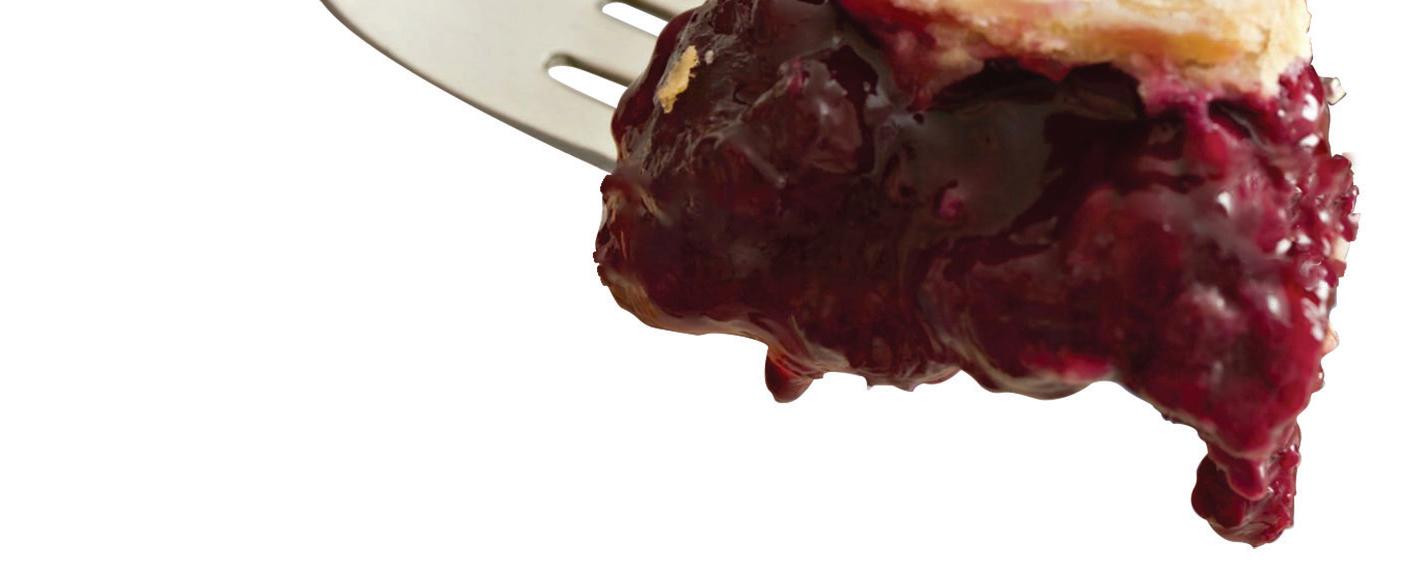

NETWORK WITH OUR COMMERCIAL ENTRANTS THROUGH A CUSTOMIZED EVENTSPONSORSHIP.
Troubleshooting Innovation
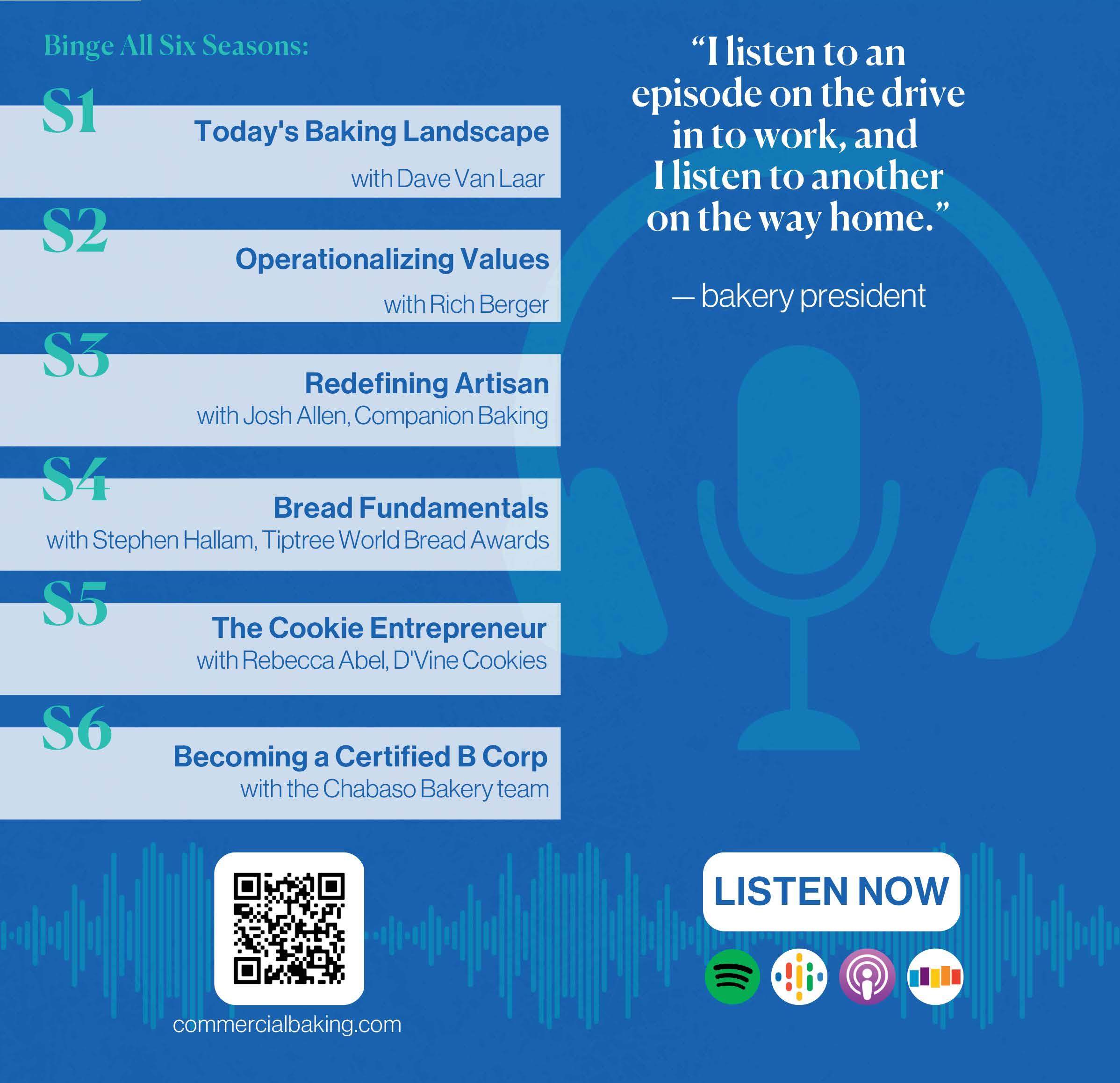

() Tune InTo
Commercial Baking Channel



Our multimedia collection is full of videos, podcast episodes and more, where you can get a deep look — and listen — into the exciting shifts happening in the baking industry.
TechTalk with Craig Souser, JLS Automation
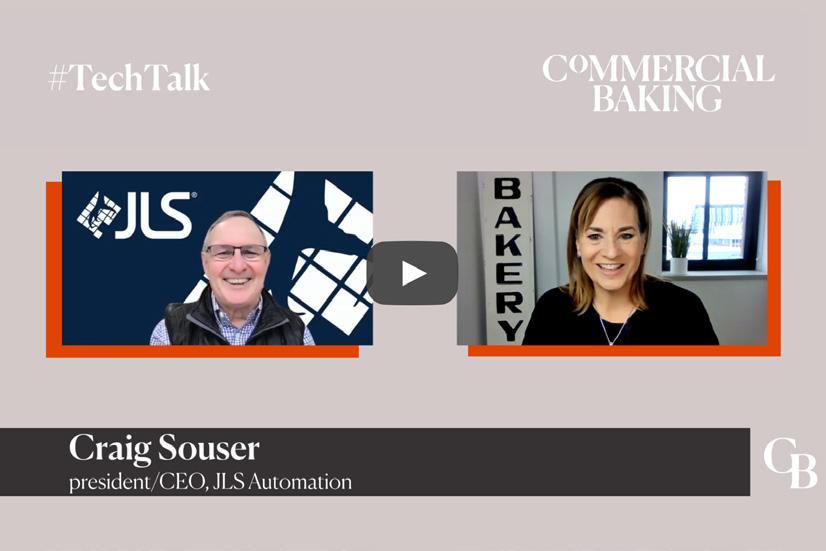
Tune in as Joanie Spencer speaks with Craig Souser, president and CEO of JLS Automation, about the use of artificial intelligence and 3D vision technology for bakery processing and packaging. www.jlsautomation.com
TechTalk with Bob Frassenei, Sacmi
Watch Bob Frassenei, Sacmi’s senior area manager for North America, speak about bakery manufacturers today and the challenges they face, from labor and supply chain shortages to meeting sustainability and innovation goals. www.sacmi.com
TechTalk with Sascha Weiss, Perfect Day
Joanie Spencer talks with Sascha Weiss, research and commercialization chef for Perfect Day Foods. In this TechTalk, they discuss the most recent challenges with egg procurement, along with the functionality and benefits of Perfect Day’s bakery egg replacer. www.perfectday.com
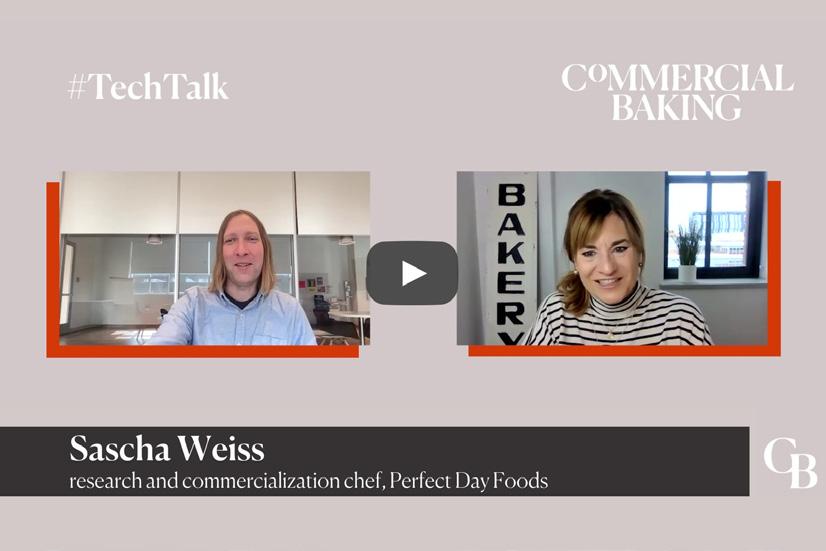

COMMERCIAL BAKING 103
COMMERCIAL BAKING CHANNEL
TechTalk with Clint Adams, Babbco



In this TechTalk, Joanie Spencer, editor-in-chief of Commercial Baking , talks with Clint Adams, VP of sales and marketing for Babbco Tunnel Ovens, about the benefits of baking with impingement heat transfer technology. www.tunnelovens.com
A Day at Mel-O-Cream Donuts International
Commercial Baking visits family-owned Mel-OCream Donuts International in Springfield, IL, for a tour of the bakery floor. Get a behind-thescenes look at what it takes for this donut production to run.

BE AGILE
A unique oven for a changing world
Flexibility, advanced industrial performance and product quality. The M-TA oven has everything covered to give you that competitive edge. It can produce an almost infinite variety of bakery and pastry products in a market that is constantly growing and evolving.
Contact us at info@mecatherm.fr
Make your industrial bakery simpler

COMMERCIAL BAKING CHANNEL
Troubleshooting Innovation Season 6



Joanie Spencer, editor-in-chief of Commercial Baking , visits with various members of the team at New Haven, CT-based Chabaso Bakery about their journey to becoming a Certified B Corporation.
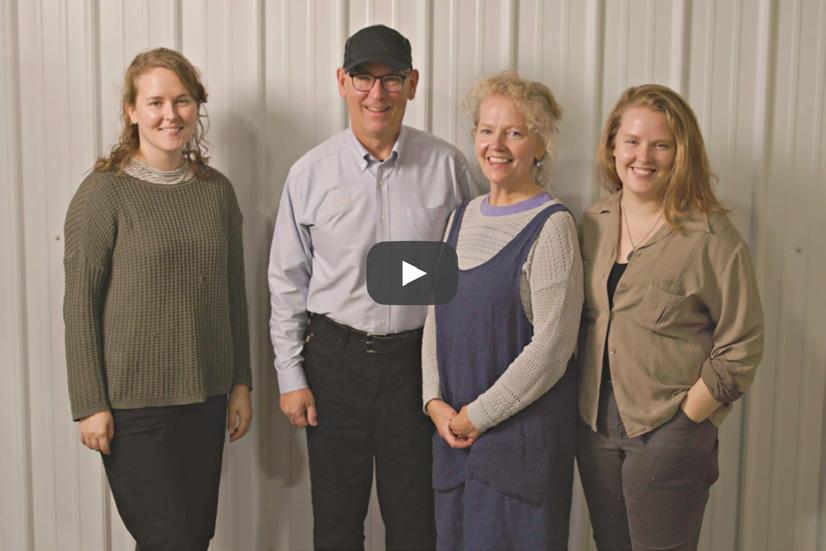
Sponsored by JLS Automation.
Maine Crisp: How it was built into a better-for-you cracker brand








Founder Karen Getz shares the founding principles which created the brand that offers clean label formulas and premium flavors all from the superfood ingredient buckwheat.



For show information: Messe Düsseldorf North America Tel. (312) 781-5180 _ info@mdna.com www.mdna.com

For hotel and travel arrangements: TTI Travel, Inc. Tel. (866) 674-3476 _ info@ttitravel.net



App to drive quality manufacturing
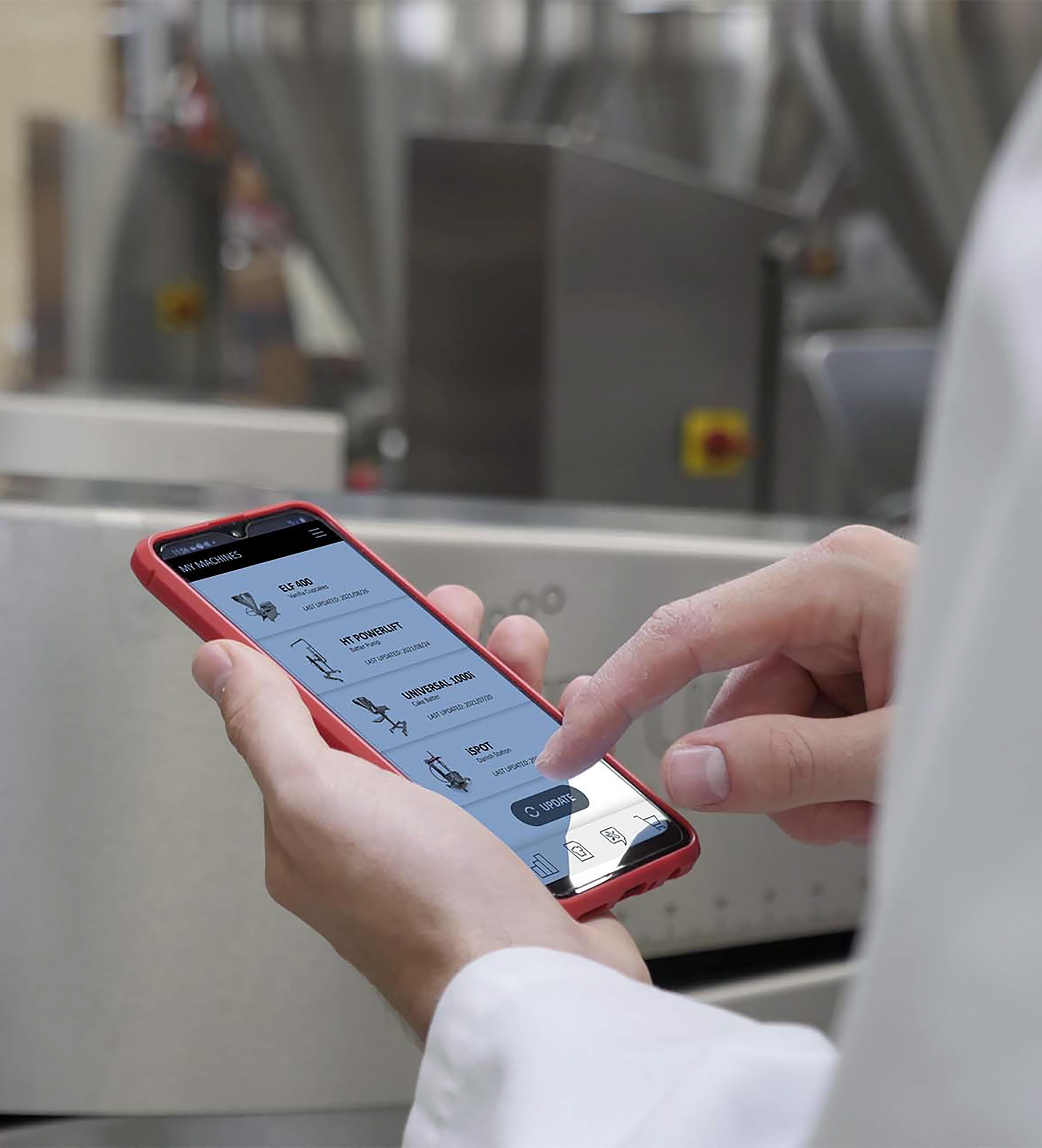
FEBRUARY 2023 Q1 106 Solutions
Unifiller’s Total Care app lets manufacturers connect to their Unifiller equipment to easily drive quality manufacturing. Total Care empowers frontline operators to troubleshoot problems, and train and share knowledge while reducing downtime and optimizing performance. www.unifiller.com/total-care-by-unifiller
Cobot with increased payload
Apex’s industrial cobot, the Baker-Bot MAX, boasts double the payload of the Baker-Bot 10 cobot. Designed with greater reach, the user-friendly industrial cobot can handle applications just outside the threshold of other Baker-Bot models. www.apexmotion.com/baker-bot
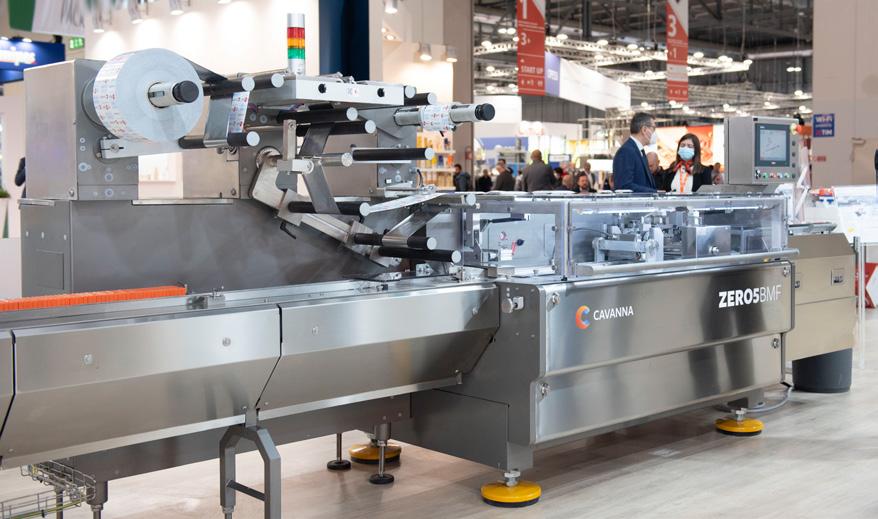
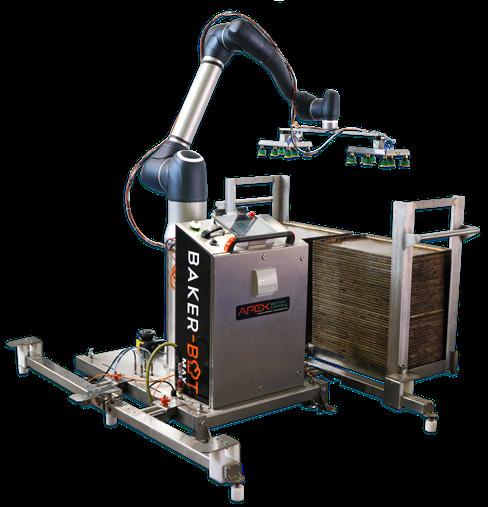
Shelf life extender
AB Mauri designed BakeGard VP to optimize baked goods’ shelf life. It offers functional replacement for calcium propionate solutions and cultured wheat and starch. Locally and ethically sourced, BakeGard VP is also free of propionic acid. It inhibits a spectrum of molds and rope in yeast-raised and some chemically leavened applications such as tortillas. www.abmna.com
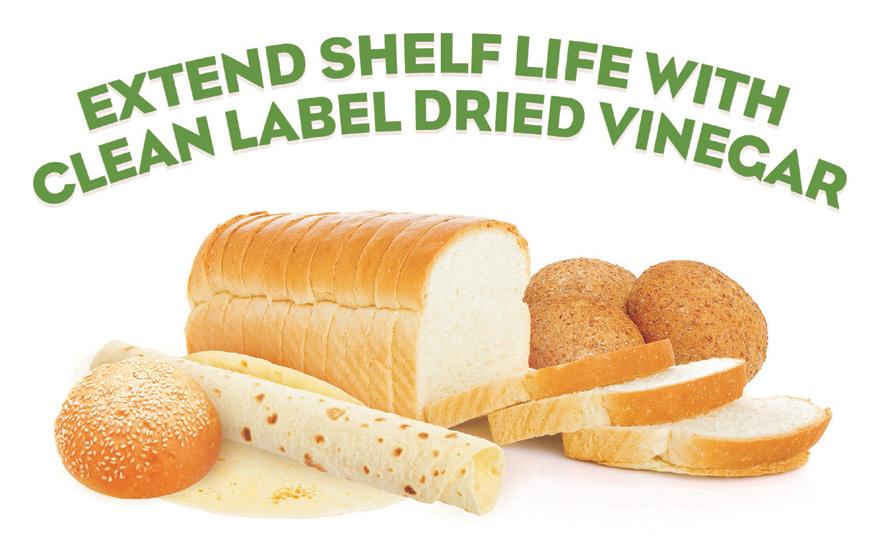
All-purpose metering feeder
Brabender offers its FlexWall Plus loss-in-weight feeder as an all-purpose metering feeder. Suitable for nearly every type of bulk material, the feeder ensures consistent screw fill levels and proper mass flow thanks to its paddle-massaged flexible hopper. Its patented trapezoidal shape positions bulk material at the optimum flow angle to feed the screw and performs well in continuous or batch applications. www.brabenderti.com
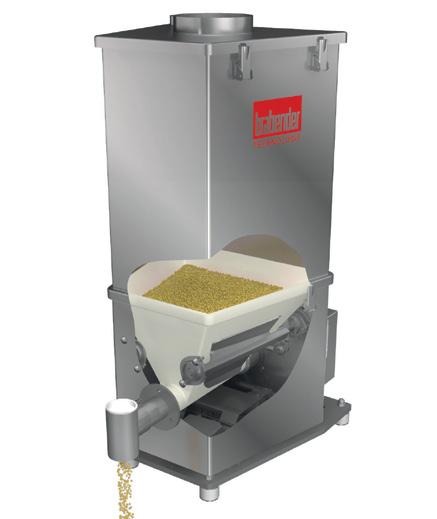
High-performance flowwrapping
Cavanna designed the ZERO5BMF with ‘BoxMotion’ film sealing technology. The high-performance flowpack wrapping machine can reach speeds higher than 300 pieces per minute. Designed to package products that require very high airtightness, the ZERO5BMF works well with thick films that require a longer sealing time. www.cavanna-usa.com
COMMERCIAL BAKING 107
SUPPLIER SOLUTIONS
Multi-shaft mixers
Ross’ VersaMix Multi-Shaft mixers process medium- to highviscosity applications such as thick slurries, pastes, gels and suspensions. They include a custom combination of three agitators driven by a 60 HP TEFC inverter-duty motor. The three-wing anchor and two screw augers are independently controlled with variable speeds to ensure efficient turnover. www.mixers.com

Precise depositing technology









Handtmann’s new depositing technology offers high-speed, precise dosing of smooth and chunky fillings for pocket products. It eliminates mechanical action that requires safety housing and the adjustments and repairs associated with traditional d epositing valves. Bakers can minimize waste with gram-accurate, continuous and spot-deposited portions onto lamination lines at up to 200 cycles per minute. www.handtmann.us

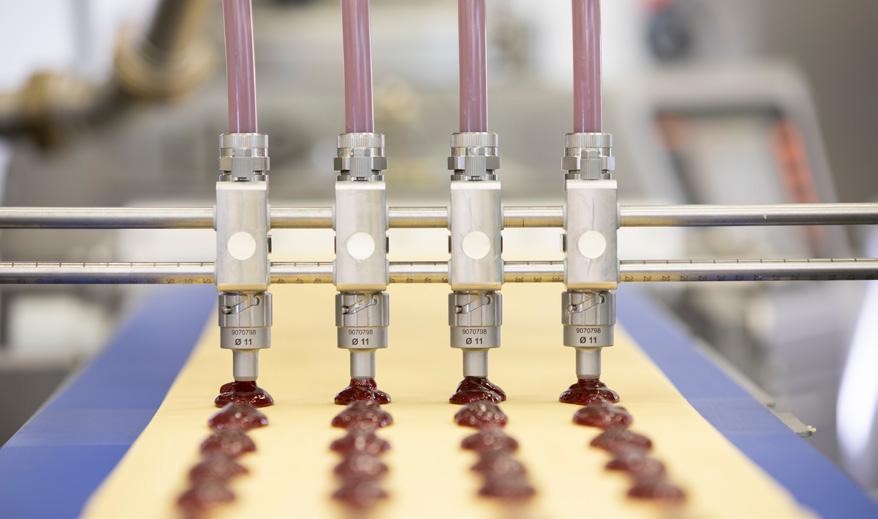
Baker-
The Baker-Bot
The Baker-Bot
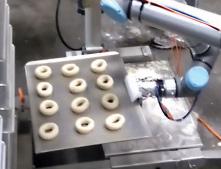
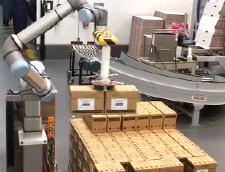
Baker-




Does the dull, dangerous & dirty job
Does the dull, dangerous & dirty job
Shows up ready to work everyday
Shows up ready to work everyday
Safe and friendly — no guarding
Safe and friendly — no guarding
Easy to use and setup
Easy to use and setup

ONE MACHINE - MANY APPLICATIONS ROBOTICS & AUTOMATION FOR BAKERY & FOOD apexmotion.com | 1-778-298-8292
Automation Plan. One piece of equipment that can be used for many applications, but also helps with
injuries
brainer!
info@apexmotion.com Versatility is Key to your
labor shortages, repetitive stress
and production demands, it’s no
SUPPLIER SOLUTIONS ONE MACHINE - MANY APPLICATIONS ROBOTICS & AUTOMATION FOR BAKERY & FOOD apexmotion.com | 1-778-298-8292 info@apexmotion.com
Versatility is Key to your Automation Plan. One piece of equipment that can be used for many applications, but also helps with labor shortages, repetitive stress injuries and production demands, it’s no brainer!
Patented dough twisting unit



Fritsch, a partner of Multivac, released an all-new patented Dough Twisting Unit. The unit allows for automated twisting of rolls and bread products within Fritsch’s industrial IMPRESSA bread line. With this solution, bakery manufacturers can create artisanal twisted breads with dough pieces up to 6 oz. www.fritsch-group.com
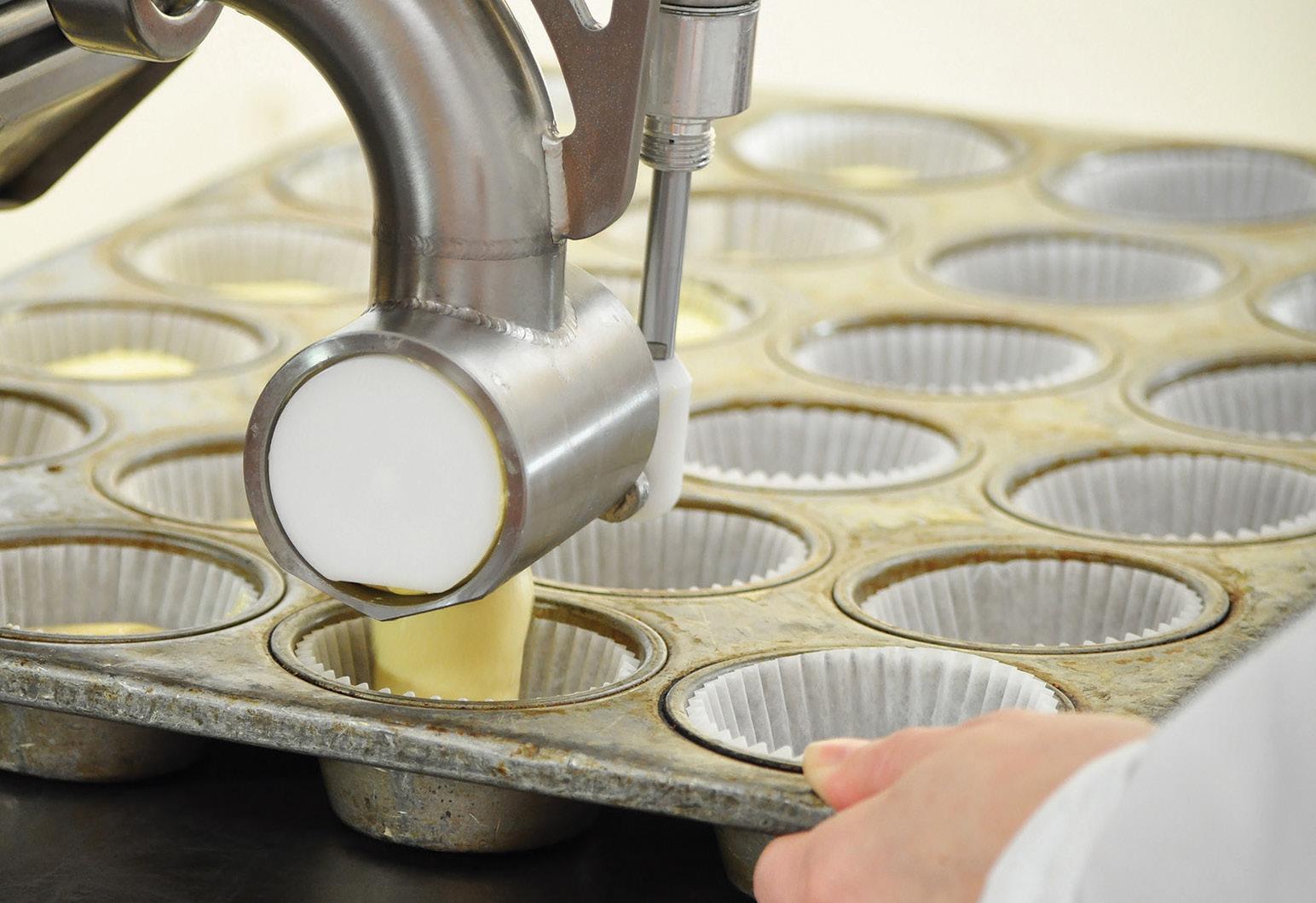

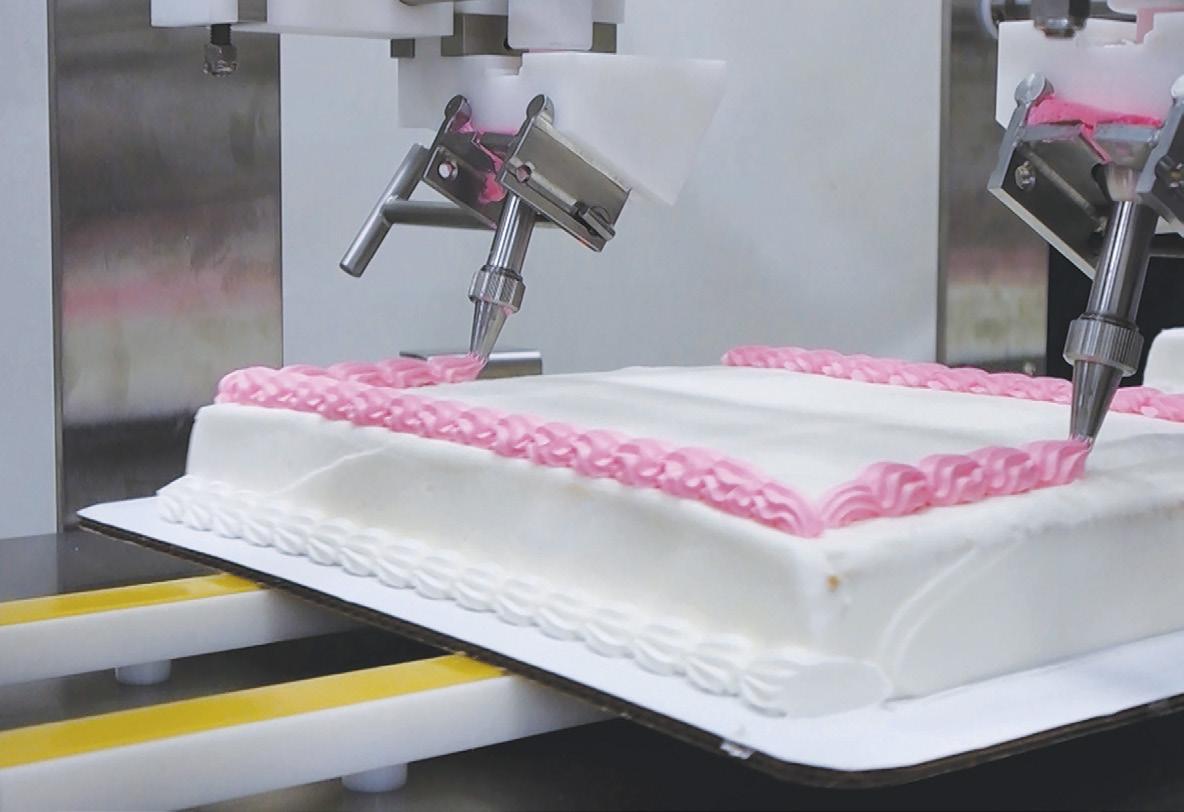
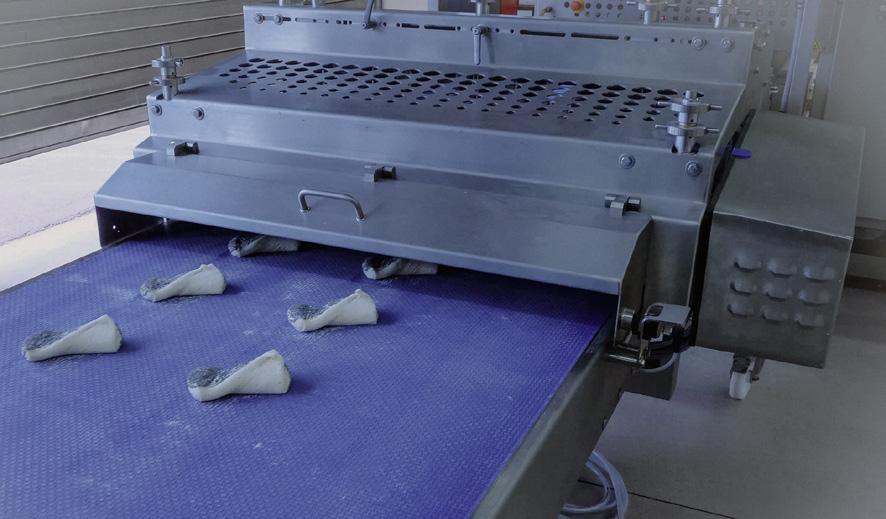
Food-grade valve connection













MoistTech’s Food Grade Sanitary Valve Connection allows for the instant measurement of moisture through a pipeline by seamlessly installing within the existing pipe. It’s designed to adapt to the process pipeline conveyed material, allowing the material to flow directly against the NIR detector without wasting or c ontaminating product. www.moisttech.com

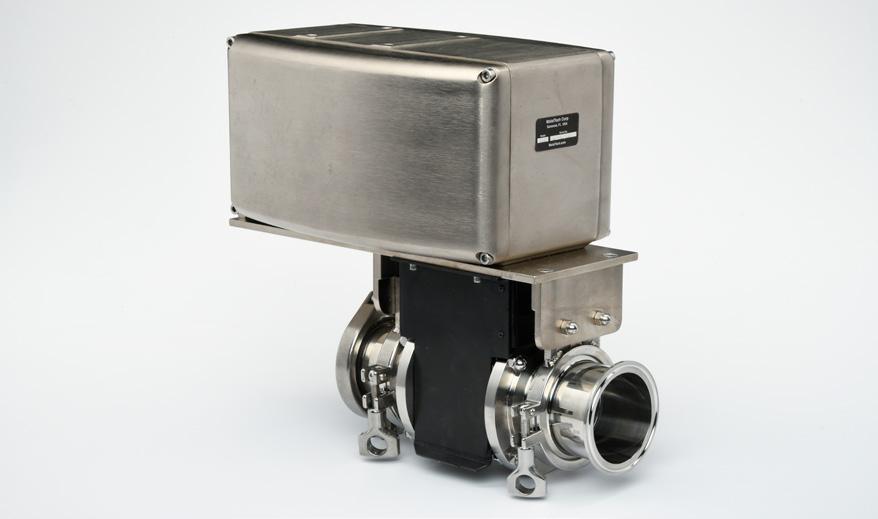
www.unifiller.com 1 888 733 8444 We
More
design and manufacture processing and portioning equipment to bakeries and food plants worldwide.
SAVINGS. Less DOWNTIME.
SUPPLIER SOLUTIONS

Multi-nozzle rotating die
Reading Bakery Systems has designed an 18-nozzle rotating die for increased throughput capacity. The die continuously extrudes a spiral-shaped rope of dough for twisted pretzel and stick products. Rotations and execution speed can be controlled independently for an array of shapes and textures. The die uses a food-grade semi-solid lubricant instead of gear oil to reduce potential product contamination. www.readingbakery.com
High-speed bar portioner
Reiser maximizes the production of bar lines with the high-speed Vemag MMP223 bar portioner. It cuts extruded bar products into exact-weight portions while virtually eliminating giveaway. The Vemag Portioner extrudes a continuous flow of shaped product onto a conveyor belt for transport to the MMP223. Its cutting blade provides very clean cuts through inclusions. www.reiser.com
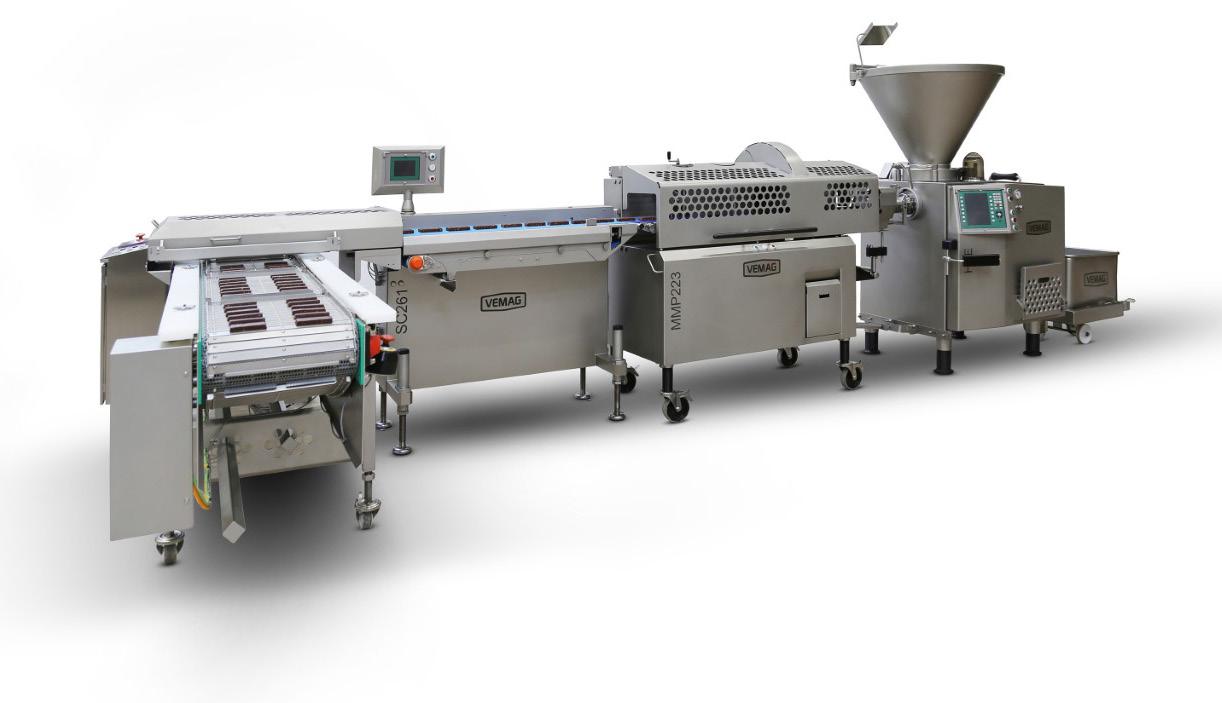
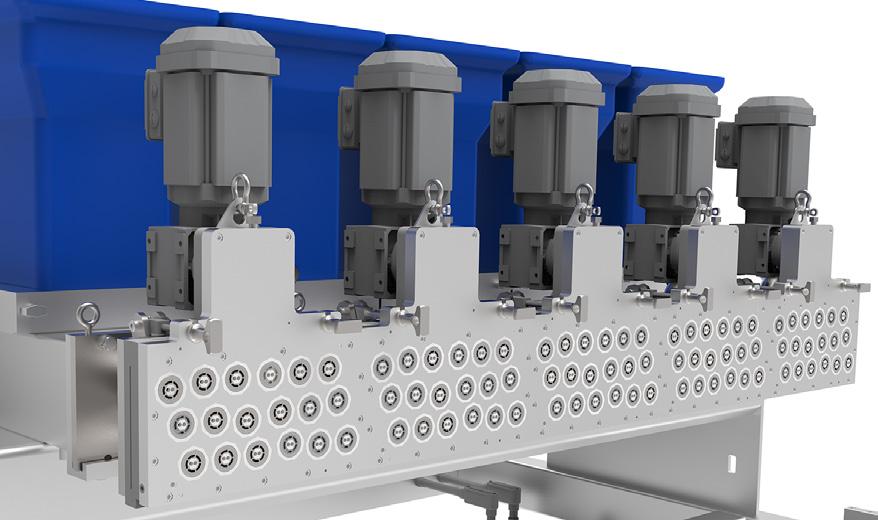
WImperial Industries has 42 years of experience designing and fabricating industrial bulk storage tanks and silos for many applications. We are an industry leader in dry bulk and liquid storage serving many different markets.



Cereals: Whole and processed grains, sugar, additives, and by-products
Bakery: Flour, sugar, spices, salt, oils, additives, and other ingredients
Milling: Raw grains, flours, and by-products

Esalesinfo@imperialind com www.imperialind.com 1-800-558-2945 Contact Us:
Paper-based flowwrapping
Sacmi’s easy-to-use horizontal flowpack machine series JT ADVANCE, produced and marketed under the OPM brand, is designed to cover high-speed productions with a special focus on total cost of ownership. Extensive configurability makes it a viable solution for items that require high output rates. The flowwrapper can reach up to 1,500 single pieces per minute focused on handling paper-based wrapping material. www.sacmi.com
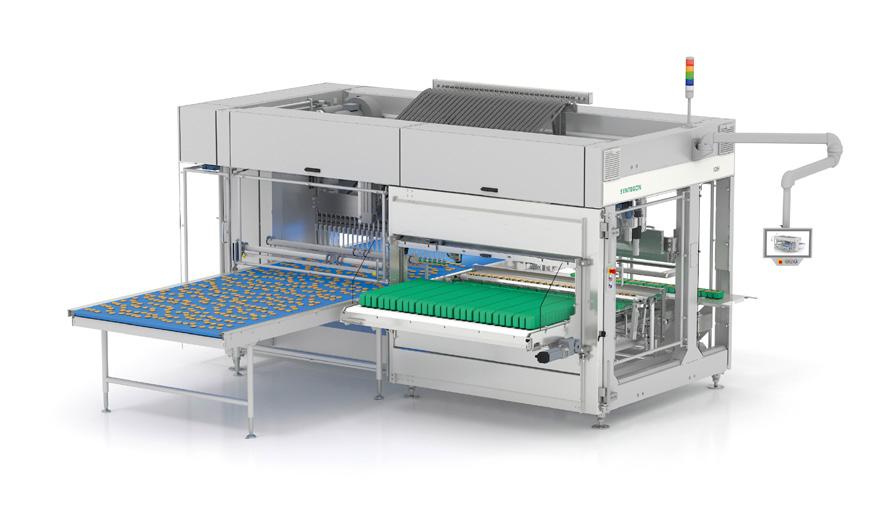
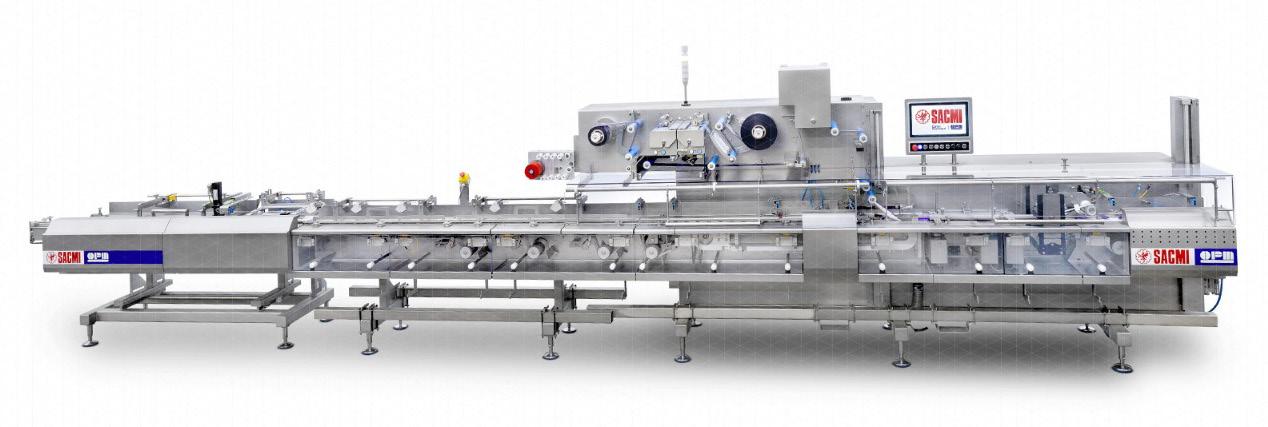
Direct handling system for cookies /crackers


Syntegon presents a new intelligent direct handling system (IDH) solution for cookies and crackers. IDH uses linear motor technology for gentle product placing. With its ability to perform seamless changeover between a variety of product shapes and styles, the machine is further enhanced when attached to a Syntegon future-proof horizontal flowwrapper. www.syntegon.com
Automate Moisture & Oil Measurement in Food Production

CONSTANT MONITORING ADJUSTMENTS MADE EASY
CONSTANT MONITORING ADJUSTMENTS MADE EASY
Allows for a constant, non-contact solution to moisture and oil measurement directly on the production line in real time
Allows for a constant, non-contact solution to moisture and oil measurement directly on the production line in real time
Operational personnel are able to make crucial, immediate adjustments on the line to avoid waste and downtime
Operational personnel are able to make crucial, immediate adjustments on the line to avoid waste and downtime
CLOSED LOOP
CLOSED LOOP
Measuring moisture directly on the production line produces instant, accurate data that can be easily communicated to a PLC -creating a closed loop process
Measuring moisture directly on the production line produces instant, accurate data that can be easily communicated to a PLC - creating a closed loop process

IMMEDIATE IMPROVEMENTS
IMMEDIATE IMPROVEMENTS
A MoistTech system provides improved product quality, lower waste and energy costs, process optimization, increased plant efficiency, oven control & reduced downtime
A MoistTech system provides improved product quality, lower waste and energy costs, process optimization, increased plant efficiency, oven control & reduced downtime



NOMADIC 24
EXPERIENCE THE BENEFITS OF NIR MOISTURE CONTROL DIRECTLY ON THE PRODUCTION LINE! info@moisttech.com / www.moisttech.com +1 941-727-1800 / +44 1138680413
NOMADIC 24
Automate Moisture & Oil Measurement in Food Production EXPERIENCE THE BENEFITS OF NIR MOISTURE CONTROL DIRECTLY ON THE PRODUCTION LINE! info@moisttech.com / www.moisttech.com +1 941-727-1800 / +44 1138680413
The following advertisers appear in this issue. We encourage readers to reach out to these companies through the listed website or email for further information. This index is provided as a service to readers and advertisers, but Commercial Baking does not assume any liability for errors or omissions. Please send any updates or corrections to info@commercialbaking.com


112 SUBSCRIBE Fresh insights on trends and innovations www.commercialbaking.com/subscription Ad Index AB Mauri 53 www.abmna.com customerservice.abmauri@abmauri.com American Bakers Association 96 www.americanbakers.org info@americanbakers.org American Pie Council 10 1 www.piecouncil.com weloveallpie@gmail.com AMF Bakery Systems 27, 58 www.amfbakery.com sales@amfbakery.com Apex Motion Control 10 8 www.apexmotion.com info@apexmotion.com Ardent Mills 4 1 www.ardentmills.com info@ardentmills.com Avant Food Media 8 1 www.avantfoodmedia.com info@avantfoodmedia.com AZO 95 www.azo-inc.com info-azo-usa@azo.com BC Williams 39 www.bcwilliams.com info@bcwilliams.com Bettendorf Stanford 61 www.bettendorfstanford.com jatkins@bettendorfstanford.com BluePrint Automation 66 www.blueprintautomation.com sales@blueprintautomation.com Brabender Technologie 71 www.brabenderti.com golmes@brabenderti.com Brolite 50 www.bakewithbrolite.com s.delghingaro@broliteproducts.com Bundy Baking Solutions 13 www.bundybakingsolutions.com info@bundybakingsolutions.com Cain Food Industries 115 www.cainfood.com sales@cainfood.com Capway Automation 16-17 www.capwayautomation.com sales@capwayusa.com Cavanna Group 8 2 www.cavanna.com sales@cavannagroup.com Charles Ross & Son Company 33 www.mixers.com mail@mixers.com Commercial Baking 10 2 www.commercialbaking.com info@commercialbaking.com Corbion 116 www.corbion.com foodus@corbion.com Farmer Direct Foods 7 www.farmerdirectfoods.com sales@farmerdirectfoods.com Food2Multimedia 99 www.foodmultimedia.de info@foodmultimedia.de Formost Fuji 7 9 www.formostfuji.com sales@formostfuji.com Fred D. Pfening Co. 4 7 www.pfening.com sales@pfening.com
Print magazines Digital editions Website Newsletters Multimedia FEBRUARY 2023 Q1
Sifting through the noise
Curated for decision makers... Subscribe now.
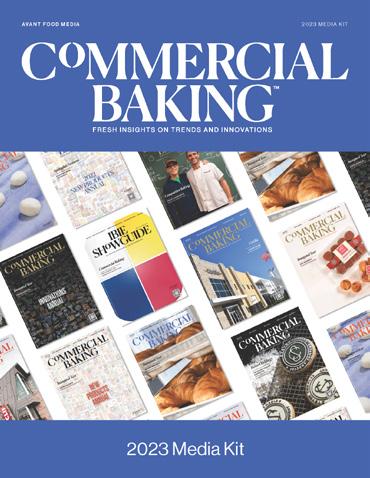


113 ADVERTISE Download the media kit www.commercialbaking.com/adv ertise AD INDEX COMMERCIAL BAKING Handtmann 14 www.handtmann.de/en patrick.mcgady@handtmann.us Harpak-Ulma 69 www.harpak-ulma.com info@harpak-ulma.com Henry & Sons 4 8-49 www.dhenryandsons.com info@dhenryandsons.com Heuft Thermo-Oel GmbH & Co. 93 www.heuft1700.com L.Lubberich@heuft1700.com IJ White 31 www.ijwhite.com pwhite@ijwhite.com Imperial 110 www.imperialind.com morgan@imperialind.com Intralox 5 www.intralox.com customerservice.bakery@intralox.com IPCO 89 www.ipco.com sales.us@ipco.com J&K Ingredients 2 www.jkingredients.com sales@jkingredients.net JLS Automation 45 www.jlsautomation.com sales@jlsautomation.com Kaak 65 www.kaak.com jlaros@kaak.com Lallemand 57 www.lallemand.com baking@lallemand.com Mecatherm 104 www.mecatherm.fr/en info@mecatherm.fr Messe Dusseldorf GmbH 10 5 www.messe-dusseldorf.de ameerboth@mdna.com Middleby Bakery Group 2 9 www.middlebybakery.com nicole.plantenis@middlebybakery.com MoistTech 111 moisttech.com/applications/human-food-moisture info@moisttech.com Multivac/Fritsch 63 us.multivac.com matt.zielsdorf@multivac.com National Honey Board 8 www.honey.com honey@nhb.org Oakes 23 www.oakes.com info@oakes.com Peerless Food Equipment 10 www.peerlessfood.com sales@peerlessfood.com Rademaker 21 www.rademaker.com sales@rademaker.com Reading Bakery Systems 8 7 www.readingbakery.com info@readingbakery.com Reiser 74 www.reiser.com sales@reiser.com Repco 55 www.repcoworld.com/bakery info@repcoworld.com Rondo 25 www.rondo-online.com peter.spinelli@rondo-online.com Sacmi 85 www.sacmi.com bob.frassenei@sacmigroup.com Schubert 73 www.schubert.group sales@schubert-na.com Shaffer 4 www.shaffermixers.com info@shaffermixers.com Shick Esteve 34 -35 www.shickesteve.com info@shickesteve.com Syntegon 3 www.shickesteve.com info@shickesteve.com Unifiller 109 www.unifiller.com info@unifiller.com Zeppelin Systems USA 7 7 zeppelin-systems.com/us/industries/food-industry info@zeppelin-usa.com Paul Lattan paul@avantfoodmedia.com 816.585.5030 Steve Berne steve@avantfoodmedia.com 816.605.5037
It’s time to perform rather than just spend.
Little Company, Big Voice
The Killer Brownie Co. is proof that even smaller companies can still have a big voice.
I read once that if you want to build a brand, you have to make something that is unique, innovative or fills a need. And then it has to matter to people. I knew this brand had the unique and innovative part covered … but had we told enough people about it? How could we even know if it mattered to them?
There was one way to find out.
I realize no two brands are the same. We do things other companies don’t … that’s true for our product, our marketing, our R&D and our team. A dear industry mentor once told me, “You all don’t know what you’re not supposed to be doing, and that is a good thing.”
So, we invested in building a marketing team to tell our brand’s story. Let me tell you, that’s a scary proposition for a small company. Marketing doesn’t have the kind of tangible ROI that a piece of equipment does. In fact, you end up testing, reflecting and then waiting, often unsure of what you’re waiting for. Nevertheless, we took the chance.
Last year, we took our biggest step yet and secured an official partnership with the Cincinnati Bengals.
Partnering with a well-known and well-respected organization like the Bengals fit seamlessly into our strategy of broad brand awareness. Their values aligned perfectly with ours, and it’s also very fun!
It’s taken time, but people now know the Killer Brownie brand in small towns and big cities from coast to coast.
This has opened my eyes to the power of a strong brand message, and that starts with a solid marketing team. The marketing investment has been every bit as important as the equipment, even for a B2B business.
I know that in times of economic challenges, marketing is often the first budget to cut. But we did the opposite. From the start of the pandemic, we pushed the gas pedal on marketing and sales opportunities. And the ROI? Since 2019, it’s paid off in triple-digit growth. CB
Chimene Ross is president and CCO of Dayton, OH-based Killer Brownie Co., a manufacturer of gourmet brownies for foodservice and retail. The company’s vision is to craft delightful brownies not only by flavor and texture, but also through experiences with the Killer Brownie team, its vendors or community partners.

FEBRUARY 2023 Q1 114
THE LAST WORD FROM
CHIMENE ROSS
PURITY REIMAGINED
PureBake® is a modern clean label dough conditioner designed with advanced enzyme technology to give bakers more tolerance in their processing systems.

Functionalpropertiesinclude:

• Unrivaled process tolerance and dough stability
• Eliminates conventional emulsifiers, strengtheners and oxidizers

• A dependable dough conditioner for an ever-changing industry
• PureBake® minimizes your label, not your quality
CAINFOOD.COM INFO@CAINFOOD.COM214.630.4511
Re:
Reclaim Authenticity
Corbion offers the widest portfolio of authentic mold inhibitors that put nature to work. Crafted with proven fermentation and microbiology expertise, our trusted solutions are third-party verified, ensuring bakers create products that stay delicious, fresh and mold-free without depending on unwanted ingredients.

Let’s redefine freshness together.

©2023 Corbion corbion.com foodus@corbion.com CorbionFood






















































































































 BY JOANIE SPENCER
BY JOANIE SPENCER





























































 BY JOANIE SPENCER
BY JOANIE SPENCER































































































































































































































































































































































































































































































































































































 BY CATALINA MIHU, BAKING+BISCUIT
BY CATALINA MIHU, BAKING+BISCUIT
 BY BAKING+BISCUIT STAFF
BY BAKING+BISCUIT STAFF






























































































































